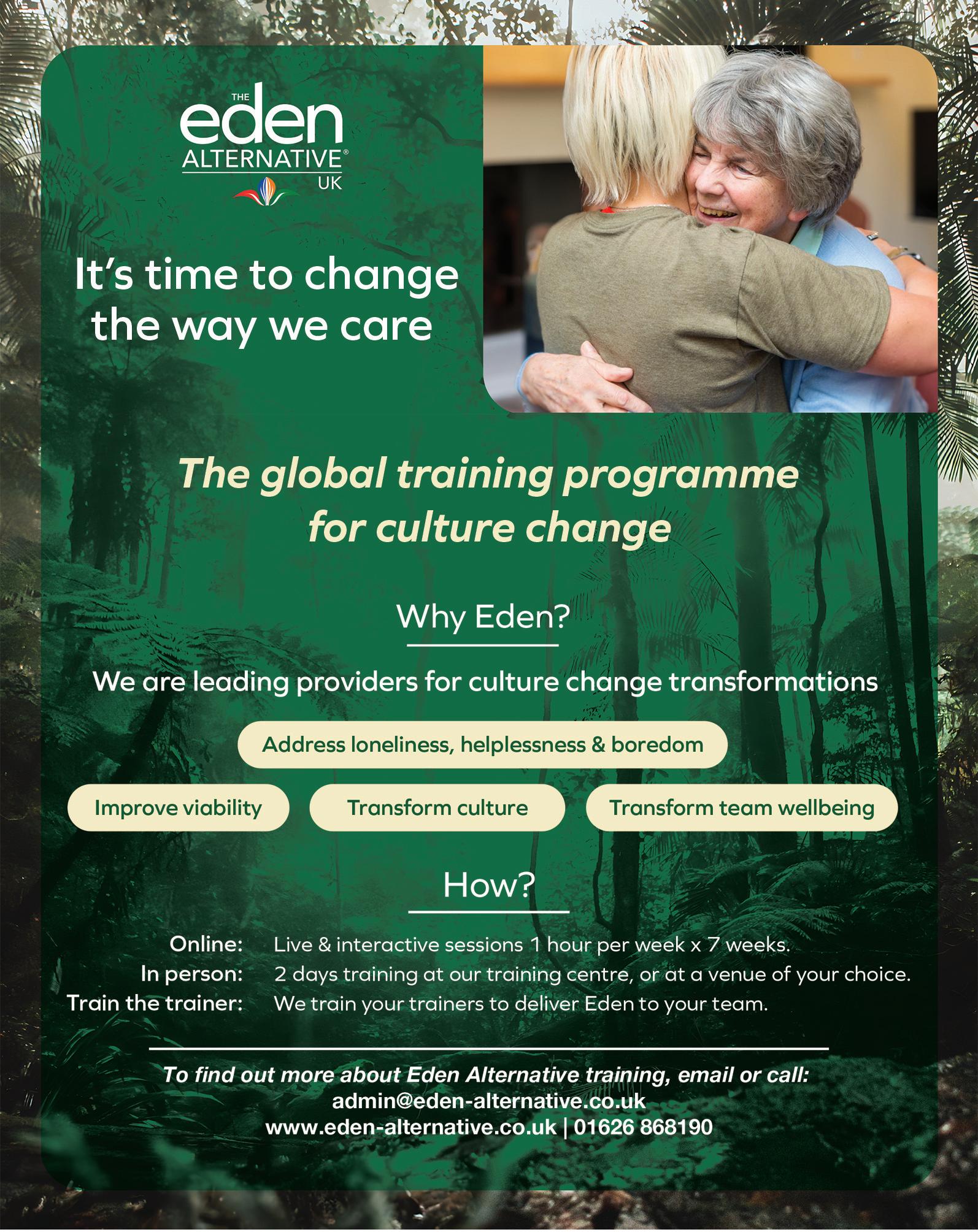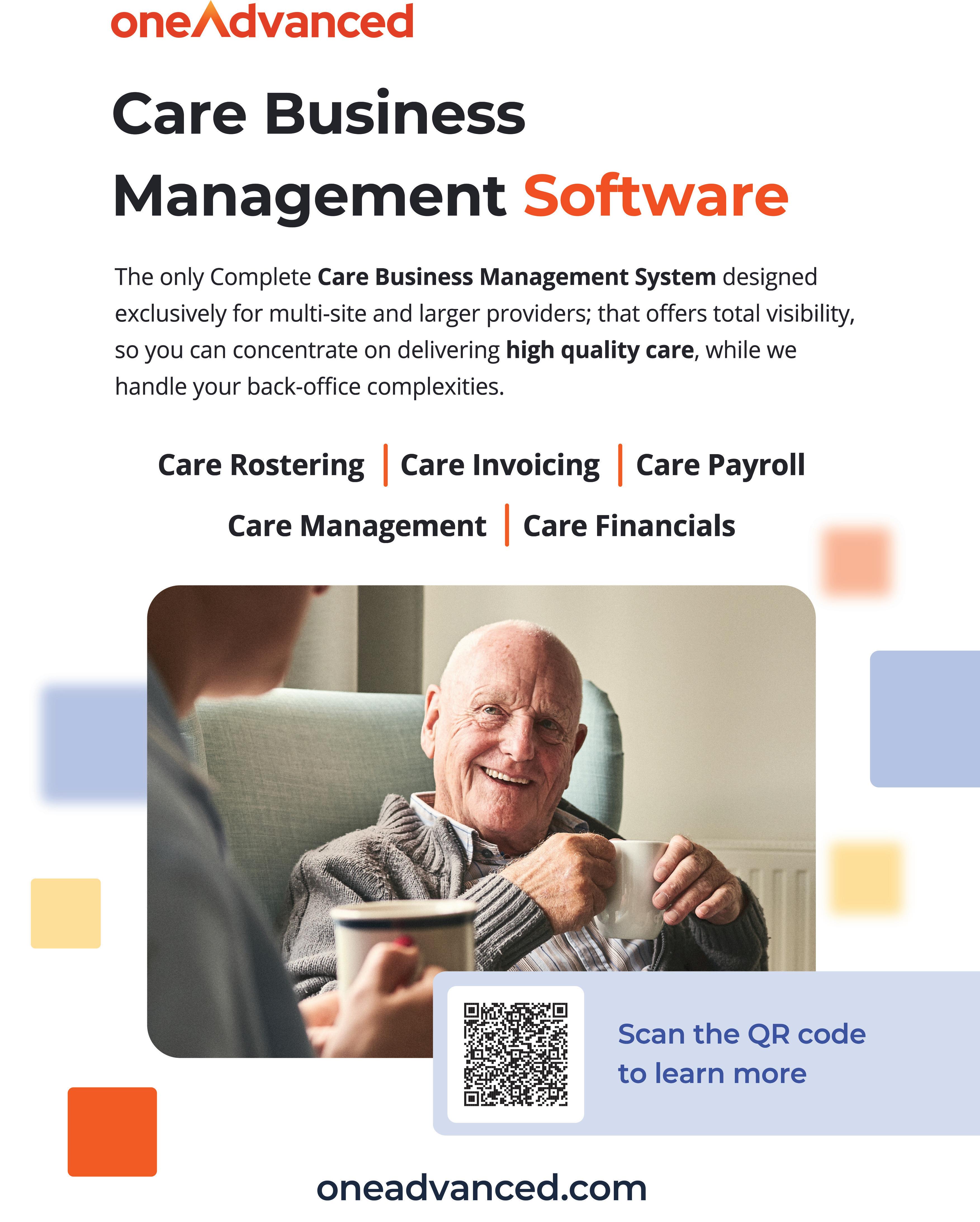

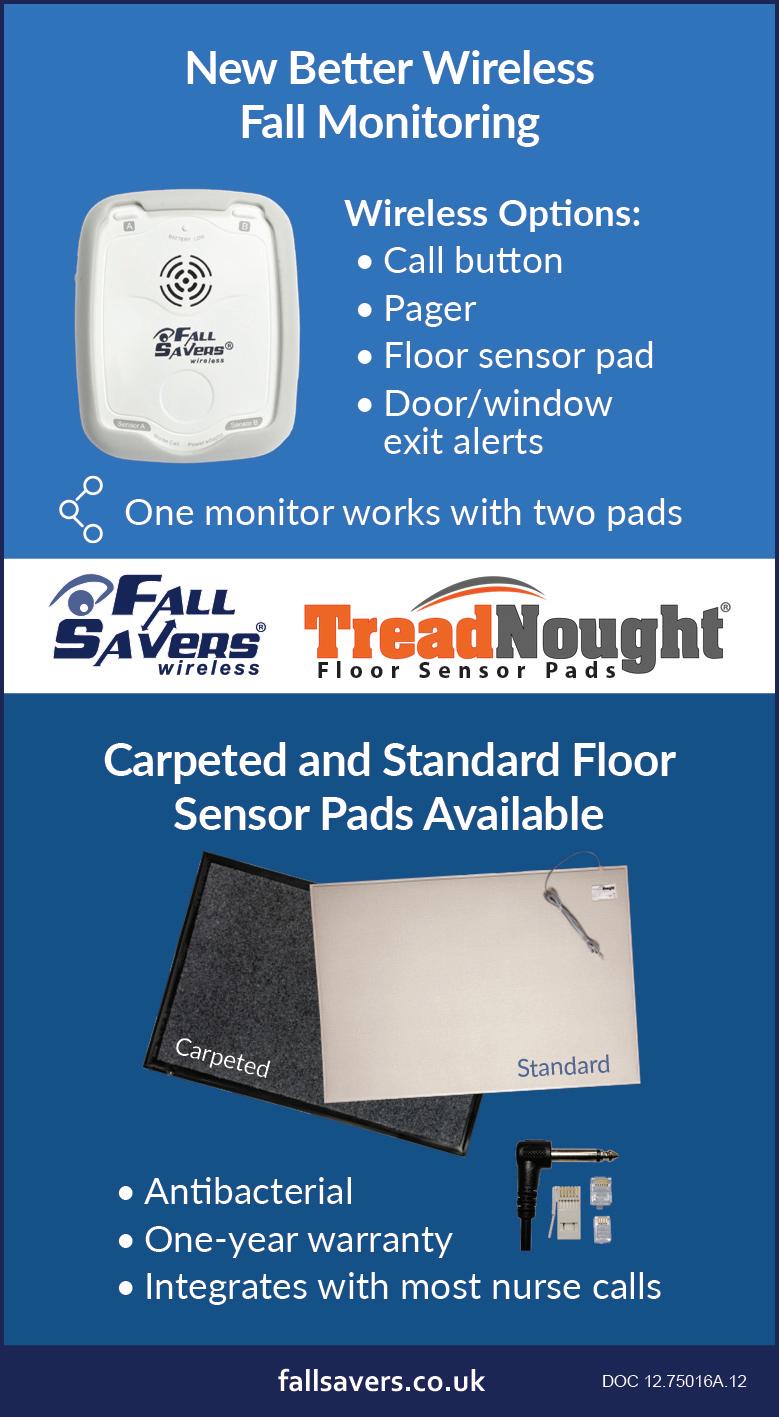













A new Alzheimer’s Society survey reveals that one in five people affected by dementia in the UK receive no health, social, or financial support. The report highlights critical gaps in care and calls for urgent improvements in services and awareness Of those who received support, fewer than half were satisfied with it, with only 29% saying dementia-related health care was easy to access. More than a third of people living with dementia in the UK don’t have an official diagnosis. More than half of those surveyed believe this situation could be improved if increased support from professional carers trained in dementia was available. The report published ahead of World Alzheimer’s Month, Alzheimer’s Society’s Lived Experience Survey captures the voices of almost 3,500 people affected by dementia, made up of those living with the condition, unpaid carers, and loved ones, and lays bare some of the barriers to a diagnosis as just one third report that their experience of the diagnosis process was positive.
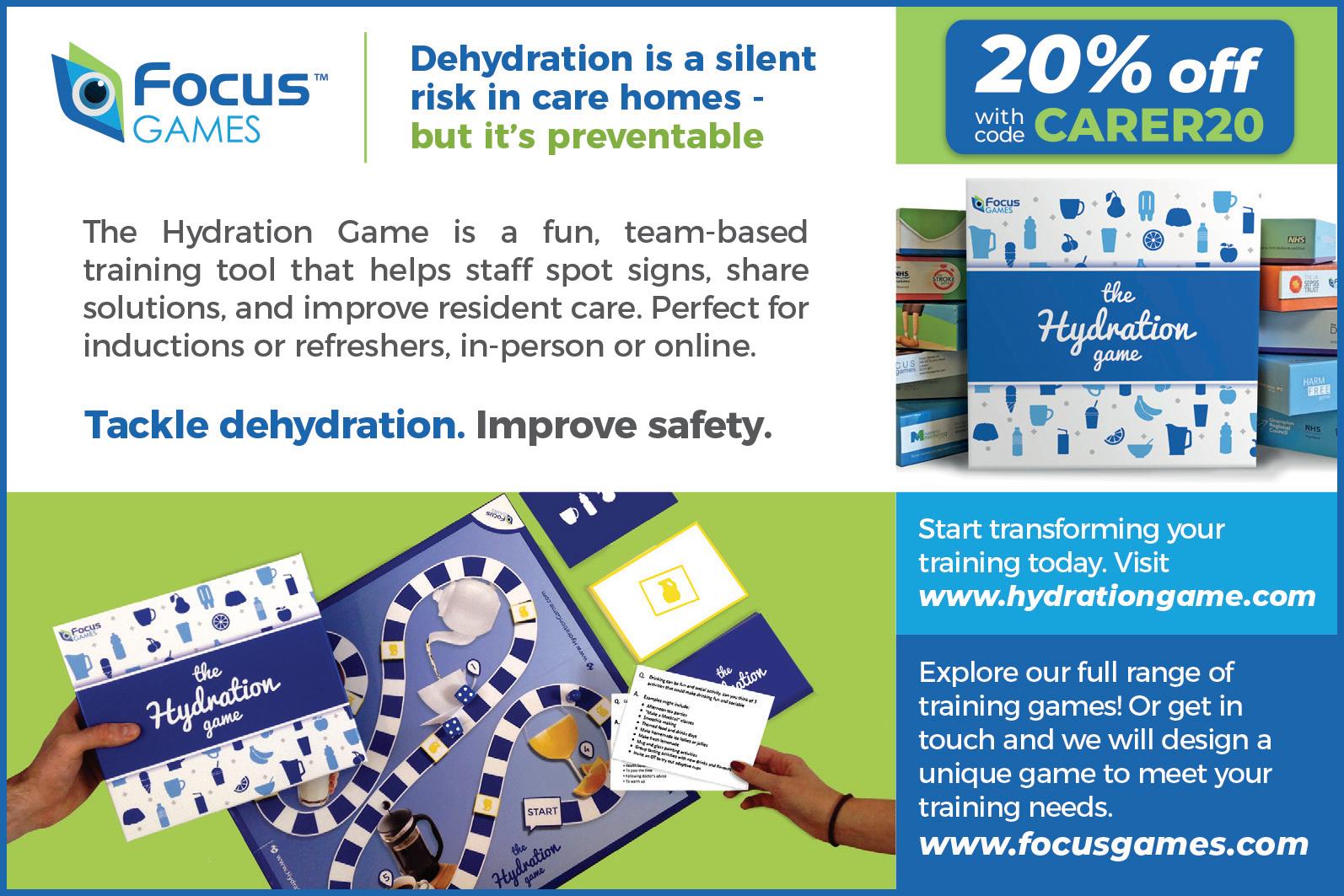
(CONTINUED ON PAGE 3...)
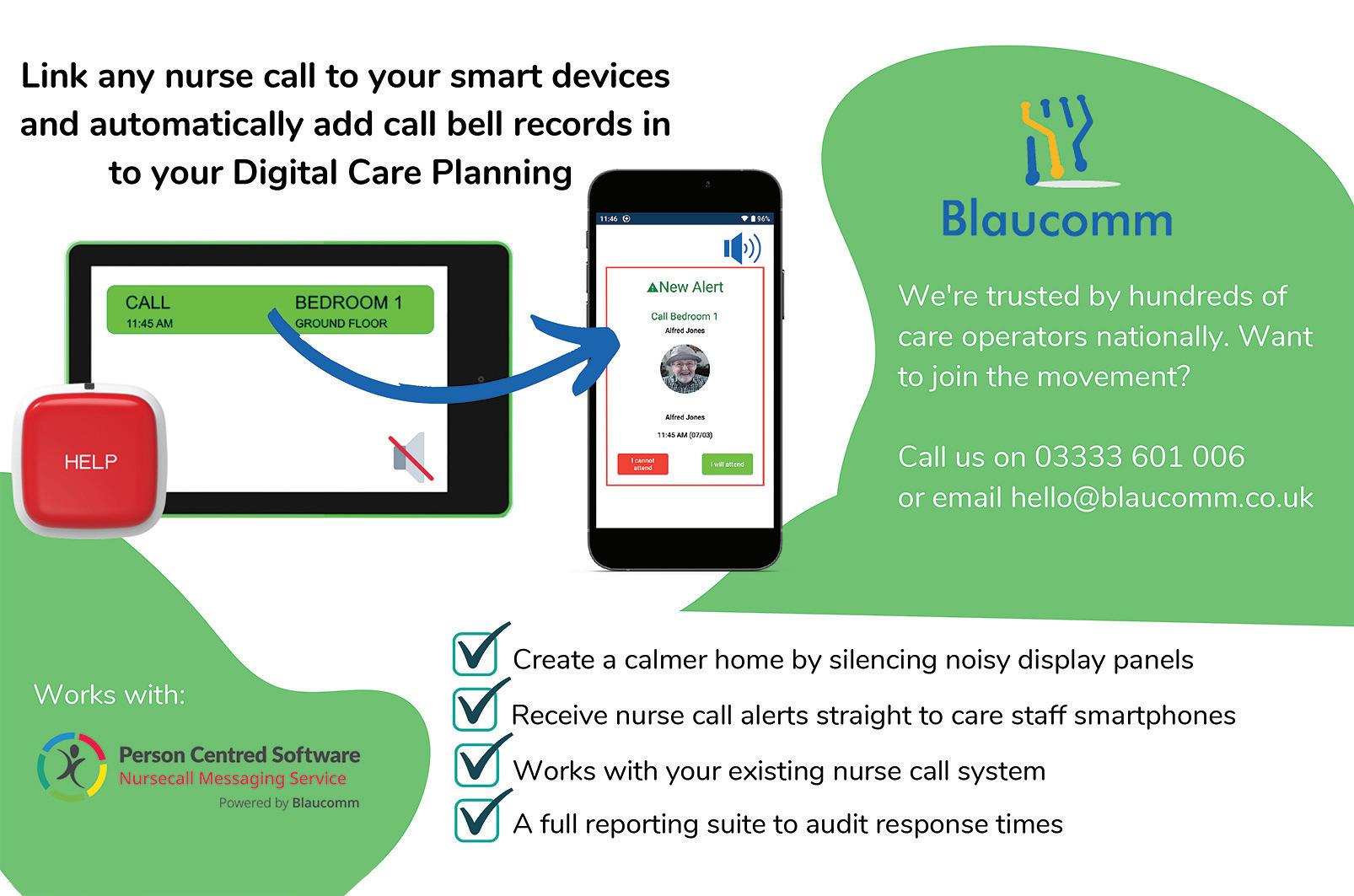
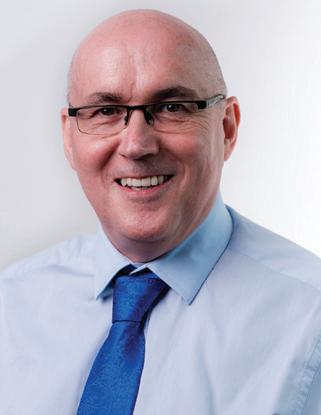
The latest report from the Alzheimer's Society makes for sobering reading.
One in five people affected by dementia receiving no support at all – this statistic alone should shock us all into action, yet for those of us who have worked in this sector for decades, it merely confirms what we've witnessed firsthand.
The report's findings paint a bleak picture of a system buckling under pressure, with serious gaps in diagnosis and care leaving far too many families to cope alone.
Yet there's a refreshing acknowledgement within the data that deserves our attention: where dementia care is provided in care homes, satisfaction levels are being recognised. This offers a glimmer of hope in an otherwise devastating landscape.
This is a heart-breaking topic with little solutions in sight. The cost to the country going forward is often referred to as a "ticking time bomb," and regular readers will know that I often refer to my own mother's rapid onset of Alzheimer's back in the 1980s when the condition was relatively unknown.
I, in my mid-twenties, had no idea of it and its devastating impact. We realised quickly that people with dementia require professional care because it is a progressive condition that increasingly impacts safety, health, and ability to live independently.
My mother needed professional care, and we were lucky back then to find a care home in the immediate vicinity where family and friends could drop in regularly.
Professor Carragher says in our lead story that: "For decades dementia has suffered from a lack of attention and investment. It's been seen as too complex, too expensive, and too hopeless" and this is absolutely right. We here at THE CARER have reported on that very sentiment for the past 20 years, and see no light at the end of the tunnel.
The numbers speak for themselves. In 2024, the Alzheimer's Society reports the cost of dementia in the UK has now reached a staggering £42 billion per year. This figure is set to rise to £90 billion by 2040 unless urgent action is taken. I am not the first to recognise that this is unsustainable, and an issue which should really
be at the top of any government's priorities.
The survey of nearly 3,500 people affected by dementia exposes uncomfortable truths about our healthcare system.
More than a third of people living with dementia don't have an official diagnosis. Of those who do receive support, fewer than half are satisfied with it. Only 29% say dementia-related healthcare is easy to access. These are not just statistics – they represent real families struggling through one of life's most challenging journeys.
Perhaps most troubling is the stigma that still surrounds dementia. Two in five people living with the condition feel ashamed or stigmatised, with many avoiding diagnosis because of concerns about what their families and friends will say. In 2024, this level of societal ignorance is simply unacceptable.
The situation is particularly dire for unpaid carers, with 38% feeling disrespected by healthcare professionals – a figure that rises to 60% among carers from ethnically diverse backgrounds. Seven in ten report that caring has negatively impacted their lives, with over a third experiencing declining mental health and nearly half feeling socially isolated.
Yet within this darkness, there are rays of hope. The report acknowledges that more than half of respondents believe the situation could be improved if increased support from professional carers trained in dementia was available.
This validates what those of us in the care home sector have long known – that professional, specialised care makes a genuine difference to the lives of people living with dementia and their families.
The Alzheimer's Society's call for rapid improvements to dementia diagnosis and support must be heeded. Their Dementia Friends programme represents the kind of societal change we desperately need – tackling stigma head-on and changing public perceptions of the condition.
Going forward we must continue to advocate for better training, increased investment, and above all, a recognition that dementia care is not a burden to be managed, but a responsibility to be embraced with compassion, skill, and dignity.
On a lighter note, thank you to those who shared details of their Afternoon Tea Week celebrations for our competition. We were delighted once again to share your wonderful celebrations – all worthy winners, but unfortunately, we can only pick one. So well done to The Gables Rest Home Kidderminster, Manager Kim and her team for a wonderful winning celebration! (See pages 14-15).
I can always be contacted at editor@thecareruk.com


(CONTINUED FROM FRONT COVER)
A SYSTEM UNDER PRESSURE
Conducted between February and March 2025, the report exposes a dementia care system "buckling under pressure" with serious gaps leaving too many families to cope alone. The findings paint a stark picture:
One in five people affected by dementia have received no health care, social care or financial support
Of those who did receive support, fewer than half were satisfied with it
• Only 29% said dementia-related health care was easy to access
More than a third of people living with dementia don't have an official diagnosis CARE CRISIS
Professor Fiona Carragher, Chief Policy and Research Officer at Alzheimer’s Society, said: “Almost a million people are living with dementia, yet its scale and the day-to-day realities often remain hidden. These findings tell us that far too many people are going without the help they need – whether it’s support after a diagnosis, trained care professionals, or someone to turn to when things get hard.”
“As the UK’s leading dementia charity, we are committed to giving a voice to those who feel unheard, left in the dark and struggling to cope. This report provides the evidence we hope will galvanise society to help solve the UK’s biggest health and care crisis.”
A
Against this backdrop of systemic challenges, dementia care in care homes is applauded.
The report’s findings reveal that structured, professional residential environments provide superior outcomes for people with dementia, with three-fifths (61%) of those who receive care in a care home felt it met all or most of their needs.
This compares to only one third (34%) who were happy with their in-home care providers.
TREATMENT SUCCESS STORIES
The research highlighted positive outcomes in dementia care, with 79% of those receiving pharmacological treatments reporting benefits, and an impressive 85% of those receiving non-pharmacological treatments experiencing positive results.
More than half of respondents believe the situation could be improved if increased support from professional carers trained in dementia was available.
Professor Carragher continued: “An early and accurate diagnosis is vital to enable people living with dementia to access the care, support and treatments they so desperately need. Those who have been able to access these treatments experienced benefits, but we simply aren’t diagnosing people early or accurate-
ly enough to see current and prospective treatments rolled out widely.”
“We are working with governments across the UK to ensure an ambitious diagnosis rate target is implemented, and we are pushing for all care staff to undertake dementia training.”
The report highlights that stigma could be preventing people from accessing support, as two in five people living with dementia feel ashamed or stigmatised. As a result, many have not sought a diagnosis because of concerns about what their families and friends will say if they are diagnosed with the condition.
Experiences vary widely, but some groups face particular challenges. Among unpaid carers, 38% said they don’t feel respected by healthcare professionals – a figure that rises to 60% among carers from ethnically diverse backgrounds.
Seven in ten say that caring has negatively impacted their lives, with over a third reporting a decline in their mental health and nearly half feeling socially isolated. Despite this, many are unaware of the support they’re entitled to – including one in seven who said they didn’t know of any support at all.
Alzheimer’s Society said it will use the findings to inspire governments, local authorities, communities and the public to take action. The charity is also working to improve understanding of dementia amongst the public with its Dementia Friends programme, the biggest ever initiative to change people’s perceptions of the condition and reduce stigma.
“LITTLE SUPPORT”
Anne-Marie Duff, actor and Alzheimer’s Society supporter whose brother Eddie is living with early-onset Alzheimer’s disease, said:
“It’s shocking just how many people still feel isolated and helpless, receiving little support from the social care system.”
“I can absolutely relate, and I encourage anyone who feels the same to join the fight. We must make dementia a priority, for everyone affected by the condition – those living with it, and their families, friends and carers.”
Professor Carragher said Alzheimer’s Society is calling for rapid improvements to dementia diagnosis and support: “For decades dementia has suffered from a lack of attention and investment. It’s been seen as too complex, too expensive, and too hopeless. We’re leading the way by providing the evidence and delivering support to those who need it, but it will take a society to beat dementia. Alzheimer’s Society brings together carers, researchers, volunteers, fundraisers, politicians, Dementia Advisers, and support staff. We all have a role to play in ending the devastation dementia causes.”

Nythan Smith, Principal Associate

Care providers across the UK are under mounting pressure. Restrictions on overseas recruitment have tightened an already fragile workforce pipeline, the promised funding uplift will not arrive until 2028–29, and local authorities remain under severe financial pressure, with adult social care already consuming over 40% of local authority spending.
Many councils facing these financial realities are closing or selling care homes to cope, leaving providers focused on simply keeping services running. In this environment, it’s no surprise that preparing for Care Quality Commission inspections often falls to the bottom of the priority list.
With CQC reforms underway, strengthened by Government backing, inspection preparedness has never been more important.
A SHIFT TOWARDS CONTINUOUS ACCOUNTABILITY
As the regulator moves away from fixed inspection cycles towards a model based on continuous insight and real-time feedback, care homes may find inspectors arriving unannounced, with little or no prior warning. This places greater scrutiny on how providers respond when issues emerge.
The bottom line is that these reforms will usher in significantly greater oversight, and with that, a clear expectation that care homes should demonstrate enhanced accountability between inspections.
RESPONSE OVER PERFECTION
Care is a complex environment where mistakes will happen. Medication errors, complaints, or an isolated interaction that falls short cannot be eliminated. What matters is the leadership response.
Inspectors look closely at three things: how quickly a provider acts, whether the response is robust enough to prevent recurrence, and how effectively the message is communicated both internally and to regulators. Providers who treat each incident as the most important issue in that moment, rather than deflecting or delaying, are those who build credibility.
Readiness is not about flawless records. It is about showing transparency, accountability and resilience when pressure comes.
THE INSPECTION REALITY
There is no one-size-fits all approach to inspection readiness. Anyone who claims otherwise is being disin-
genuous.
Larger providers often appear better equipped, with dedicated quality teams and the capacity to run mock inspections. Yet even with these advantages, issues are still missed. Smaller providers, with fewer resources, are often more exposed, but their intimate knowledge of their homes and services can be a strength in its own right.
Every setting is different. What matters is not a promise of perfection, but the ability to demonstrate readiness through focus, clarity, and a willingness to confront issues head-on. The real differentiator is how a service responds when something goes wrong.
PRACTICAL ACTIONS
Inspection preparedness cannot be a last-minute scramble; it must be embedded in the daily life of a service. That means maintaining accurate and accessible records at all times, ensuring staff feel safe to raise concerns from the outset, and embedding quality improvement as a continuous discipline.
Local authority support can help, but it is no substitute for leadership taking ownership. Responsibility for improvement cannot be outsourced. Clear, documented processes for complaints and incidents matter, but what matters more is being able to demonstrate that those processes are consistently followed in practice.
Several recurring mistakes undermine otherwise strong services. Fewer inspections do not mean reduced scrutiny; concerns raised by data, complaints or external reports can trigger a visit at any time. Generic checklists, often divorced from the real context of a service, create false reassurance and risk exposing gaps.
Withholding context is equally damaging. Giving inspectors the full picture early helps prevent premature conclusions. And in a climate where multiple regulators and authorities may request information simultaneously, providers must have evidence organised and accessible to avoid disruption.
READINESS IS STILL A PROVIDER’S RESPONSIBILITY
Policy constraints - such as the overseas workers ban – along with funding delays and workforce shortages, make inspection readiness more difficult. But they do not remove responsibility. Local authorities can support, but they cannot substitute for provider accountability.
Readiness does not depend on perfect conditions. It depends on professionalism, transparency and resilience in the face of inevitable challenges. The situation may be tough, but providers who embed these qualities will be better placed to demonstrate credibility when the regulator calls.
Ultimately, providers know their services better than anyone else. That knowledge, combined with transparent and accountable responses, is what will stand up under scrutiny.
Paddock Stile Manor Dementia Care Home has shown exceptional community spirit by raising £341 for the Connor Brown Trust, a local charity dedicated to combating knife crime and providing life-saving bleed kits.
The Connor Brown Trust, founded by Simon and Tania Brown after their son Connor tragically lost his life to a knife attack in February 2019, has been working tirelessly to prevent further knife crime deaths. The trust focuses on educating young people about the dangers of knife crime and providing crucial first aid equipment, such as bleed kits. These kits, designed to treat severe blood-loss injuries, can be the difference between life and death in critical situations.
Paddock Stile Manor’s fundraising event, organised by Activities Coordinator Adele, featured a lively raffle, an array of homemade cakes, and refreshing beverages, bringing together colleagues, residents, and the local Houghton-le-Spring community.

Simon Brown shared the trust’s mission with attendees and explained that the £341 raised by Paddock
Stile Manor could fund three smaller bleed kits or help replace essential supplies within the kits, ensuring they remain effective in emergencies.
Simon said, “Although we started raising funds for bleed kits after losing our son to violent crime, they’re for any catastrophic bleed. The more kits we can distribute, the more lives we can save.”
The event also gave Paddock Stile Manor an opportunity to welcome members of their local community, including local nurses, supermarket colleagues, and other key figures from Houghton-le-Spring in attendance. The presentation resonated deeply with everyone, and Home Manager Julie and Deputy Manager Mel were so moved by Simon’s talk that they committed to purchasing a bleed kit for the home and organising fundraising events for the charity at least twice a year.
“We’ve all been incredibly moved by Simon’s talk,” said Julie. “We’re proud to support the Connor Brown Trust and look forward to continuing to raise funds for them in the future.”
In April 2025, the Supporting the Provider Market (STPM) team in County Durham published a new report evaluating the use of pobroll® — a waterproof bed-bathing wrap designed to improve dignity, comfort, and ease during personal care.
This evaluation was carried out across 10 care homes with high numbers of residents living with dementia. Each setting was given one or more pobroll® units and invited to share feedback through a structured survey. The findings reveal how even simple tools can make a significant difference in everyday care.
How was pobroll® used?
Most care homes used pobroll® daily or several times per week, showing it quickly became part of regular practice. Staff noted that one of the biggest challenges was not having enough units — all homes requested additional stock after the trial, highlighting a clear appetite for wider adoption. What did care teams think?
Feedback from the care homes showed strong support for the tool:
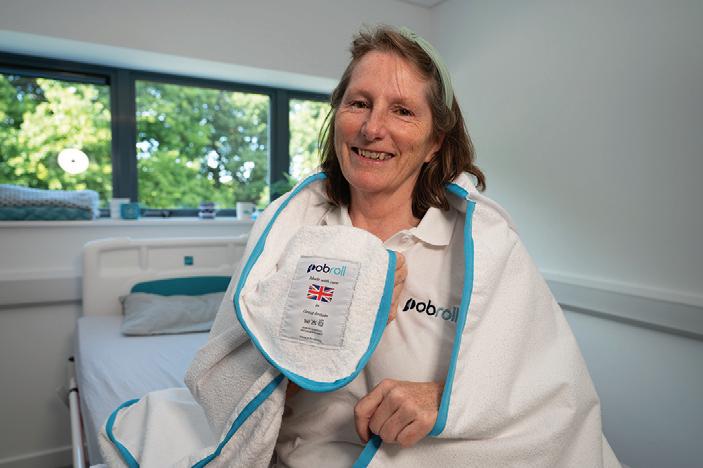
Ease of use was rated highly, with an average score of 4.4 out of 5. Staff found pobroll® straightforward to incorporate into care routines.
Training was rated slightly lower, at 3.8 out of 5, suggesting that while the wrap is easy to use, additional training resources could improve onboarding for new users.
Resident response was positive. Three in ten care homes reported improved mood or behaviour during bed
Written by Pat O’Brien of
bathing for dementia patients.
• Key benefits included greater warmth, coverage, and dignity for residents, especially those who might find conventional methods distressing. Some teams also found it particularly useful for end-of-life care
Would they recommend pobroll® for bed bathing for dementia patients?
Absolutely. Homes rated their likelihood to recommend pobroll® at 4.3 out of 5, with half of respondents giving it a full 5 out of 5. The overall feedback was clear: this is a valued, meaningful addition to personal care.
Would they recommend pobroll® for bed bathing for dementia patients?
The results of this trial reinforce what many professionals already believe — that small, thoughtful design changes can significantly improve care. For residents who are bedbound or living with dementia, personal care can often be a distressing experience. But with the right tools, it doesn’t have to be.
The pobroll® isn’t a complex device. It’s a simple, dual-layered cotton towelling wrap. But its thoughtful design — offering full coverage, comfort, and support — makes a real difference where it matters most. If you’re part of a care home, hospice, or hospital and would like to explore how pobroll® could benefit your residents or service users, get in touch. We’re here to support compassionate, dignified care — one small change at a time.
See the advert on the facing page for details, or visit www.pobroll.co.uk
The UK care sector is grappling with significant recruitment challenges following a sharp decline in work visas issued to overseas healthcare professionals, according to newly released Home Office statistics.
Official data reveals that Health and Care Worker visas granted to international applicants, including dependents, decreased by 77% in the twelve months ending June 2025, falling to just over 20,500 from the previous year’s figure of 89,095.
The impact on nursing recruitment has been particularly severe, with visa approvals for overseas nursing professionals dropping by 80% to 3,080 over the same period. Care workers in personal service roles experienced an even steeper decline, with visa numbers falling by 88% to 7,378.
The dramatic reduction follows a series of policy reforms implemented by the government throughout the year. Care providers seeking to recruit from overseas must now demonstrate they have first attempted to employ candidates already residing in the UK who require visa sponsorship.

Since April, the minimum salary threshold for Skilled Worker visas increased from £23,200 to £25,000 annually (£12.82 per hour), aligning with minimum wage increases. Additionally, new proposals will extend the residency requirement for sponsored care workers from five to ten years before they can apply for indefinite leave to remain.
The government has attributed the nursing visa decline to “the conclusion of the centrally supported international nurse recruitment programme and shifting demand for overseas staff.”
Nuni Jorgensen, from the Migration Observatory at the University of Oxford, said and increase in people smuggling and a “larger numbers of people claiming asylum after arriving on visas” could be partly behind the rise.
“It is hard to know to what extent the repeal of the previous government’s asylum policies has contributed, not least because those policies were never fully implemented and their impact was unclear”, she added.
Weymouth care home residents were treated like their film and music star idols during a special pampering session.
Residents living at Buxton House, on Radipole Lane, were joined by Birmingham-based team, Dementia Friendly Barbers, led by Tom Roberts and Cordelle Cabey. The men are on a mission to provide a dedicated dementia-friendly barber service to care homes across the UK, with Buxton House being the first care home that they have visited in Dorset.
Tom and Cordelle brought retro-themed hair and shaving products, a speaker shaped like an old-fashioned juke box and photos featuring music, sports and film stars from the 1940s, 50s and 60s, to transform the home’s hairdressing salon into a barber’s shop. The hair cutting and beard trimming service was offered to all residents, not just those liv-
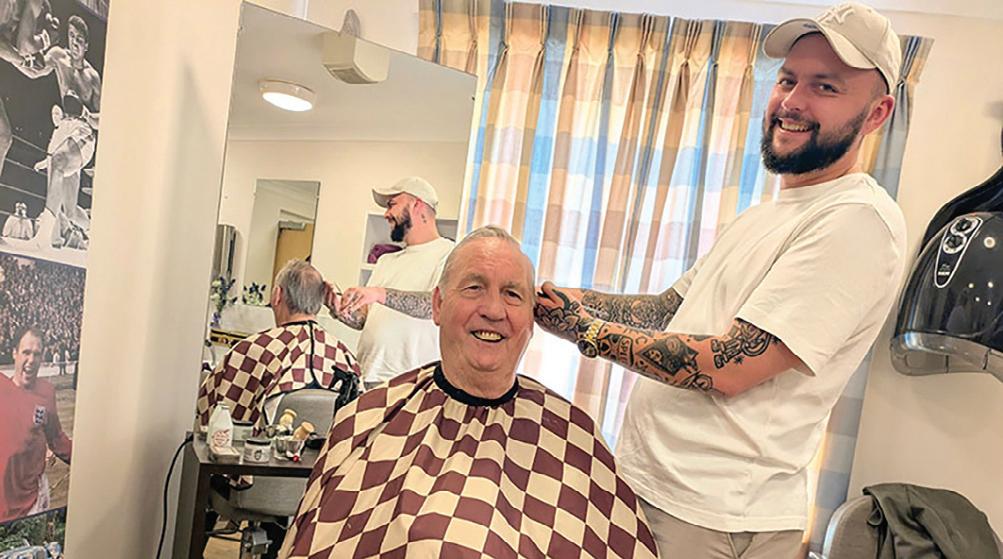
ing with dementia.
The session aimed to spark conversation while sat in the barber’s chair and enabled the residents to reminisce about the music they were listening to during the experience by musicians such as Elvis Presley and Frank Sinatra.
Tom Roberts, founder of the Dementia Friendly Barbers, said: “It was lovely to see the residents’ eyes light up as they shared the stories of their life experiences and their favourite film and music stars. We like to make it a sensory experience with different sights, sounds and smells sparking their memories. We had such a warm welcome from the Buxton House team and it was a privilege to be able to support the residents to feel relaxed, valued and respected as they took a trip down memory lane.”
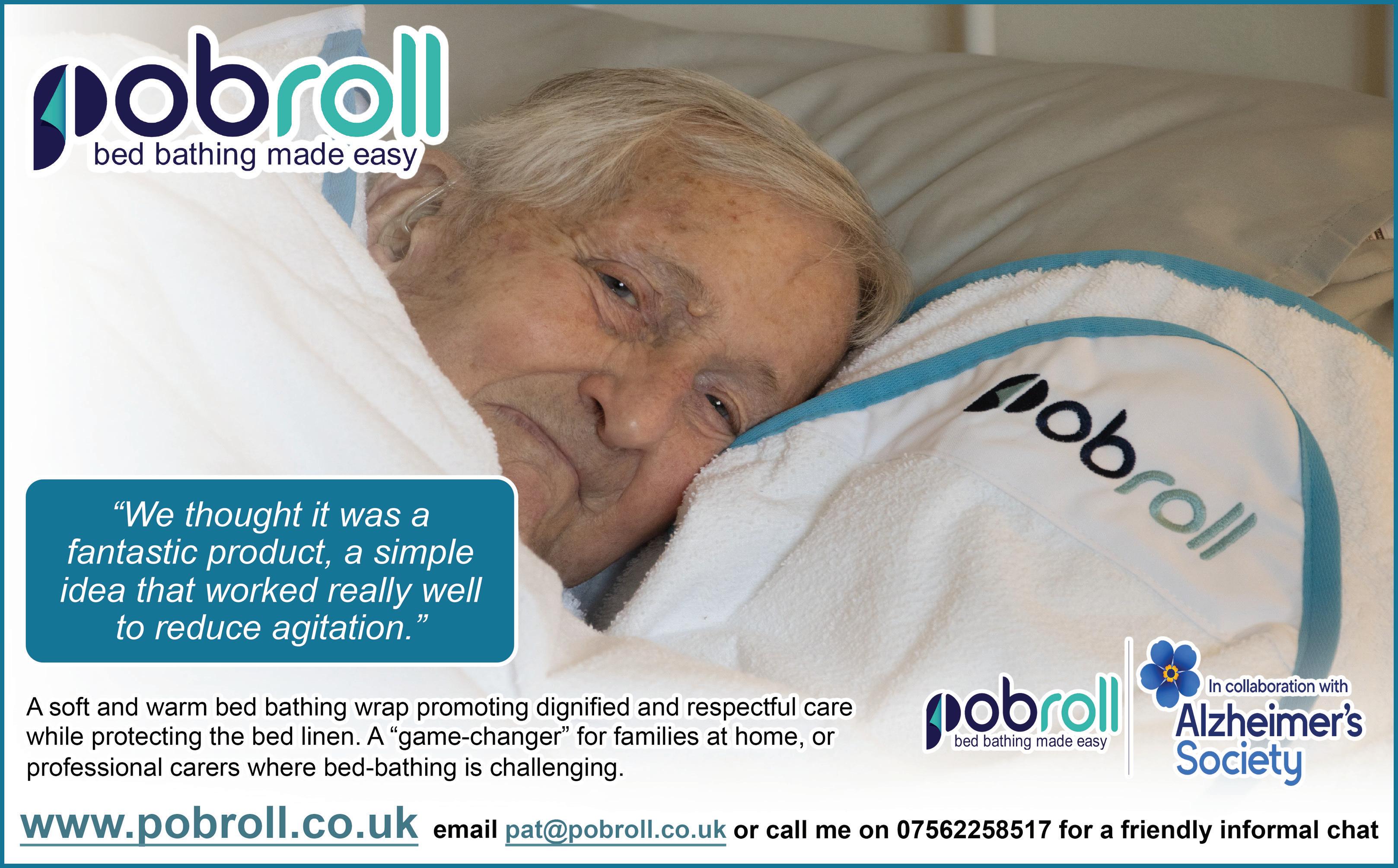
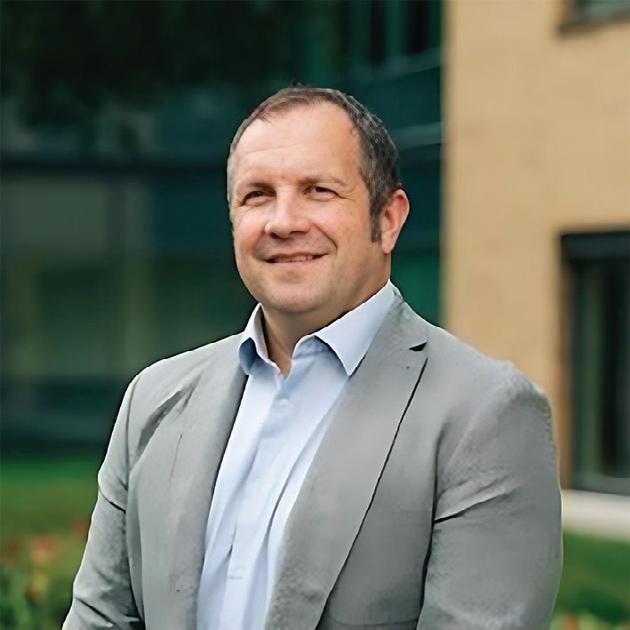
Traditional telephone landlines are switching to digital, which is unsettling for many older generations who value the familiar phone plugged into the wall. Care providers are undoubtedly helping them navigate the change already. As they do, they must think about all services that use the phone line, not just voice calls. Those services may include telecare, alarms and door entry systems that send and receive data and could be switched to cellular connectivity to keep working.
It is the biggest upgrade any of us has seen in telecommunications. The public switched telephone network (PSTN) has been the backbone of UK telephony for a long, long time. Now, everyone must migrate off it because it will be switched off by 31 January 2027. For businesses, BT recommends transitioning before the end of this year.
Most phone users will think immediately of voice calls, but other services are affected by the change too. BT says many millions of devices send and receive data over standard phone lines, including those that meet care needs. Over 2 million people, for example, use telecare services such as personal alarms to mobilise help in an emergency.
These services are essential, a fact not lost on Theo Blackwell, London’s chief digital officer, who expressed concern over the switch off’s impact on adult social care and other critical services. Clearly, a smooth transition to alternatives to keep these services connected is crucial.
Technology solutions have helped patients with chronic health conditions go about their daily lives for many years by monitoring their conditions remotely. Health and care providers receive status updates so they can take rapid action if there is cause for concern. The monitoring devices can send their important data through cellular connectivity, meaning they don’t need to use a fixed line or Wi-Fi.
It works through an Internet of Things (IoT) SIM that the device uses to connect to a cellular network. Solutions are wires-free, so they are simple to set-up for patients and give care providers reliable and secure connectivity. They can onboard new patients rapidly and scale as they need to, with demand. Even if providers have thousands of devices, a management platform can provide visibility into all connections so they can monitor and control data usage and transfer.
By Colin Neale, principal business development manager, Wireless
TIPS FOR KEEPING ESSENTIAL CARE SERVICES ONLINE
It is likely you or your organisation has already been contacted by your telecommunications provider about the digital switchover, but have you checked everything that could be affected?
You must review all services and devices that rely on PSTN (fixed) lines and plan for their transition. Don’t leave it, thinking there is lots of time, many services are being migrated already. Naturally new devices shouldn’t connect via PSTN - you don’t want to add to the migration challenge, which is likely to be considerable already.
As you negotiate the alternatives, think about resilience. It is always important, but critical when services support patient care. Downtime that causes devices to go offline could have very damaging consequences. Resilience should be designed into the solution that connects your care devices, so be sure to speak to your solution provider about maximising uptime.
Cellular, as seen with remote monitoring, can provide connectivity for real-time data exchange and a smooth transition off PSTN, to maintain patient care. There are a number of options care providers can consider, each with its own merits.
Low-Power Wide-Area Networks (LPWAN) can support low data throughput and low power use, suitable for battery-operated devices and remote patient monitoring. Then there is Cat-1 BIS, a globally supported 4G technology for low power devices that require higher speed or two-way data transfers or mobility. It supports two-way voice, so is ideal for independent living devices (with VoLTE support when 2G and 3G networks are gone).
To maximise resilience, a multi-network SIM gives devices access to more cellular networks. That way, if there is an outage, devices could switch to an alternative network to stay connected. Satellite is also an option; it can form part of a hybrid solution with cellular to serve remote areas where coverage might be a problem.
EMBRACING TECHNOLOGY TO ENHANCE PATIENT CARE
Technology impacts all industries, including care. Care providers must assess what the PSTN switch off means for their operations and patients. It may affect more services than you first realise. However, this change is also an opportunity to move to an efficient technology like cellular and potentially enhance care service capabilities.
As our knowledge of chronic conditions expands, technology can support monitoring even more patients remotely. Connected applications are now significant in digital health and are driving the need for resilient connectivity that cellular connectivity can help provide.
Boroughbridge Manor Care Home and Right at Home – Harrogate came together in Boroughbridge to decide to host a community event as the groups held a ‘Big Green Picnic’ event to raise awareness for ‘Dementia Adventure’ a group who are helping people with dementia to access the wellbeing benefits of the outdoors and nature through supported holidays and training.
Residents, their relatives, staff and representatives from the local community all got involved with the picnic spirit as they traded stories of family trips away whilst enjoying the selection of traditional picnic items freshly prepared by the home’s head chef.
Veronica, Managing Director at Right at Home Harrogate, said: “At Right at Home Harrogate, it is so important to us that people living with dementia receive the right support, and that both they and their loved

ones are cared for in a way that promotes good mental wellbeing. We are truly grateful to Barchester Healthcare for partnering with us on these special community events.
It is lovely to see that our values are shared, and together we can raise awareness and make a positive difference for those living with dementia in our local community.”
General Manager. Susan Carter, said: “We’re so grateful to Veronica and our friends at Right at Home in Harrogate for hosting their picnic event at the home, all whilst raising awareness for Dementia Adventure”
A resident at the home said: “it was a treat to enjoy a picnic in the summer sunshine. With a delicious cake in one hand and a glass of prosecco in the other. It was a wonderful morning.”
In retail, bigger is often equated with better. But in continence care, size alone does not equal performance. What matters is fit, appropriateness, and clinical suitability. At Ontex, we believe continence care should be clinically sound, cost-conscious, and centred on the individual. We support care providers through practical training, formulary-aligned product design, and assessment-led solutions that preserve dignity and comfort.
Addressing Common Misconceptions in Care Settings
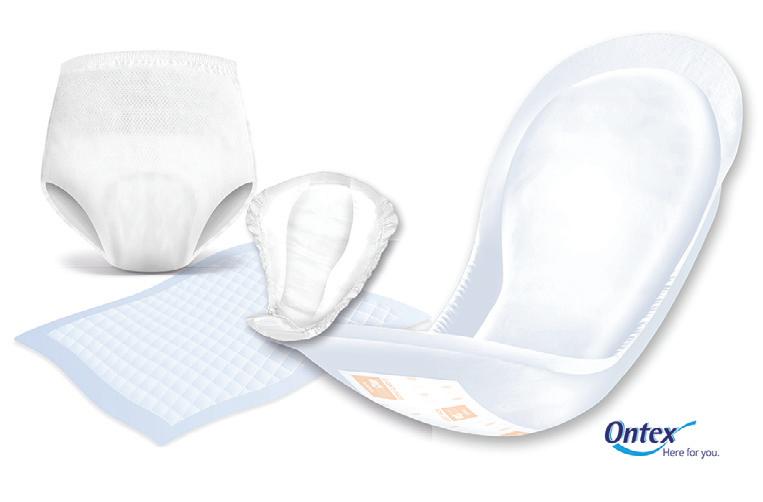
Here are some frequently encountered misconceptions about absorbent continence solutions:
1. "The bigger the resident, the bigger the pad."
This is a frequent misunderstanding. Correct sizing depends on accurate waist, hip, and thigh measurements. In many cases, a smaller, well-fitted solution provides better containment. Selection should also be based on the individual’s continence profile and type- not just physical stature.
2. "Belted products fit anyone if tightened enough."
Tightening at the waist does not guarantee security around the legs.
A proper fit should allow a one-finger gap at the leg and a two-finger gap at the waist. Belted options are often higher-cost items and should be used only when clinically appropriate.
3. "Double padding keeps residents drier."
Layering pads undermines containment. Once fluid reaches the
waterproof backing of the upper pad, it is diverted laterally often leading to leaks, moisture-related skin compromise, and reactive containment changes that increase staff burden. A single, well-matched product is always the safer choice.
4. "Pull-ups are the best option for everyone."
Pull-on formats suit some profiles but may hinder others. They are not ideal for individuals with reduced dexterity or limited mobility. Two-piece systems offer greater flexibility and allow for the use of personal
underwear—supporting comfort, autonomy, and dignity.
Why Assessment Is Essential
A thorough continence assessment rather than assumption-based product selection is key to improving outcomes, optimising cost, and protecting resident wellbeing.
Key Assessment Components:
- Measurements: Capture accurate waist, hip, and thigh data. Always refer to product-specific sizing guidance.
- Bladder Diaries: Maintain a 3-day fluid intake and output record to determine actual absorbency needs. This often reveals a lighter option may suffice.
Clinical and Operational Benefits:
- Prevents unnecessary product usage
- Reduces reactive containment changes
- Minimises moisture-related skin issues and infection risk
- Improves comfort, dignity, and independence for residents
Our guidance aligns with NHS England policy on absorbent containment: assessment-led provision, a maximum of four pads per 24 hours unless clinically justified, and prioritisation of adaptable two-piece systems wherever appropriate.
Broader Considerations
- Infection Risk: Continuous use of containment products without regular reassessment can increase the likelihood of urinary tract infections. A structured, assessment-led approach helps mitigate this risk.
- Skin Health: Selecting the right containment format supports skin preservation. Regular skin checks should accompany each pad change.
- Cost and Resource Efficiency: Product selection tailored to individual need reduces waste, optimises staff time, and supports broader NHS resource stewardship. NHS formularies consistently prioritise flexible, fit-for-purpose solutions.
Final Thought
In continence care, assumptions cost more than time they impact dignity, safety, and outcomes. Assessment-led, evidence-based selection reflects best practice and ensures the right solution, for the right person, at the right time. Want to support your team with continence product fit checks or product training delivered by our Nurse Advisors? Ontex provides practical resources and training, tailored to your care setting. Contact your local nurse advisor to arrange a session.
For

A new study has revealed the most important factors for ageing positively, according to the lived experiences and views of older adults in England.
Research by Nottingham Trent University (NTU) aims to combat society’s negative attitude to ageing and highlight the role of older adults in shaping their own ageing experience – from creating meaningful relationships to giving back.
Exploring the theme of “what is positive ageing?”, a group of 15 participants aged between 56 and 86 took part in interviews with psychologists to share how they were living well as they age.
The researchers identified key themes in the discussions which highlight how positive ageing is a complex concept that goes beyond just physical health.
Essential to their experience is building close and harmonious relationships with their spouse, family, and friends. This range of supportive and healthy relationships provided a secure environment where they felt free to be themselves.
The participants also valued intergenerational connections with people both older and younger than themselves – recognising the richness, meaning, and energy these relationships brought to their lives and how they embraced them with openness and joy.
Engaging with life by learning new things and pursuing personal interests was seen as vital for keeping the mind (and body) active and enjoying life – with some of the participants expressing that they were free to try activities for fun without any expectations.
They also found value in ‘giving back’ through volunteering and community involvement. Simply caring for others – such as grandchildren – provided a sense of purpose and worth.
Accepting that getting older comes with challenges and limitations was also important, helping them to build resilience and adapt to new life stages and changes.
Dr Miriam Sang-Ah Park, lead researcher and principal lecturer at NTU’s School of Social Sciences, said: “Our findings suggest that how older adults feel and think about their ageing is more important than the actual physical changes they go through. We see that positive feelings come from their own thoughts and interpretations, not just from the reality of getting older.
“Our interviewees told us that they often felt overlooked and negatively viewed or patronised, particularly by younger generations, but, despite this, they accepted themselves as they are and weren’t confined by the age-related expectations that society puts on them.”
The study recommends that policies and programmes aimed at promoting positive ageing be focused on the person, considering older adults’ experiences and priorities beyond physical health.
Dr Park added: “Older adults are still developing and their aspirations, needs, and wishes matter. We shouldn’t perceive old age as the end-of-life stage where the fulfilment of goals is ignored.
“We need to combat ageist attitudes in society and support older adults with social connections across generations, along with opportunities for community involvement and lifelong learning to continue their sense of purpose.”

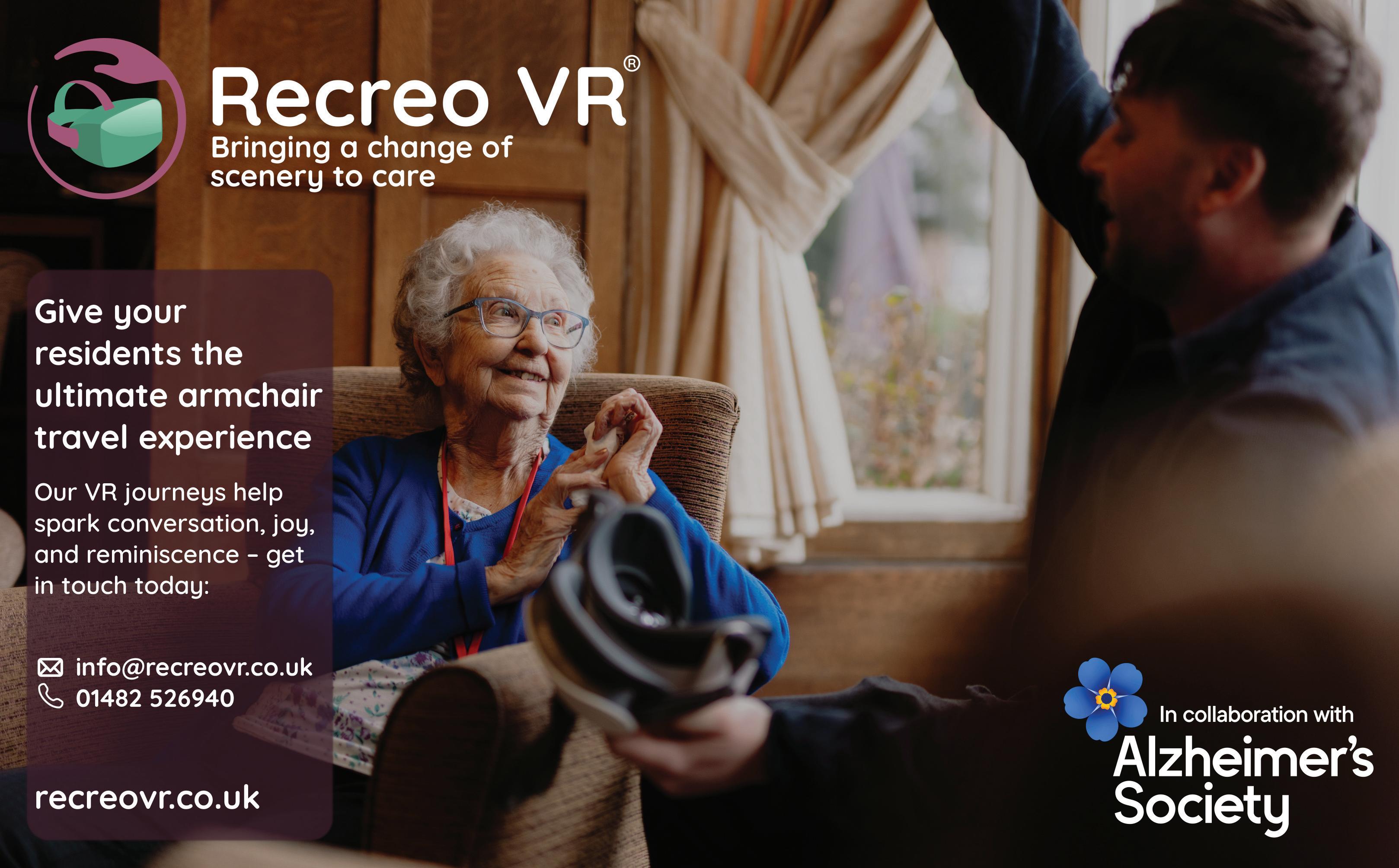
By Bruce Robins, director of fire safety supplier
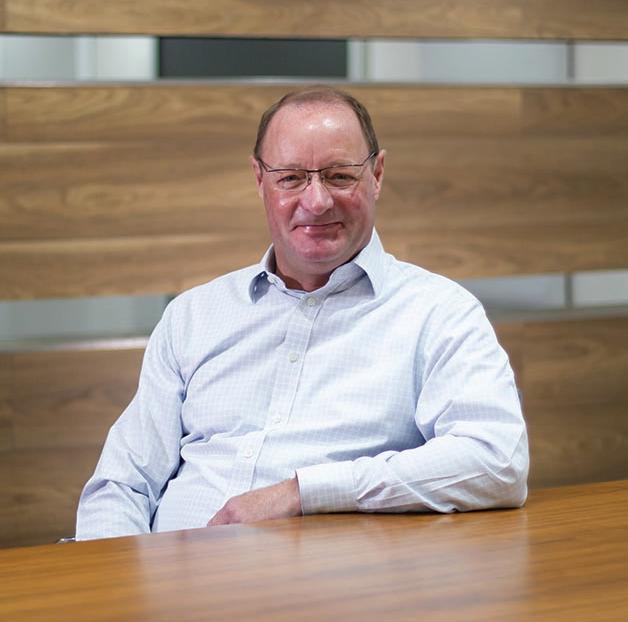
Fire presents a serious threat to every type of building. However, in residential care homes, this risk is significantly heightened due to occupants’ vulnerability and the complexity of evacuation. While fire risk assessments are essential – and legally required – in any setting, the unique challenges within care environments demand a nuanced and robust approach to fire safety management.
In the year ending March 2024, fire and rescue services carried out 5,671 audits in care homes across England and only 54% were deemed ‘satisfactory’ – highlighting a concerning gap in compliance and preparedness in the sector. With nearly half of care homes audited requiring improvement to fire safety measures, this underlines the urgent need for meticulous planning, clear protocols, and ongoing staff training. Above all, the sector holds a critical responsibility to ensure fire safety plans are not only fully understood and implemented, but leave no room for oversight or inadequacy.
THE IMPORTANCE OF A REGULARLY REVIEWED FIRE RISK
As with any other ‘business’ setting in England and Wales, care homes are governed by the Regulatory Reform (Fire Safety) Order 2005 (RRFSO). Meeting these stringent requirements is a fundamental aspect of duty of care.
Under the RRFSO, the onus for fire risk management falls to the “responsible person” – typically the care home manager or provider. These individuals must take reasonable steps to reduce the risk of fire and ensure procedures for the safe evacuation of the building in the event of an emergency. This includes overseeing fire risk assessments, maintaining fire detection and warning systems, providing adequate means of escape, and ensuring staff are properly trained. Importantly, the RRFSO demands a risk-based approach tailored to every setting. In care homes, this means the responsible person must consider the specific needs and limitations of residents when devising fire prevention strategies.
It is highly recommended a fire risk assessment is undertaken by a trustworthy fire safety expert or “competent person”, ideally with experience in healthcare environments. This is a five-step process that begins
with the identification of fire hazards – common ignition sources (electric heaters, for example) and fuel (emollient creams or accumulated laundry, for instance) – and highlights anyone at risk. Many residents may not be able to self-evacuate, yet government guidance is clear: care homes must not rely on the fire and rescue service for evacuation. Instead, every resident must be assessed individually and addressed in a personal emergency evacuation plan (PEEP).
The fire risk assessment then seeks to evaluate, reduce, and remove risk. Any risk must be reduced as much as is reasonably practicable. This includes the installation of effective fire detection and warning systems, accessible firefighting equipment (fire extinguishers pertinent to the fire risk), and robust passive fire protection measures. Crucially, fire risk assessments must be reviewed and updated regularly, particularly when there are significant changes to the building, its layout, and use.
Evacuation strategies must consider a range of factors such as shift patterns, residents’ mobility needs and PEEPs, designated escape routes, the dependency of people using the building, and assisted means of escape. Residents are typically grouped by dependency – ’independent’, ‘dependent’, and ‘very high dependency’ – and staff, including temporary and agency workers, must be trained not only in procedures, but in how to reassure and assist residents based on their individual needs. Some residents may need to remain in their rooms during an incident (for example, if they are on oxygen or they are bedbound), necessitating enhanced fire protection for the room, specialist equipment, and additional time for safe evacuation. Other residents may become disorientated and distressed by fire alarms and require familiar staff using specific cues or objects. Personal plans must be routinely reviewed, updated, and incorporate meaningful input from frontline staff and residents’ families.
Clear, compliant signage is another critical component of a fire safety plan in care homes. Under the Health and Safety (Safety Signs and Signals) Regulations 1996, premises must display specific signage to identify fire risks, highlight escape routes and alarm points, and locate firefighting equipment. This signage, more than simply a legal requirement, provides crucial guidance, and can ensure residents, staff, and visitors unfamiliar with the building are reassured on the actions to take in an emergency.
If the sector is to improve ‘satisfactory’ results in fire and rescue services’ annual audits, a shift from passive compliance to active preparedness is required. It’s vital that care homes utilise fire risk assessment expertise and collaborate with local fire services. A tailored, person-centric approach to fire safety will ensure crucial challenges of the setting are met, and that all users of the building are protected in emergencies where every second counts.
The Last Night of the Proms is a much-loved British tradition, closing the BBC Proms season at the Royal Albert Hall in London with patriotic atmosphere and enthusiastic audience participation.
Not to be outdone by the London prommers, residents, guests and staff at Cambridge care home Waterbeach Lodge put the flags out in style last weekend and created their own version of this spectacular celebration. Care home manager, Lynn Ward, said: “This is an event that we have held many times and it’s always loved by our residents. “Mezzo soprano Olivia Barry sang for us to recreate that exciting proms atmosphere and there was lots of flag waving, bunting and exuberant singing.”
This year, because Waterbeach Lodge has just achieved its Veteran

Friendly Framework accreditation, invitations were sent to local armed forces veterans, who also joined the celebration.
“Our residents were in fine voice at our very own proms on Sunday, with Olivia commenting that we were almost word perfect. Garlands, hats and flags were aplenty, and everyone said they thoroughly enjoyed the afternoon.
“All were welcomed with a drink and after the performance there was a delicious post-performance buffet. It has to be said that a few tears were shed for some of the songs which Olivia performed so beautifully. As war Veteran Angus Critchley Waring declared at the end, ‘ Bravo to you my dear, you can come again!’”
HC-One’s Mossdale Residence Care Home in Burnholme, York, was visited on Tuesday 19th August by MP for York Central, Rachael Maskell. Residents and colleagues of the HC-One owned care home enjoyed meeting their MP, Rachael Maskell, and chatting to her about what life is like at Mossdale Residence Care Home – which is an integral part of the local Burnholme community.
MP Rachael Maskell enjoyed a tour round the 80 bedded residential and nursing care home, including the central courtyard garden, lounge, bedrooms and state of the art facilities, before joining residents, colleagues and the local community for a cup of tea and a slice of cake as part of the home’s coffee morning event.
Julie Banks, Home Manager at HC-One’s Mossdale Residence Care Home, commented: “Rachael Maskell’s visit to our home created a truly

uplifting atmosphere, giving residents the chance to share their experiences and talk openly about the issues that matter most to them. The conversations were both heartfelt and constructive, highlighting practical ways we can work together to bring about positive change for our community.”
Rachael Maskell MP for York Central, said: “It was wonderful to visit Mossdale to chat to residents at their coffee morning, listen to their perspectives on current affairs and have a tour of this homely facility. As always, the staff are so warm and welcoming, and the residents certainly shared their love of the home. It was also good to be able to follow up an issue a resident raised with me and to secure the outcome she was seeking. Without doubt, this care home is all about the residents, and ensuring they have the highest quality of care.
Fifteen dedicated care workers at a Glasgow residential facility are confronting potential deportation following what politicians describe as a bureaucratic failure that could devastate local care provision, according to a report in The Daily Record.
The experienced staff members at Burlington Court Care Home in Cranhill face removal from the UK after their legal status was inadvertently compromised during a company ownership transition.
The workers, who have provided essential care services in Scotland for several years, found themselves caught in regulatory complications when the care home changed hands following the previous operator’s financial collapse.
The crisis emerged when the facility’s new management failed to submit crucial sponsor licence documentation within the required 20-day window following the TUPE transfer of employees. This oversight resulted in the automatic cancellation of the workers’ Certificates of Sponsorship, effectively invalidating their legal right to remain in the UK.
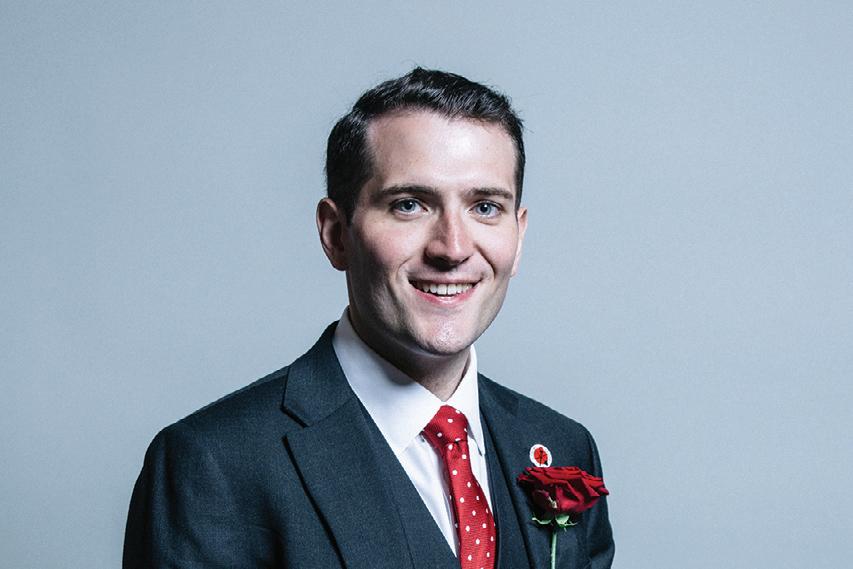
Home Office correspondence received by the affected staff earlier this month confirmed the revocation of their skilled worker status and set an October deadline for departure from the country.
Glasgow MSP Paul Sweeney has mobilised political support for the workers, collaborating with parliamentary colleagues to challenge what he characterises as an “administrative error” with serious human consequences.
“The situation facing these dedicated professionals is completely unacceptable,” Sweeney stated. “These individuals have committed years of service to supporting Scotland’s most vulnerable residents, yet find
themselves penalised for circumstances entirely beyond their control.”
The MSP highlighted the broader implications for Scotland’s care sector, emphasising the critical role played by international workers in maintaining service provision amid persistent staffing challenges.
The GMB trade union has launched a formal campaign urging Home Office officials to suspend the deportation process while seeking resolution to the administrative complications.
Kirsty Nimmo, GMB Scotland’s care sector organiser, condemned the treatment of the workers as fundamentally unjust. “Scotland’s social care infrastructure depends heavily on the expertise and dedication of overseas professionals,” she emphasised. “These individuals deserve recognition and security, not bureaucratic punishment for circumstances they neither created nor controlled.”
The case highlights persistent vulnerabilities within the UK’s immigration framework for essential workers, particularly affecting the already-strained care sector. Industry representatives regularly cite recruitment difficulties as a primary operational challenge, with international staff forming a crucial component of workforce sustainability.
The workers now have until October to secure resolution through their employer’s regulatory compliance, though union representatives argue this timeline creates unnecessary pressure and uncertainty.
The case underscores broader questions about the resilience of regulatory frameworks supporting essential workers during periods of business transition, with implications extending beyond this individual facility to the wider care sector’s operational stability.
RPS Fellow Dr Raliat Onatade has been awarded Pharmacist of the Year at the Black Healthcare Awards 2025.
The Black Healthcare Awards, hosted annually by the Caribbean and African Health Network (CAHN), shine spotlight on the outstanding achievements of Black professionals across the health sector.
The Pharmacist of the Year Award recognises individual pharmacists working in community or hospital settings who have made an outstanding contribution to delivering optimal care, demonstrated innovation or made an impact through their research.
Dr Onatade’s award is a testament to her significant contributions to pharmacy practice, patient care and research, as well as her leadership and impact within the profession.
Dr Raliat Onatade said: “Thank you to the royal pharmaceutical society for the recognition. It is a privilege to be a member of the pharmacy profession and for my work to be acknowledged.
This award inspires me to continue to advocate for, and support, innovative pharmacy practice in order to improve the health and care of patients and the public.”



Watch your resident's eyes light up when the beautiful tea trolley arrives! Euroservice trolleys can also be used as a vending trolley or to sell personal care products to residents. How about a delicious snack/pastry trolley or even a drinks trolley for that afternoon tipple?
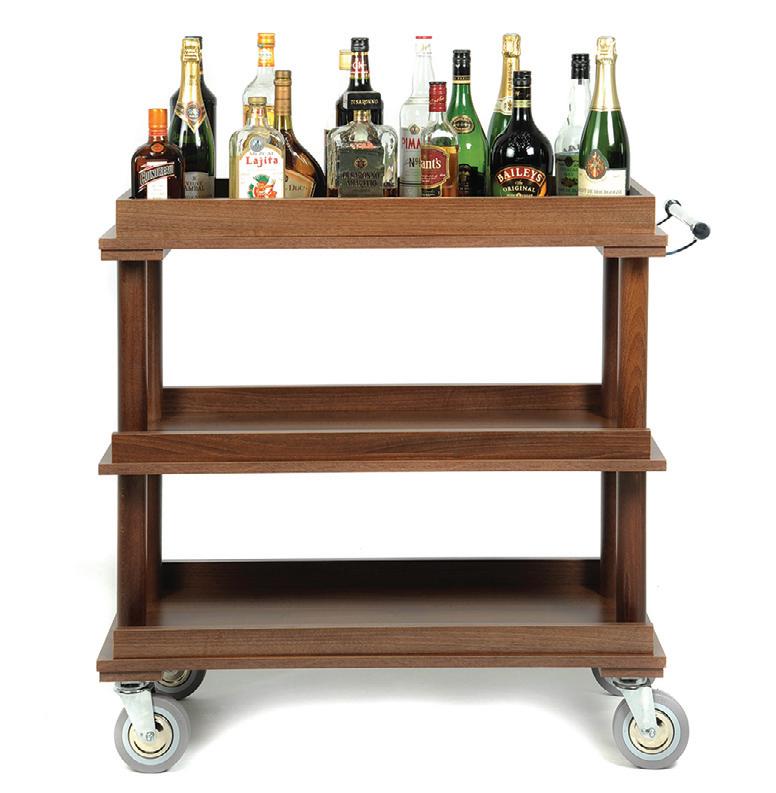
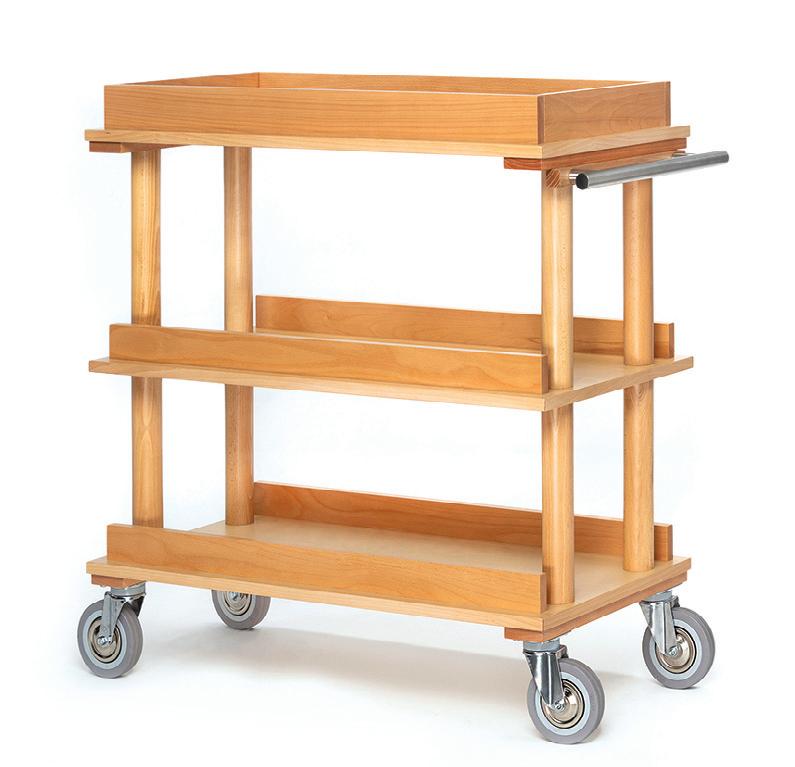
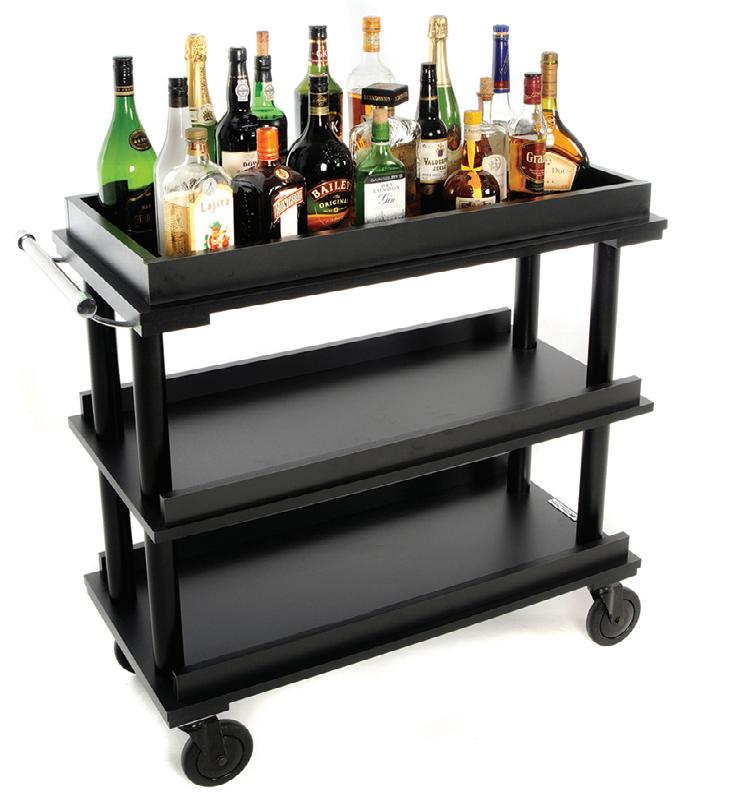
Your lovely trolley could do so much for
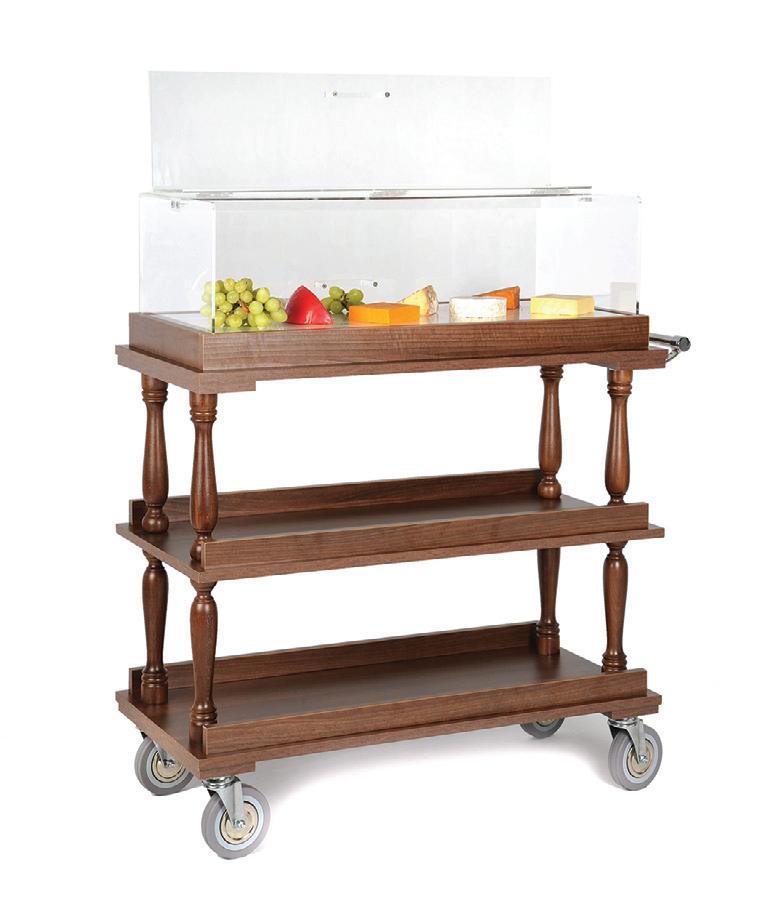
By

As a senior sister at King Edward VII Hospital we had many patients that came from the Middle East. One thing that struck me as curious was that the women often lay in their beds with a sheet over their faces. I was confused because I didn’t know whether it was a cultural issue. However, this was not good for their health, especially post-surgery. I asked the other Middle Eastern patients if they could teach me how to say “Good morning “and “please get out of bed”. One morning I went into a patient’s room and said in Arabic “Good morning “and “please get out of bed” The Middle Eastern patients taught me a few basic phrases and were delighted that I wanted to learn. When I greeted one woman in Arabic, she sat up looking shocked and then started to laugh, especially when I asked her to “get out of bed. She raised her arms for assistance and promptly got out of bed, enabling me to get the physiotherapists. I felt that we had formed a bond. I further learnt how to say
“Are you in pain?” “Do you want a painkiller and “How is your food?” These few phrases opened doors. The patients could tell
me if they were in pain. I also realsised that they did not like the food and even though it was excellent, it was British and they did not like it and were totally unused to it. I then negotiated with the chef to serve them Arabic food. As we all know meals in hospital break up the day and are looked forward to, not dreaded. This in turn really cheered the patients and I became close to the women and learnt that they are very warm hearted with a great sense of humour. When they were discharged, they would ask me to come and eat with them and their families and so started my Arabic journey.
I wanted to learn more. I self-taught myself with on-line courses but it wasn’t the same. I tried to practice speaking to Arabic women on the bus. Again, their response was always one of good cheer and warmth. One day I was talking to a woman who spoke perfect English and I asked her if she knew of an Arabic teacher I could go to. She laughed and said she ran an Arabic school in the Muslim Centre which is only 10 minutes from my home and asked if I would like to attend. This was a dream for me. So now every Monday I attend the Muslim Centre for my lessons. The women in the class welcomed me and are so warm and friendly and I feel like part of their community. Most of the women have lived in the UK for many years but want to improve their language skills. I giggled at myself as I heard them all chatting away and I was reciting the ABC. Can you imagine my terror when the teacher made me write the letters down in Arabic. I love going to this school.
I reflected on my experiences and my journey and came to realise how frightened my patients were and their feelings of isolation. Coming to a strange country, not being able to talk to anyone or ask questions, eating strange food that they did not enjoy and male doctors coming to examine them that in ordinary circumstances would have been totally against their culture. I would make the consultants wait and ask the women if they wanted to put their hijabs on and they always did and were grateful to be asked. I thought deeply about the importance of communication with patients and how it can make such a difference in their recovery. I thought about other patients who did not speak English or have family to visit them and how we might improve their hospital experience. My journey also taught me how difficult it must be for our international nurses and how homesick they must feel and we have a responsibility to make our wonderful colleagues welcome and help them learn about our culture. It has been such a journey and it isn’t finished yet.
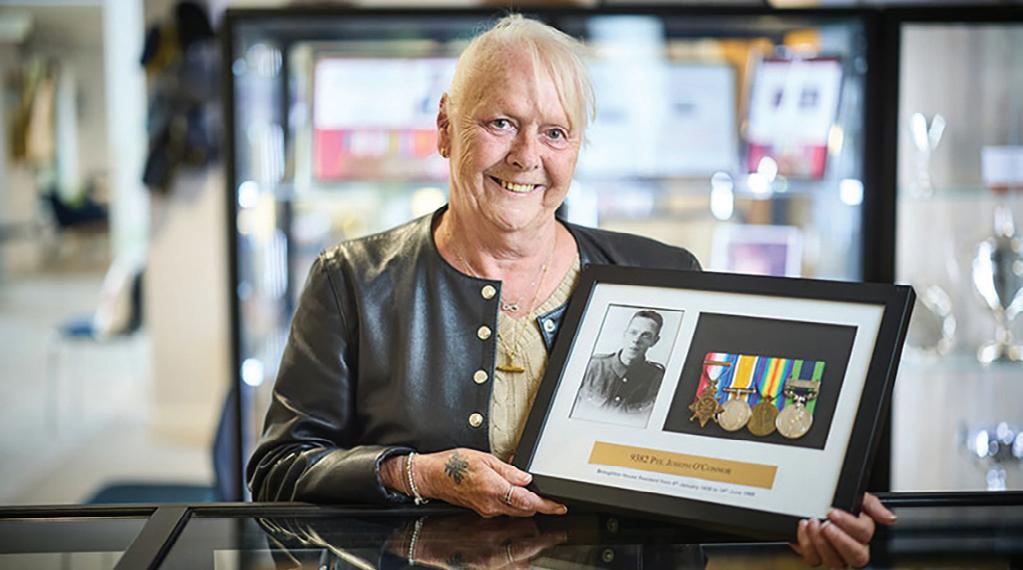
A World War One hero’s military medals which his widow had kept in a tin box have gone on display at the veterans’ care home where he lived for 30 years, after his family donated them to its museum.
Cavalryman Joseph O’Connor, serving with the 13th Hussars, was wounded by shrapnel and thrown from his horse during a battle in Mesopotamia – now Iraq – in November 1917. His injuries are thought to have contributed to him suffering from creeping paralysis several years later. He gradually lost muscular function, and eventually became paralysed from the neck downwards.
In 1938, Joseph was moved to Broughton House Veteran Care Village in Salford, and he was cared for there until he passed away in 1968 at the age of 73.
His collection of medals comprises the 1914 Mons Star, a campaign medal which was issued to original members of the British Expeditionary Force, the 1914-19 British War Medal, the 1914-19 Allied Victory Medal and an Indian General Service Medal with an Afghan North West Frontier clasp. They were kept by his wife Hannah in a tin box for years at home in Hyde, Tameside, and then by their daughter Kathleen.
Elaine, who was tearful with emotion at seeing them on display, said: “Broughton House was my beloved grandad’s home for many years, and he was so happy here that we felt it was right to donate the medals to the museum. This is where they belong.
“He would certainly approve, and we are extremely proud to see them exhibited.
“Grandad was an adored and revered person, and I have vivid childhood memories of visiting him nearly every week at Broughton House. He was a hero to us, although he didn’t talk about the war.
“Even though he could only move his head due to his condition, he was always jolly. The family was happy that he got to live for many years in such a nice place.
“He used to say that he could see the trees and the flowers and hear the birds singing, and that there were residents worse off than him because they were disfigured or had lost limbs.”
Great-grandmother Elaine, a retired shop assistant who is married to former engineering worker Jimmy Prince, was one of three children born to Kathleen, who is 102.
“Mum is happy that we’ve had the medals spruced up and have donated them to Broughton House,” said Elaine.
“A friend arranged to have them cleaned, re-ribboned and framed, and they look fantastic.”
Broughton House historian and museum curator Owen Hammond, who researched Joseph’s story, said: “We are very proud to have these medals on display. He was a genuine hero of World War One who fought in some ferocious battles and many gallant actions.
“We’re so grateful to Elaine for her immense generosity in donating them. It’s hugely appreciated.
This is the oldest collection we have that belonged to a former resident, so it has a lot of significance for Broughton House.
“It’s a really important and valuable addition to our exhibits. alongside those of other heroes of the world wars.”
Joseph was born in October 1894 and lived in Hyde.
In 1912 aged 18, he enlisted at Ladysmith Barracks in Ashtonunder-Lyne and in March 1913 he was posted to the 11th Hussars (Prince Albert’s Own) cavalry regiment.

In August 1914, just 11 days after war was declared against Germany, Joseph and his regiment were deployed to France as part of the British Expeditionary Force.
The 11th Hussars took part in the Battle of Mons and, with the 2nd Dragoon Guards, made a cavalry charge which led to the capture of eight enemy guns at Néry in northern France in September 1914 as part of the Great Retreat.
They then fought at the Battle of Messines in October 1914 and at the Second Battle of Ypres in April 1915.
In October 1915, Joseph was assigned to the 13th Hussars, and in June 1916 the regiment was deployed to Mesopotamia. Its troops took part in the Second Battle of Kut in February 1917 and the capture of Baghdad a month later.
Joseph was later posted to India and, following the end of World War One, served in the Third AngloAfghan War.
He returned to England in 1920 but in 1924 began suffering from creeping paralysis and was discharged from the army.
By 1928, he was in a wheelchair and moved to Broughton House when Hannah was unable to adequately care for him at home.
Residents at an Ilkley home can visit places such as Scotland and the North York Moors without leaving their home thanks to a new train experience.
MHA Glen Rosa have installed the Jolly Journey Train Experience, a new initiative by Little Islands, who specialise in creating unique interactive environments.
The train experience showcases journeys across the UK from the viewpoint of a passenger looking out of the window.
The team from Little Islands installed and decorated a part of the home’s dementia unit and converted it into a train carriage with props such as suitcases, train times and journey information displays.
MHA Glen Rosa provides residential and residential dementia care for 47 residents.
Adam Carling, home manager said: “The Jolly Journey Train experience is a new initiative and one that is proving to be very popular here.
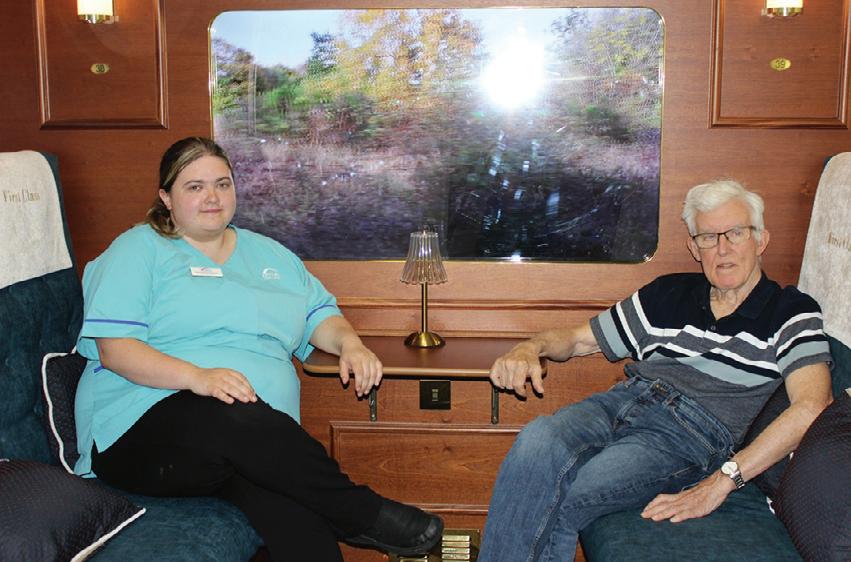
“We have received some great feedback since the experience has been installed.
“Our residents love it, you will often see a number of them sat in the carriage and watching a journey.
“The idea came to me from my area who forwarded it to me, and I decided to look into it.
“I then contacted the team at Little Islands and the whole process took a couple of months from start to finish.
“We are quite privileged here at MHA Glen Rosa, where thanks to the generosity of the local community we are able to provide services such as this for our residents.
“We received a very generous donation via our Legacy Fund which enabled us to go for this experience.
“The location of the experience is really good as it’s in a high footfall area, where both residents and their relatives can sit and enjoy it.
“Alongside the Train Experience, we have also prepared a sensory garden thanks to funds we received.
“I do think this is something other MHA homes can look into having, it’s something quite unique and I
A shortage of supported housing in 2023-24 cost the NHS £71 million through delayed mental health hospital discharges.
Expanding provision has the potential to save up to £50 million a year for the NHS and a total annual saving of £6 billion for the wider public purse and the Local Government Association (LGA) is urging Government to address subsidy rules and invest in supported housing to reduce pressures on health services and ensure effective implementation of the Supported Housing Act.
Supported housing provides a vital safety net for individuals with complex needs, including people experiencing or at risk of homelessness, care leavers, people with disabilities, and those with mental health needs. It is a lifeline service offering safety and stability in a secure home environment, enabling people to live independently, preventing homelessness and reducing pressure on hospital admissions.
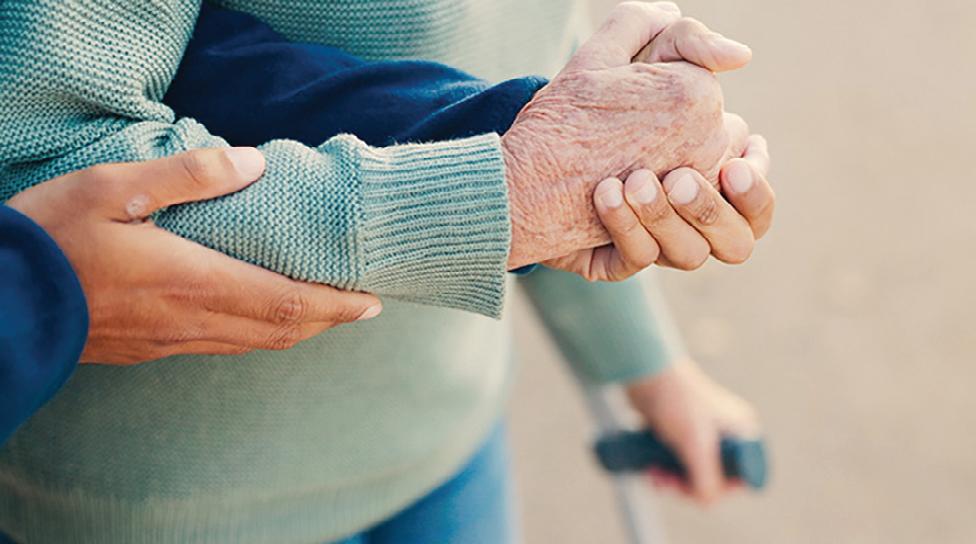
It is just one vital element of a broader preventative care and support system that keeps people healthy and enables independent living. Adapting homes, investing in community support, and reducing isolation and loneliness are all part of a care system that enables people to live more equal and healthier lives.
The call to government coincides with new guidance for councils published by the LGA today, highlighting the growing demand for supported housing provision. Analysis by the National Housing Federation found that by 2040, additional demand for supported housing will exceed 200,000 units. THE LGA IS CALLING THE GOVERNMENT TO:
• Consider the full scale of new burdens funding required for councils to adequately implement licensing
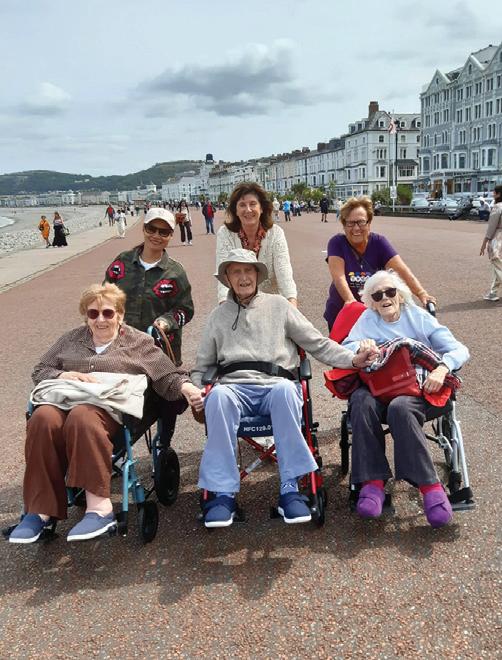
schemes, enforce new standards, and support well intentioned providers.
• Sustainably fund the commissioning of supported housing to prevent homelessness, ease hospital discharge, and reduce care placements.
• Reform housing benefit subsidy rules, which currently leave councils millions of pounds out of pocket and limit their ability to commission highquality supported housing.
Cllr Dr Wendy Taylor, Chair of the LGA Health and Wellbeing Committee, said: “Councils are committed to providing high-quality supported housing for residents and want to invest more to continue enabling people who draw on care to lead independent and fulfilling lives.”
“Groundwork is being laid by councils across the country, through innovative working ahead of the implementation of the Supporting Housing Act. But, without much-needed long-term investment in this essential preventative care service, many older people and those with physical and learning disabilities will continue to be in hospital and residential care longer than necessary. Young care leavers, people fleeing domestic abuse, and those experiencing homelessness will be without stable housing.”
“We urge the Government to work with councils to invest in supported housing, to enable councils to meet their duties under the Care Act, deliver licensing schemes, enforce new standards and support providers with building a supported housing system that is fit for the future.”
“This new guidance will support councils to identify the most effective tools to deliver high-quality supported housing schemes within the context of their local priorities, challenges and capacities.”
Connell Court’s wonderful residents took a scenic day trip to the stunning seaside town of Llandudno! With their hats on and smiles ready, our brave explorers enjoyed the fresh sea air, breathtaking views, along with lashings of ice cream, donuts, coffee and cake.
The trip provided a day to remember for our residents and our carers. The trip was filled with laughter, stories, and making new memo-
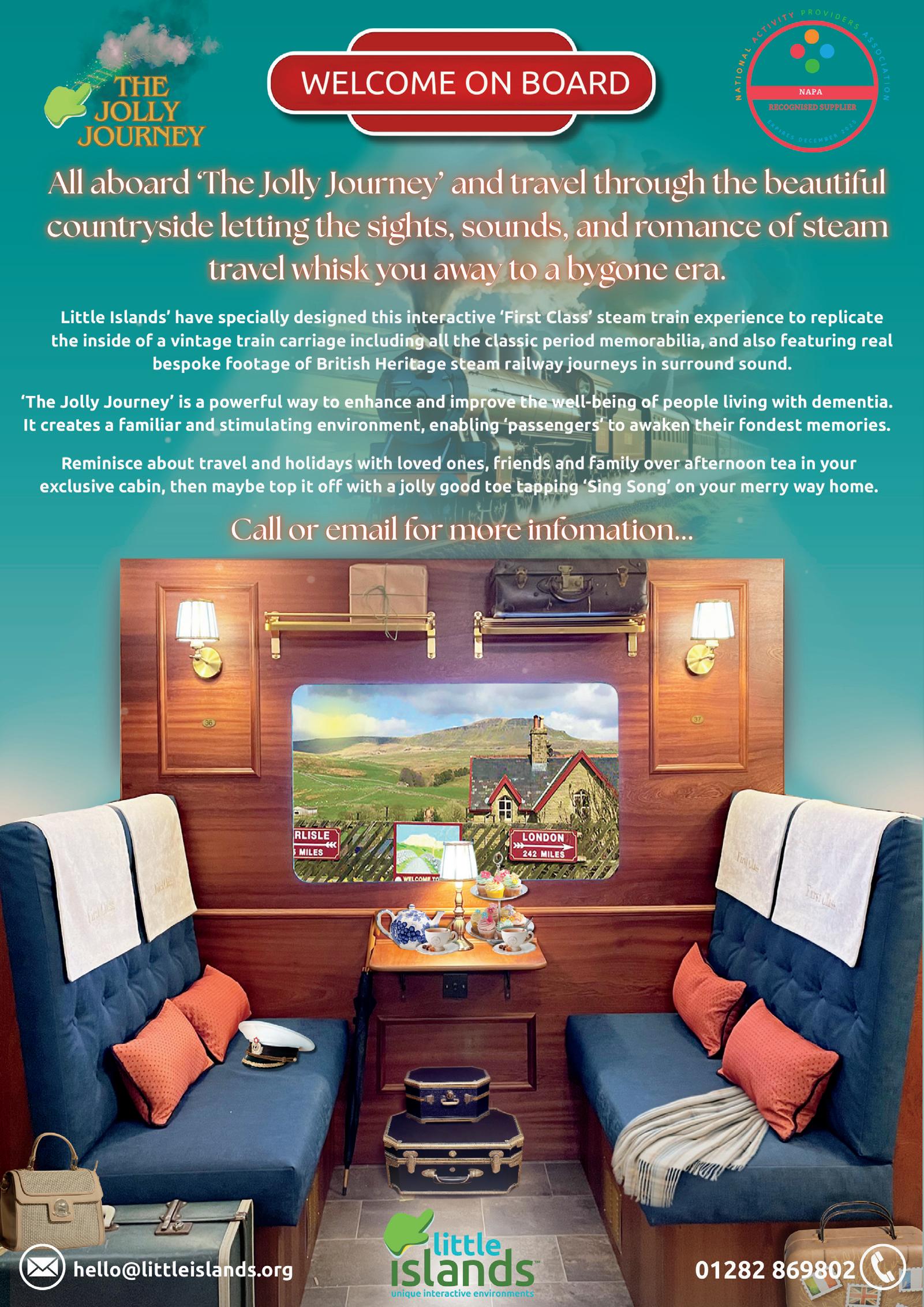
ries. From strolling along the promenade to visiting the famous Llandudno Pier, with lunch at The Imperial Hotel, everyone enjoyed a day of adventure and relaxation.
"Our residents deserve a day of joy and adventure," said Anna Harvey. "Llandudno is the perfect backdrop for creating cheerful moments and reconnecting with the seaside magic."
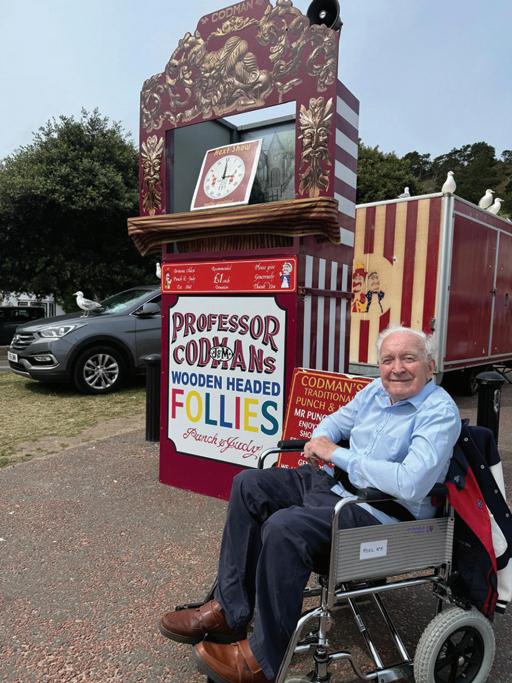
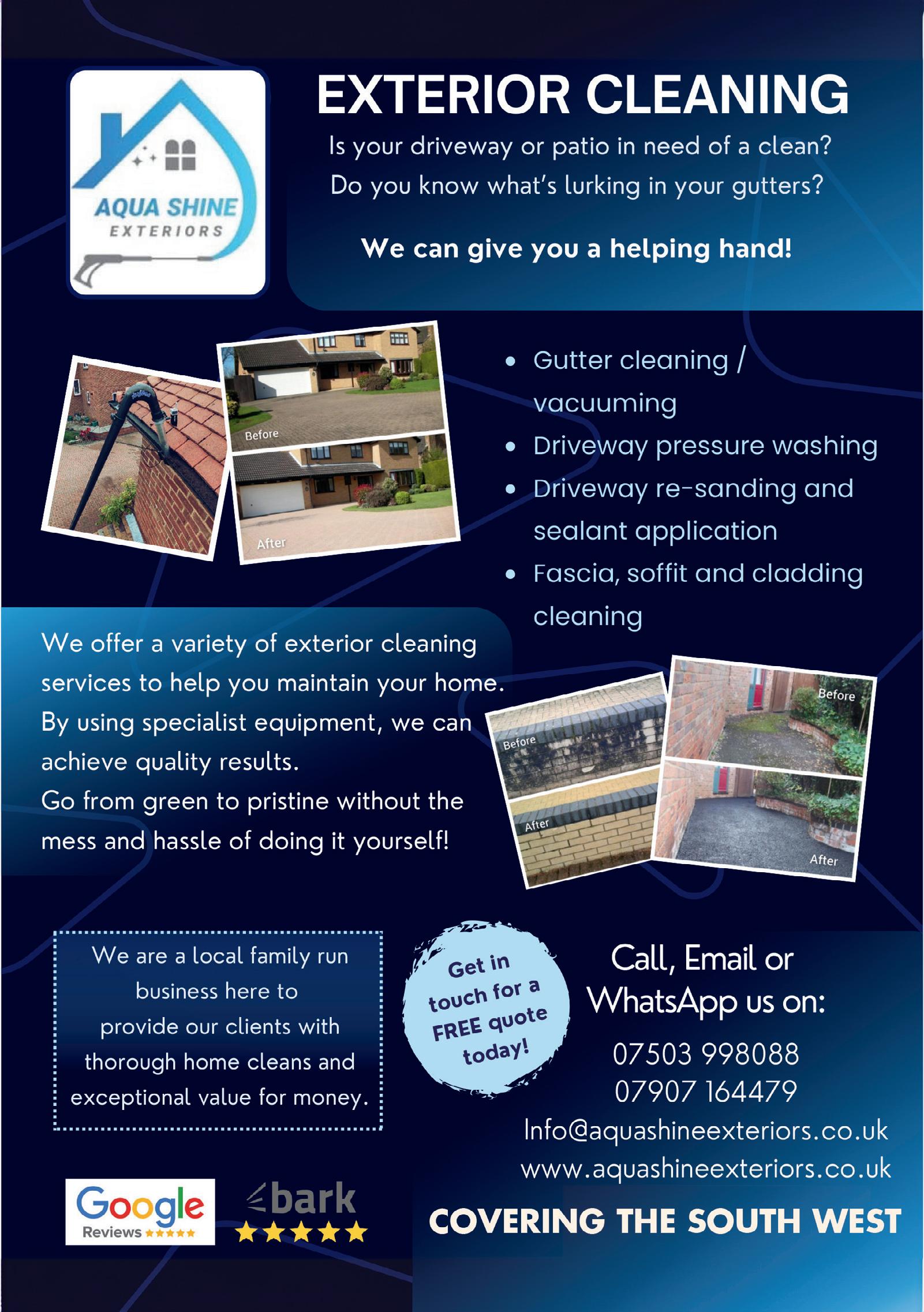
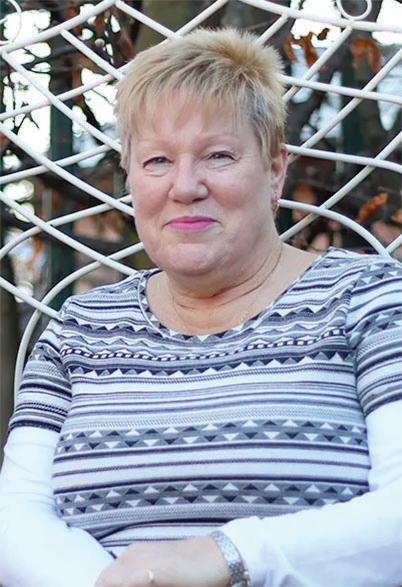
Lilian Faithfull Care (www.lilianfaithfull.co.uk) is offering five exciting and accessible activities for people living with dementia. With 1 in 11 people over the age of 65 having dementia, (and that number continues to increase due to people living longer), it is important to learn about activities that people with dementia can enjoy and do safely.
Supported by expert research, these activities aim to boost mood, stimulate memories, and encourage social interaction in an uplifting environment.
Yvonne Kelly-Fox, Dementia Lead Specialist at Lilian Faithfull Care says, “activities like these are more than just fun for the individuals with dementia, they’re an essential part of care. Engagement with nature, music, and creative expression can have a profound impact on cognitive and emotional wellbeing”.
Here are five activities designed to enrich the lives of people with dementia:
• Memory garden strolls - Taking a walk through scented, sensory gardens offers a chance to enjoy the outdoors and connect with nature. Smells like lavender, may help to soothe symptoms of dementia, such as sleeplessness and agitation. Have a go at a bit of light gardening, research shows that time spent in nature can help lower stress, boost mood and improve overall wellbeing.
• Music sessions - Music has been known to improve thinking, feeling, perception, mood and
behaviour in some people with dementia. Have a music session with your loved one or put on a playlist of songs that they love. A recent analysis found that music therapy, when tailored to individual needs, can reduce agitation and anxiety in individuals with advanced dementia.
• Sensory play - Engaging the senses through touch, sound, and visuals can stimulate cognitive function and bring comfort to those living with dementia. At Lilian Faithfull Care’s Royal Court, the newly opened Lavender Unit offers a purpose-built sensory space, designed with soft lighting, calming music, and soothing furnishings to create a tranquil environment for relaxation and sensory exploration.
• Reminiscence art - Offer the opportunity to create an art masterpiece by using old photos, old newspapers and personal keepsakes to create a scrapbook or picture. Ask if they have any memories of the events or places in the pictures, this can help express feelings.
• Gentle outdoor exercise - Research shows that regular exercise can reduce the risk of developing dementia by up to 20%. Taking part in some Tai Chi, chair yoga, or simply taking a light stroll can improve memory function and promote positive behaviours in people with dementia.
Residents at social care services across Scotland recently united for a day of fitness and fun.
Cygnet Social Care run numerous services in Scotland, all of which support those with learning disabilities, autism and mental health needs. The six sites include Ellen Mhor, Lindsay House, Ranaich House, Thistle House, Trinity House and Trinity Lodge.
Staff and individuals supported at the services congregated at Dunblane Cathedral for their annual sports day event. The day itself was meticulously planned by residents across all services.
Molly Totten, Activities Coordinator at Ranaich House, located in Dunblane, highlighted the success of the collaborative sports day.
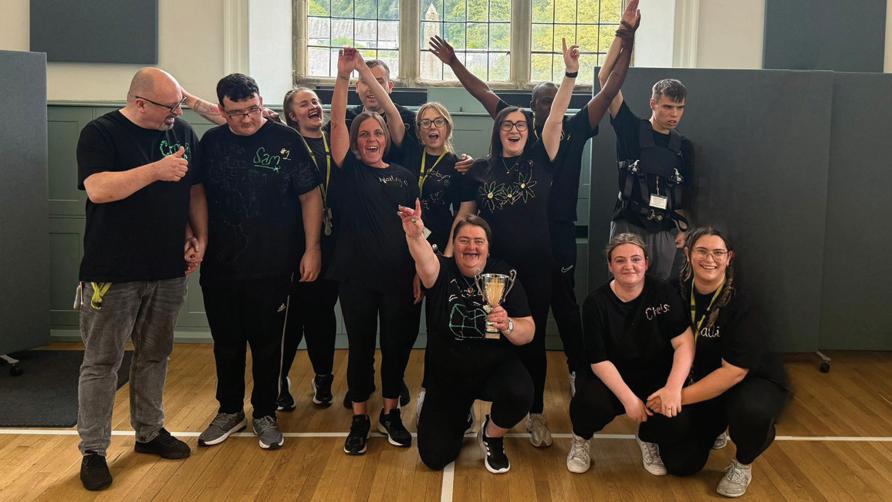
She said: “It was a wonderful day full of smiles and enjoyment. The individuals we support across our Scottish Cygnet Social Care services worked really hard to plan the games and each team then decorated t-shirts and banners to show off at the event.
“It was a truly wonderful example of our residents’ abilities by seeing how well the day they’d planned turned out. Each participant also put in so much effort, which they were applauded for and every runner-

up was awarded a medal.”
Residents took part in a series of sporty activities like the egg and spoon race, a ring toss, a relay race, tug of war and musical statues. Team Ranaich House were crowned champions and took home the first-place trophy.
Molly said: “The highlight of the day was seeing how much fun everyone had spending time together and cheering each other on. It was lovely to see how well everyone gets on and just enjoys what they are doing in the moment.
“Working closely with other Cygnet Social Care sites in Scotland means that there have been quite a few friendships formed as we spend a lot of time together. Despite being on different teams, all residents were rooting for each other and their friends from our other services. There was still a fair bit of friendly competition though.
“Sports day is really important for the people we support as it promotes healthy exercise and brings everyone together, strengthening bonds and friendships. The feedback was positive and some even called it the highlight of their year and can’t wait to start planning next year’s event.”


• We specialise in the sale and purchase of quality used wheelchair accessible vehicles and ambulances.
• They can be bought as seen or refurbished and sign-written to your own requirements.
• Fully serviced, new mot & warranty
• Engineers inspection supplied if required.
• Free delivery service available
• All buses comply with new legislation
•
• Lease hire and purchase


The United Kingdom is witnessing a historic demographic shift as England and Wales celebrate record numbers of residents reaching their 100th birthday, according to new statistical data that highlights both opportunities and planning considerations for residential and nursing care providers.
Official population estimates reveal that 15,330 people aged 100 and above were living in England and Wales during 2024, marking a significant 4% increase from the previous year's figure of 14,800. This milestone represents more than double the centenarian population recorded two decades ago, when just 7,630 people had reached their centenary.
The remarkable growth trajectory shows a 38% increase over the past five years alone, demonstrating the accelerating trend of extreme longevity that care providers are increasingly encountering in their daily operations.
Statistical experts attribute much of this growth to historical birth patterns, particularly the surge in births following the conclusion of World War One in 1918. This demographic phenomenon created a notable increase in centenarian numbers during 2020 and 2021, as those post-war babies reached their 100th birthdays.
As birth rates subsequently declined in the early 1920s, the rate of new centenarians has moderated in recent years, though overall numbers continue their upward trajectory.
Kerry Gadsdon from the Office for National Statistics explains the underlying factors: "The continuing growth in centenarian numbers reflects decades of mortality improvements, with more individuals surviving to advanced ages due to medical advances, enhanced living standards, and public health developments."
The data reveals a persistent but diminishing gender divide among England and Wales' oldest residents. Women continue to significantly outnumber men in the centenarian category, with 12,500 females compared to 2,830 males – equivalent to 4.4 women for every man reaching 100.
However, this represents the narrowest gender gap since comparable records began in 2002. The ratio has decreased substantially from 8.1 women per man in 2004 and 5.7 women per man as recently as 2014. This convergence reflects a 55% increase in male centenarians over the past decade, compared to a 17% rise among females, suggesting evolving longevity patterns that care providers should factor into their long-term planning strategies.
The trend extends beyond centenarians to the broader population of extremely elderly residents. England and Wales now host 563,610 people aged 90 and above – a 2% annual increase that establishes
another all-time record.
This represents a 13% growth since 2014 and a substantial 53% increase since 2004, indicating sustained demand for specialist care services catering to the oldest age groups.
While women aged 90-plus still outnumber men by approximately two to one (373,910 versus 189,700), this ratio has also narrowed considerably from previous decades, falling from 3.1 women per man in 2004 to the current 2.0 ratio.
Stephen Lowe, group communications director at retirement specialist Just Group, said that the latest population estimates highlight the increasing numbers living into their 90s and beyond.
“There was a strong rise in the number of people aged 90+ of nearly 12,000 in 2024, taking the overall total to 563,610. Men are making up an increasing proportion of those reaching age 90+, increasing to one in two now from about one in three 20 years ago.
“There were 15,330 people aged over 100 of which nearly four in five (77%) were women. Again, men have been catching up with a tripling in the numbers aged 100+ to 2,830 over the last 20 years while there has been a near doubling in the number of women to 12,500 over the same period.”
He said that the figures highlight the importance of the government responding to the needs of the rising population of older people.
“The need for reform of the later life social care system has been known for years, but the reality has been policy paralysis with planned reforms kicked down the road or abandoned. We now have another government-appointed commission looking at the options for England but it won’t make final recommendations until 2028.
“In the meantime, it is the people needing care and their families who are taking up the slack. Research for the annual Just Group Care Report found that, among those over-45s who had been involved in finding care for an elderly parent or relative, two-thirds (66%) were surprised how little financial support the State provides and four in five (83%) were shocked at the high cost of care.
“We all aspire to having a reasonable level of comfort and quality of life in our dotage but it is difficult to see how that can be achieved giving the growing numbers requiring support and the lack of government action.”
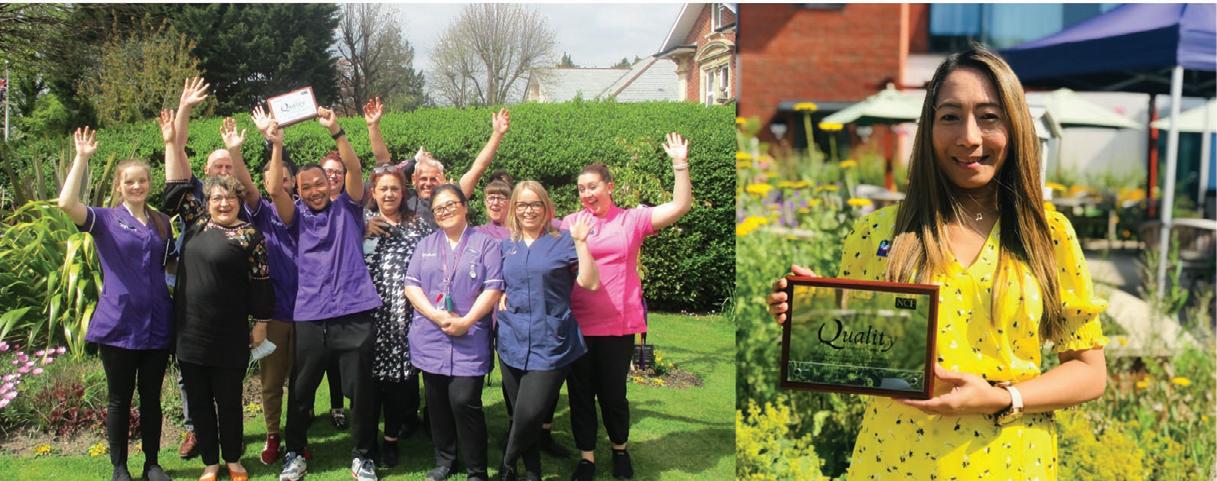
The Gold Standards Framework (GSF) Charity equips your team with the skills, confidence, and compassion to deliver person-centred care that truly makes a difference.
For a limited time, the GSF Care Homes Training & Accreditation Programme is available at 50% off – now only £1,095 + VAT.
This affordable, high-impact training is designed for your whole organisation (offer expires October 2025).
GSF Accreditation is CQC-recognised, endorsed by leading care organisations, and more than 97% of accredited teams report better experiences for people and their families.
For more information, visit:
www.goldstandardsframework.org.uk / 020 7789 3740
Future-proof your care. Empower your workforce.
See the advert below for more information.

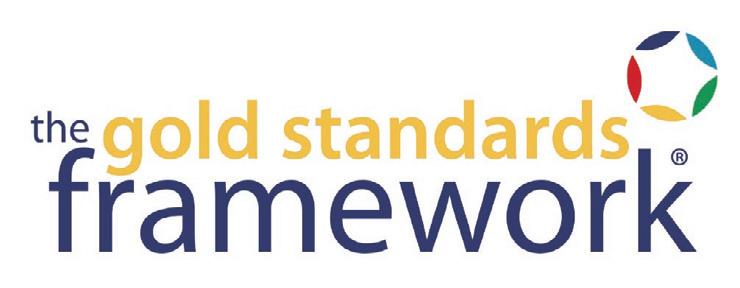



Once again, the quintessentially great British tradition of afternoon tea has been celebrated by care homes across the UK, bringing joy, community spirit, and delicious treats to residents nationwide.
We are absolutely delighted to announce that The Gables Rest Home in Kidderminster is the winner of this year's Afternoon Tea Week competition!
Manager Kim Northwood said: "We are absolutely thrilled to receive this recognition”. Our fantastic activities were designed by Jess Southall, our fabulous Activity Coordinator, who remarkably was married on Saturday 23rd August but still found time to organise all of this wonderful celebration for our residents. The week was a tremendous success, with residents actively participating by helping to make cakes and enjoying a full programme of food, singing, dancing, and quizzes throughout Afternoon Tea Week”
Congratulations to the entire team at The Gables Rest Home for their outstanding dedication to creating such memorable experiences for their residents.

Nursing Home,
At Swarthdale organisers planned afternoon tea for residents together with a singer to come and entertain them
There was also a raffle and tombola stall to add a little bit of extra interest to the day.
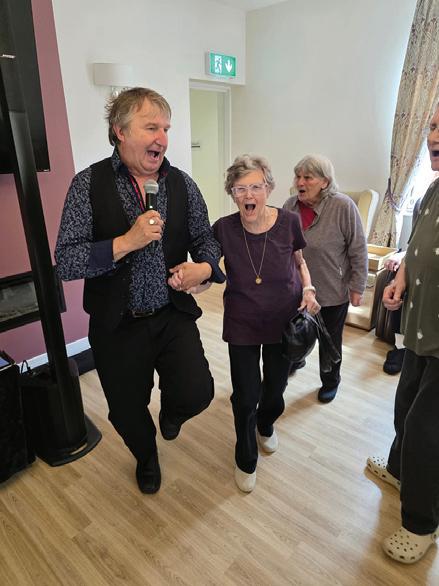
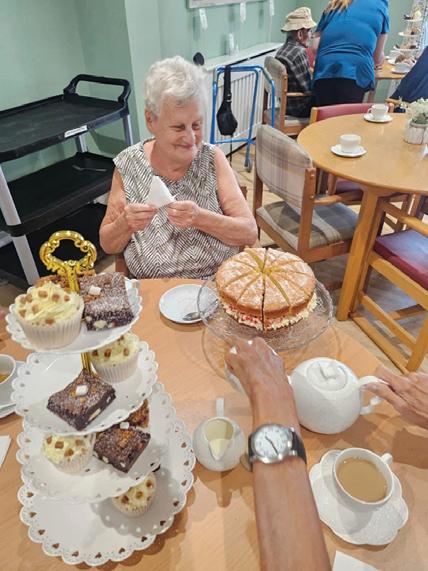
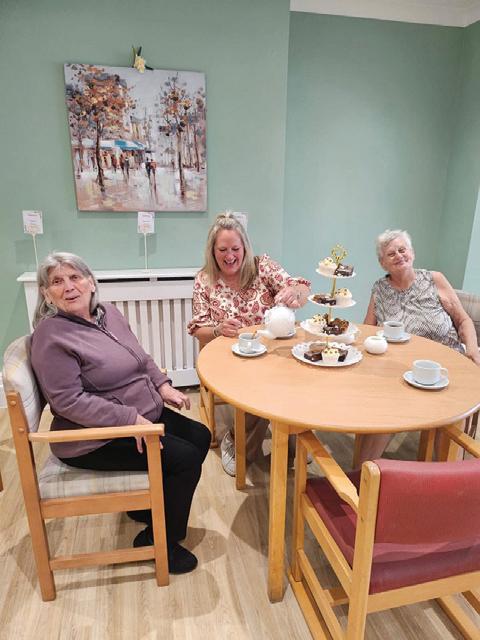
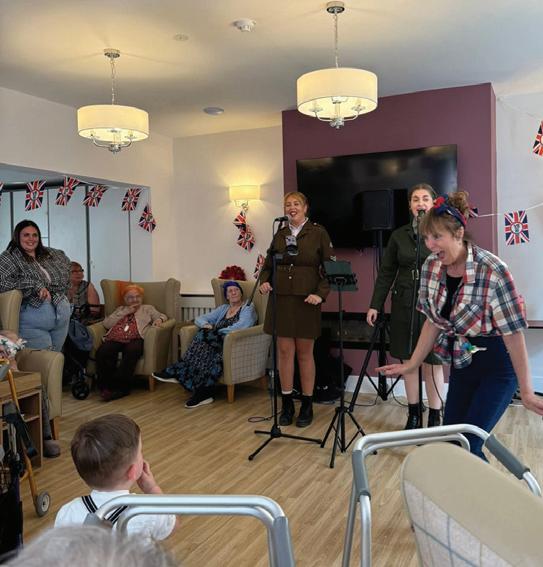
A SELECTION OF OUR OTHER ENTRANTS - MANY THANKS TO YOU ALL!
Residents At Orford House Answer The All Important Scone-Taneous Questions
At Orford House, the Coulsdon-based residential care home, the residents had a wonderful time celebrating Afternoon Tea Week and answering some very important, age old, tea related questions.
Whilst enjoying a scrumptious spread, Mary Bradley, the Activities Coordinator at Orford House, asked the residents a series of afternoon tea-orientated questions. “I put together 14 questions for the residents to answer and we had a lively voting session whilst indulging in a fantastic afternoon tea with all the traditional accompaniments.
“We had quite a debate over whether or not the tea should be poured into the cup before the milk, and whether dunking was appropriate!"
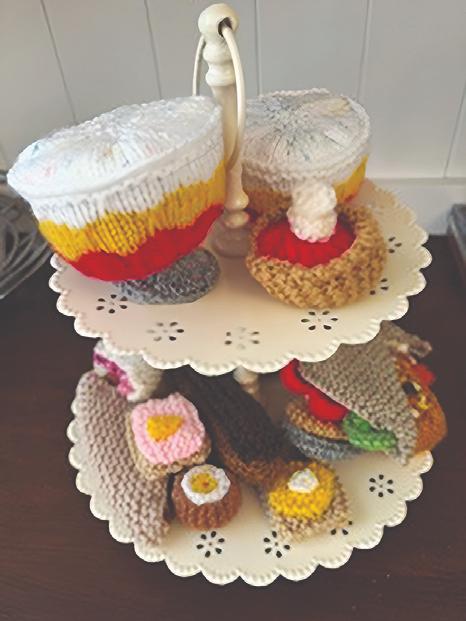
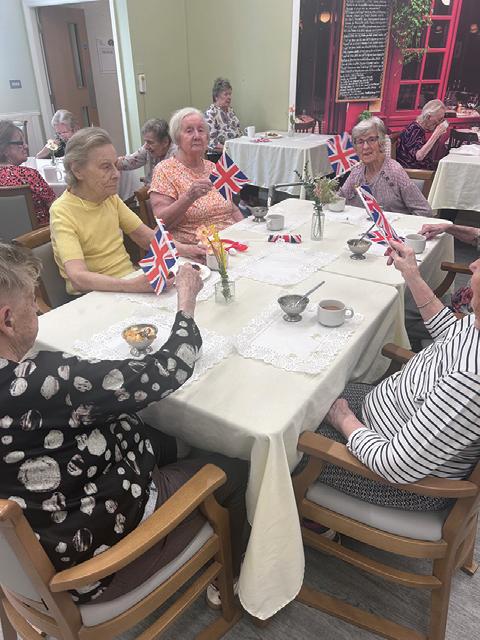
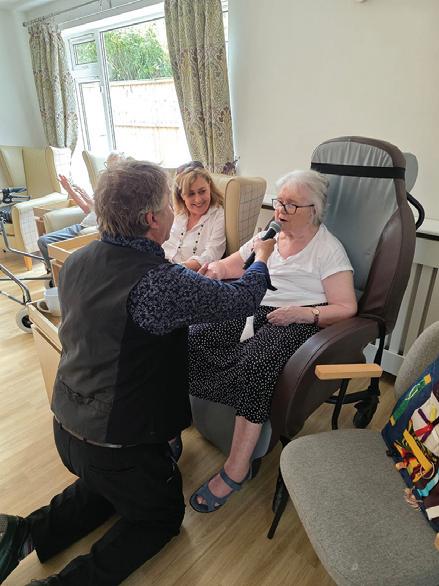

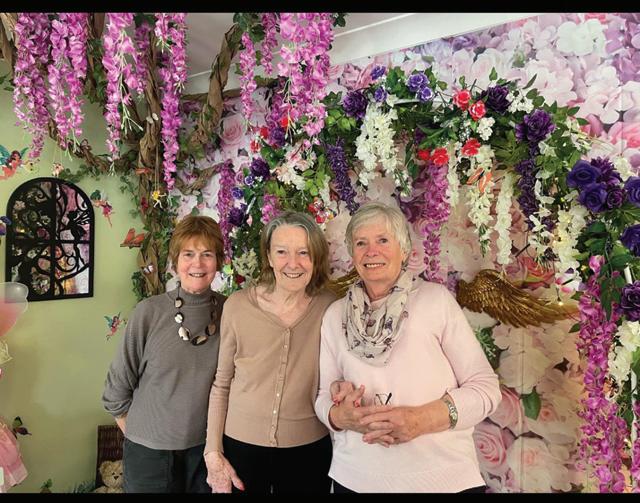
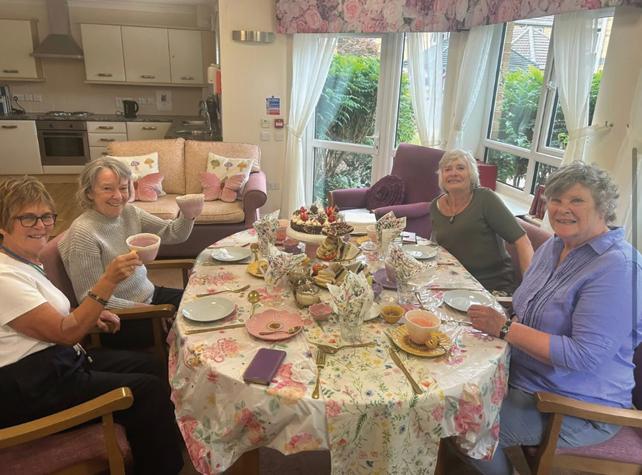


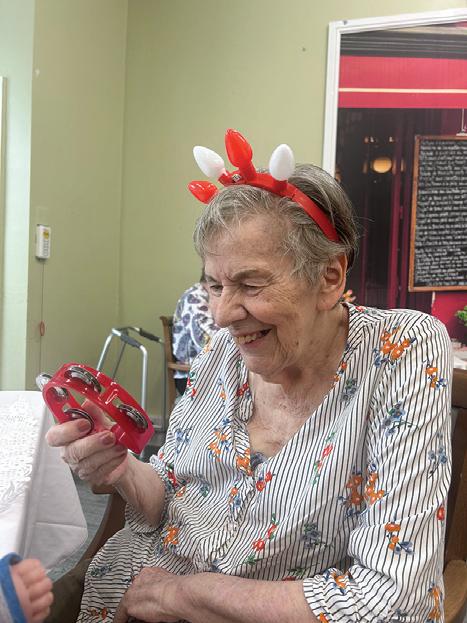
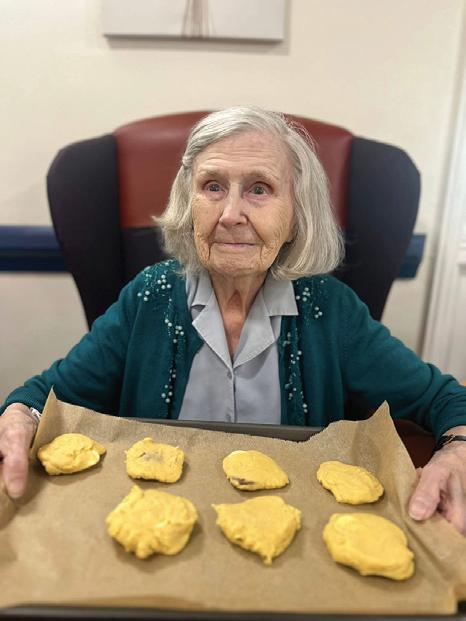
and
have been organised every Sunday during August, which both their wonderful residents and loving family members enjoy attending.
Family members and residents have that special time to relax and enjoy a hot drink with one another. During the week sweet treats are made with the residents to serve at the event, including banana bread, flapjacks, shortbread, fairy cakes,
and much more.

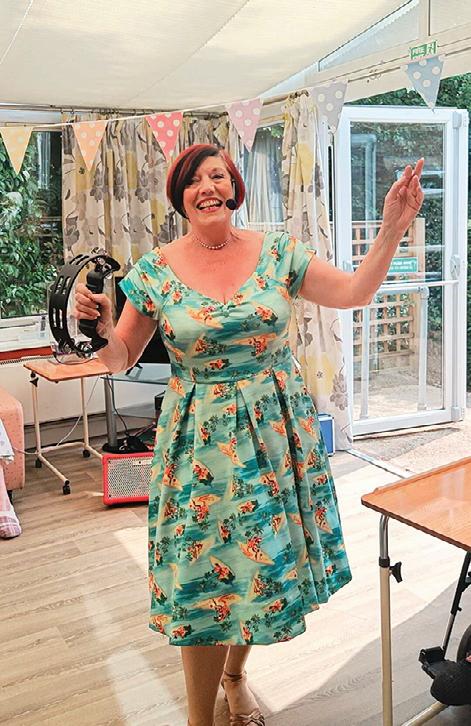
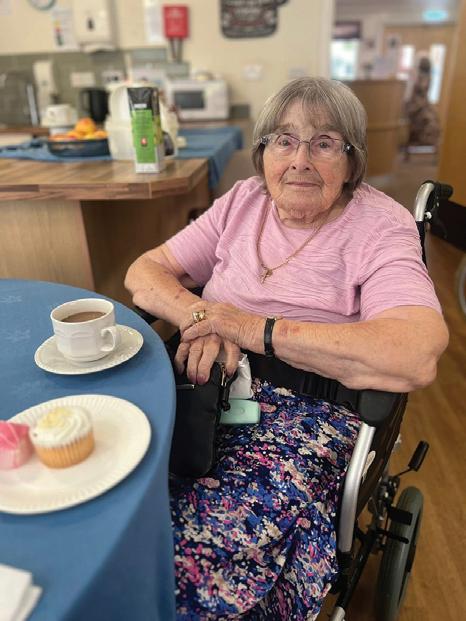
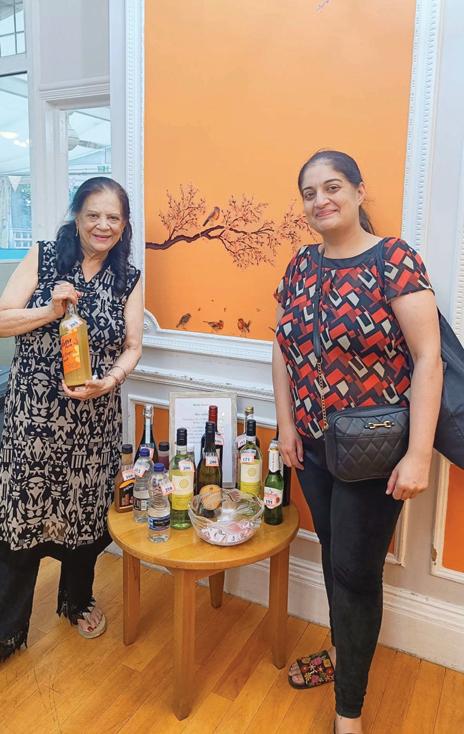

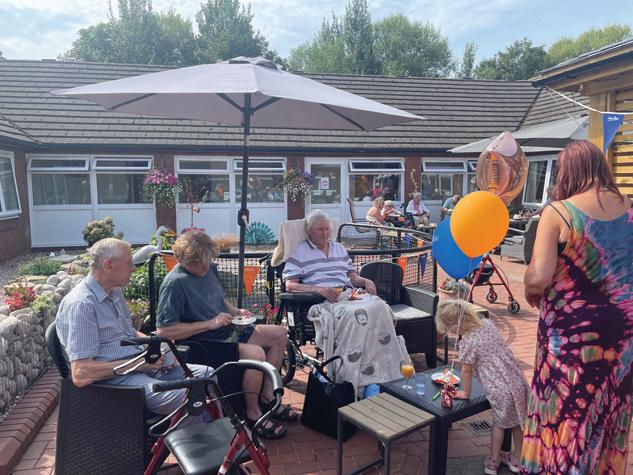
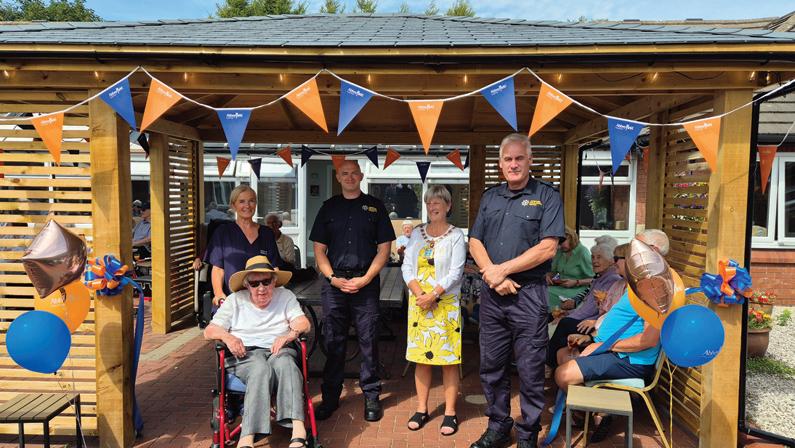
Mayor Opens Halcyon House’s Courtyard and Gardening Club Area at celebratory Afternoon Tea Event
Residents, staff, family, friends and community supporters gathered at Halcyon House to celebrate the opening of a newly improved courtyard and new residents’ gardening club area. The new areas were officially opened by Madam Mayor Councillor June Burns at a special afternoon tea event to coincide with Afternoon Tea Week.
Halcyon House’s manager, AnnMarie Roberts, said, “What better way to celebrate these exciting new parts of the residents’ home than a strawberry tea with Pimm’s and lemonade, surrounded by family, friends, the Halcyon House Trust Committee and supporters from our local community. We were also delighted that our special guest, Madam Mayor, was able to attend and cut the ribbon.”
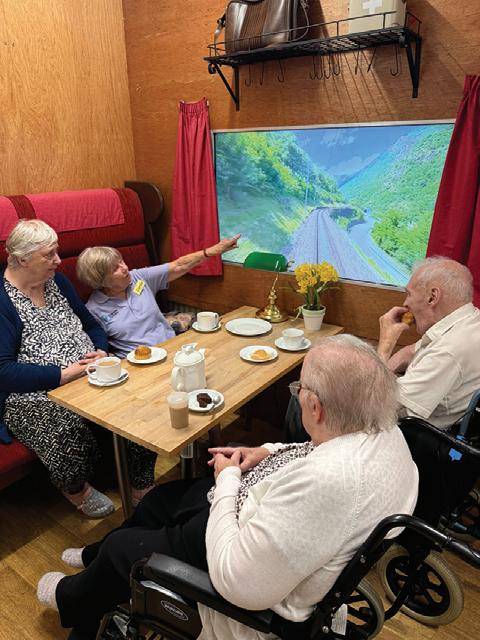
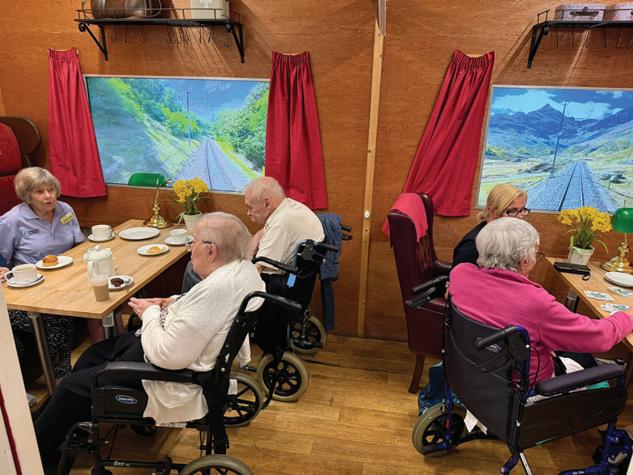
Residents at Clacton-on-Sea nursing and dementia care home Edensor Care Centre, tucked into a delightful afternoon tea in the centre's indoor 1960s-style carriage train for Afternoon Tea Week. The atmosphere was filled with charm and nostalgia as Train passengers settled into the vintage seats, surrounded by décor reminiscent of a bygone era. Taking a trip down memory lane, residents and guests enjoyed the charming and nostalgia-filled atmosphere, settling into vintage seats surrounded by décor reminiscent of a bygone era as a gentle hum of conversation filled the room.
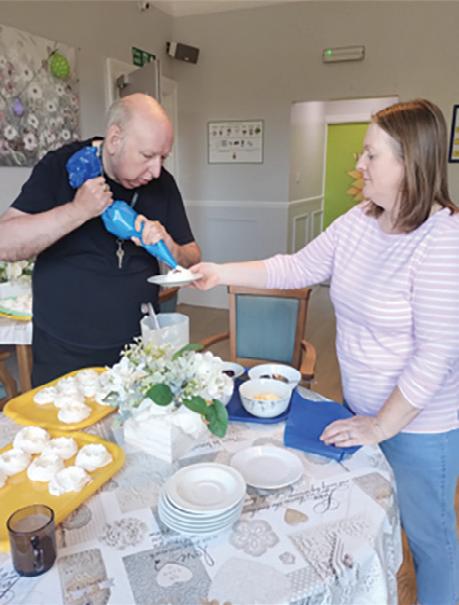
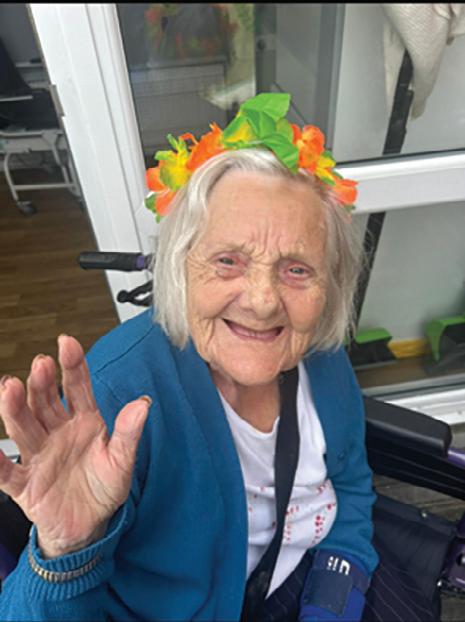

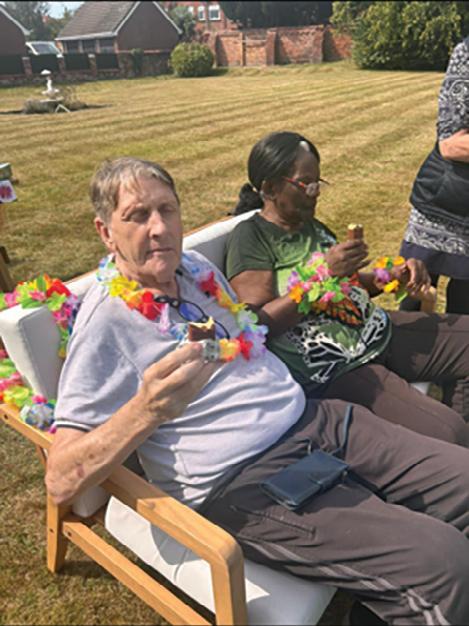
Duckyls Farm Care Home, East Grinstead, West Sussex.
Residents at West Sussex residential care home for adults with learning disabilities, autism and acquired brain injuries, Duckyls Farm, enjoyed Afternoon Tea Week in a number of ways. Resident Simon chose to mark the occasion by making himself a hot cup of tea and using it as an opportunity to enjoy some me-time and a peaceful moment outdoors. Surrounded by nature, Simon enjoyed his cuppa over a couple of good books.

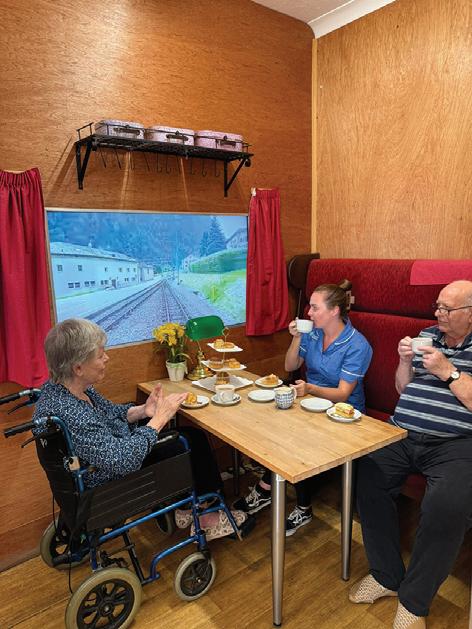



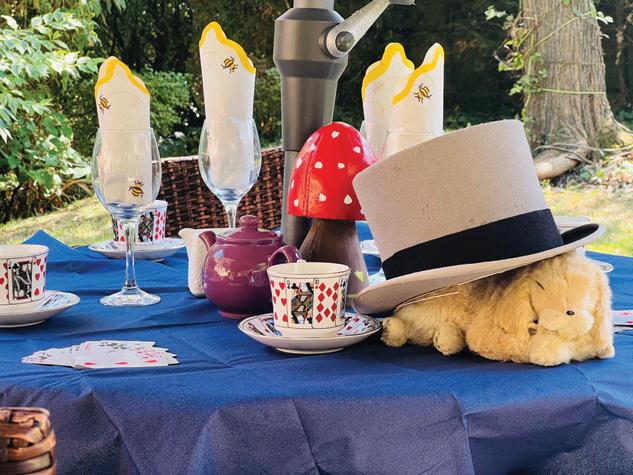
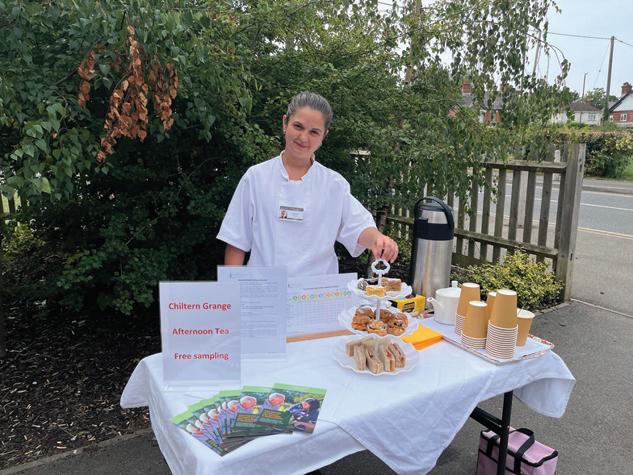
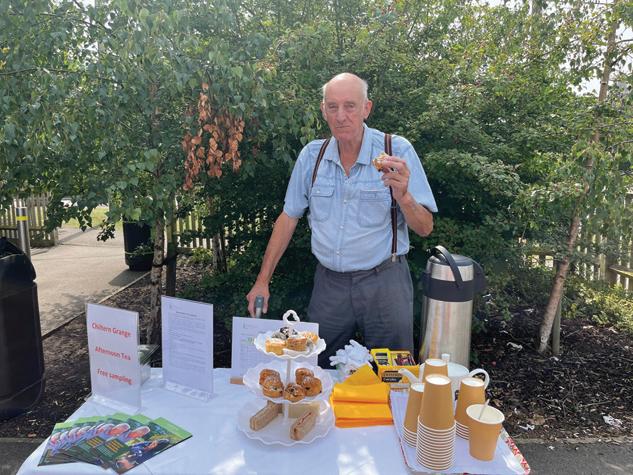
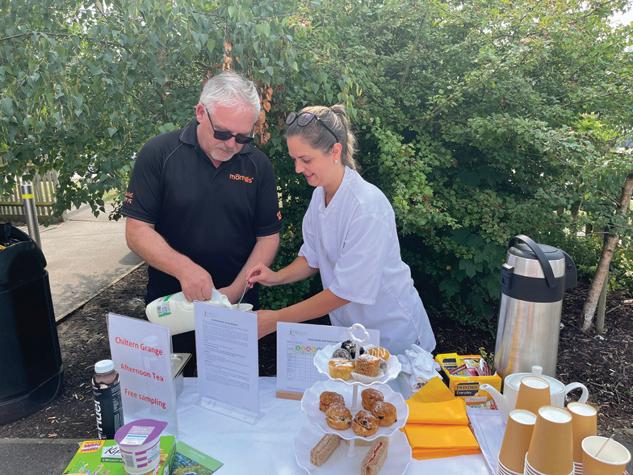
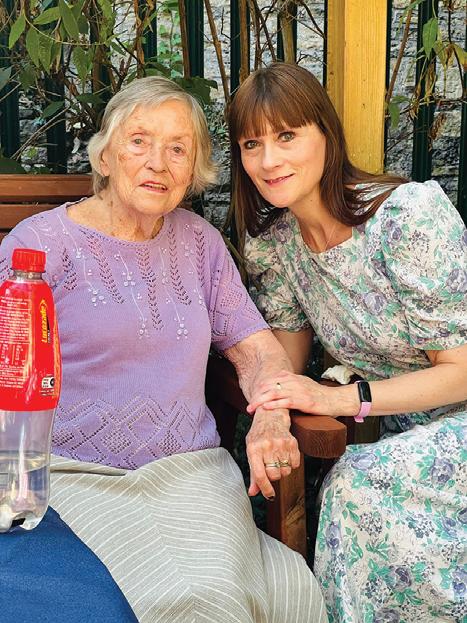

Catherine House Care Home, Frome
The garden at Catherine House Care Home in Frome, Somerset, was the setting for a summer tea party. Residents, fondly referred to as family members, gathered together with their relatives and team members under gazebos decorated with bunting, while jazz pianist Henry Sampson played and sang a selection of songs.
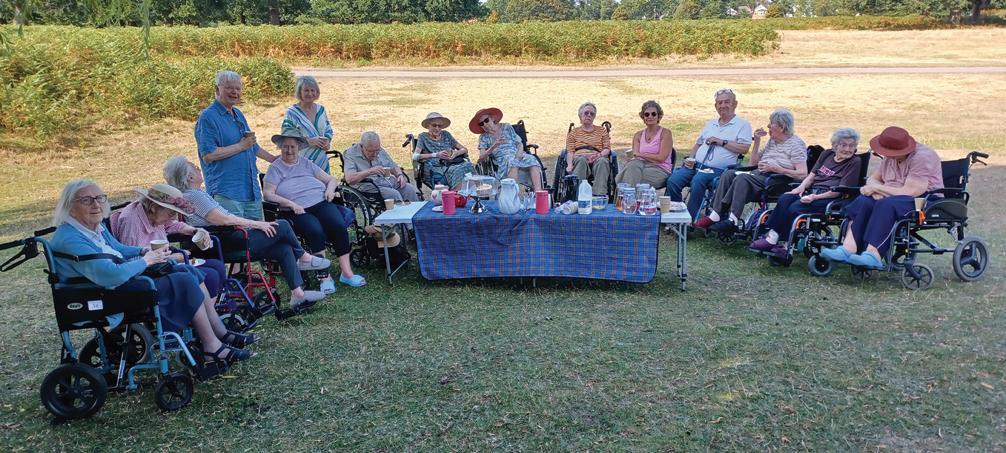

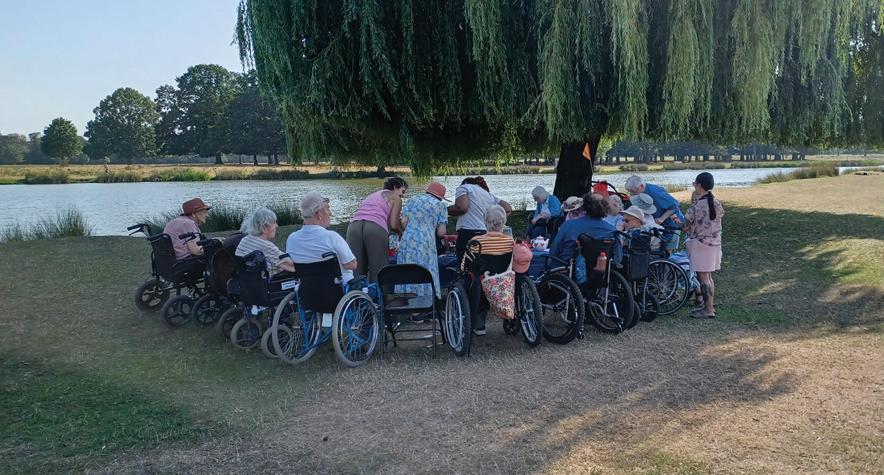

Residents of Stokenchurch were treated to a surprise serving of sandwiches, scones and cake this week, as Chiltern Grange Care Home, part of Porthaven Care Homes, celebrated Afternoon Tea Week. Gabriela Luca, head chef at Porthaven’s Chiltern Grange Care Home, said: “There’s something so simple but special about sharing food with others; it brings people together in a way nothing else can. Afternoon Tea Week was the perfect excuse to step outside our doors and meet more of our neighbours in the local community.
Celebrating Afternoon Tea Week at Deer Park View
At Deer Park View Care Centre, we believe that life’s sweetest moments are often the simplest – and nothing says “simple pleasures” quite like a cup of tea in good company. This Afternoon Tea Week, we decided to make the most of the glorious summer weather by taking our celebration outdoors.
With the help of some family members and our wonderful staff, we traded the comfort of our lounge for the beauty of our favourite spot in Bushy Park – right on our doorstep here in Teddington. It’s a place that never fails to lift our spirits, and this time it gave us exactly what we were hoping for: tea with a view.
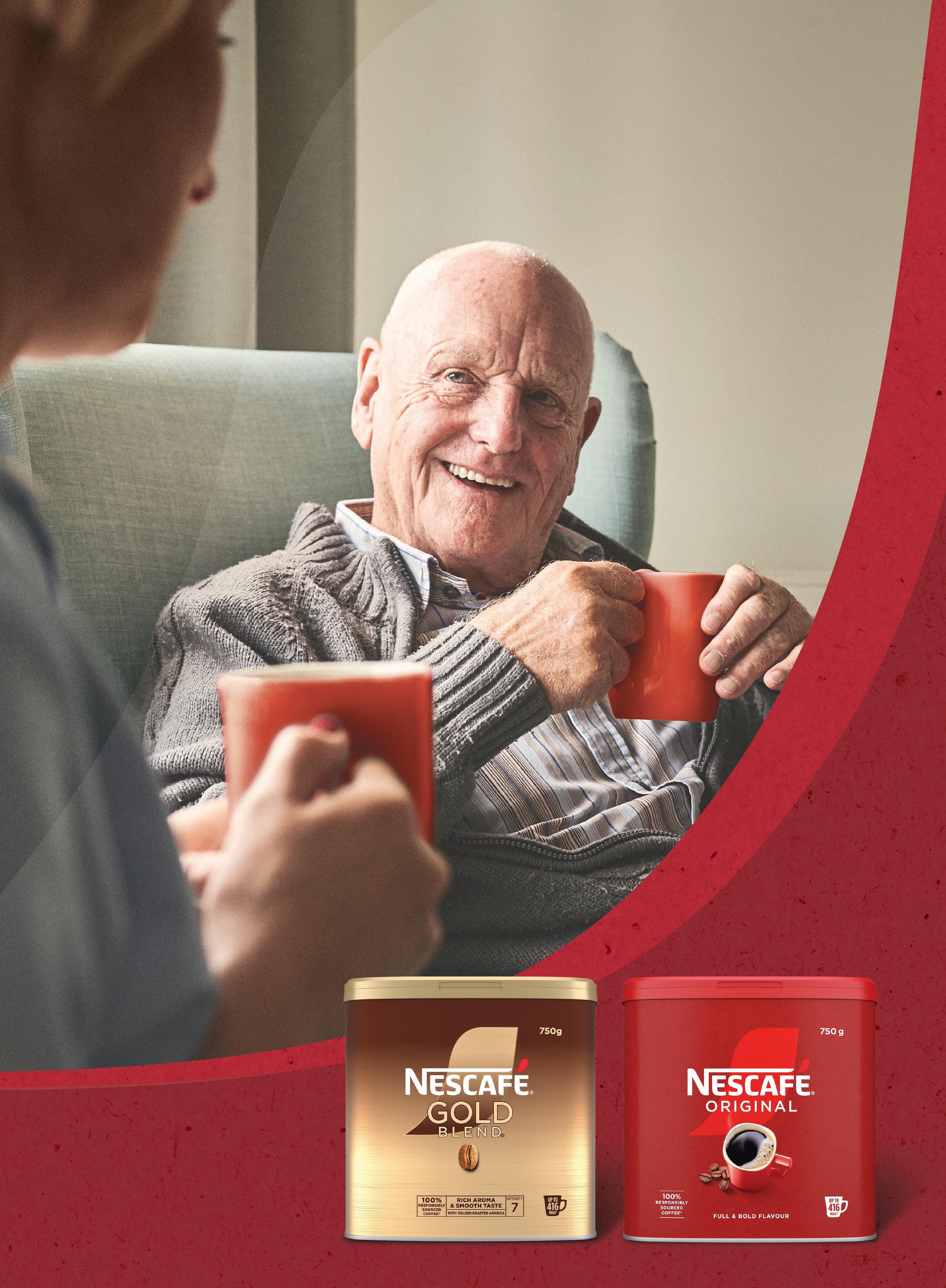

The opening of a therapeutic sensory room at an Aberdeenshire care home has produced sensational outcomes for residents and their families.
One year after the launch of a sensory space at St Modans Care Home in Fraserburgh, a new report has highlighted a range of benefits, including improved relaxation and better family interactions for residents living with dementia or brain injuries.
The sensory room was also referenced in the latest report from the Care Inspectorate – the regulatory body supporting quality care standards across Scotland – following an unannounced inspection in July. St Modans received the highest possible rating from the Care Inspectorate, achieving grade 6 across the board – signifying an ‘excellent’ sectorleading performance for the setting and the support of people’s wellbeing.
St Modans provides care across three specialist areas – acquired brain injury (ABI), nursing, and dementia care – and the sensory room, opened in 2024, was designed as a safe and soothing therapeutic space for residents in the 65-bed home.
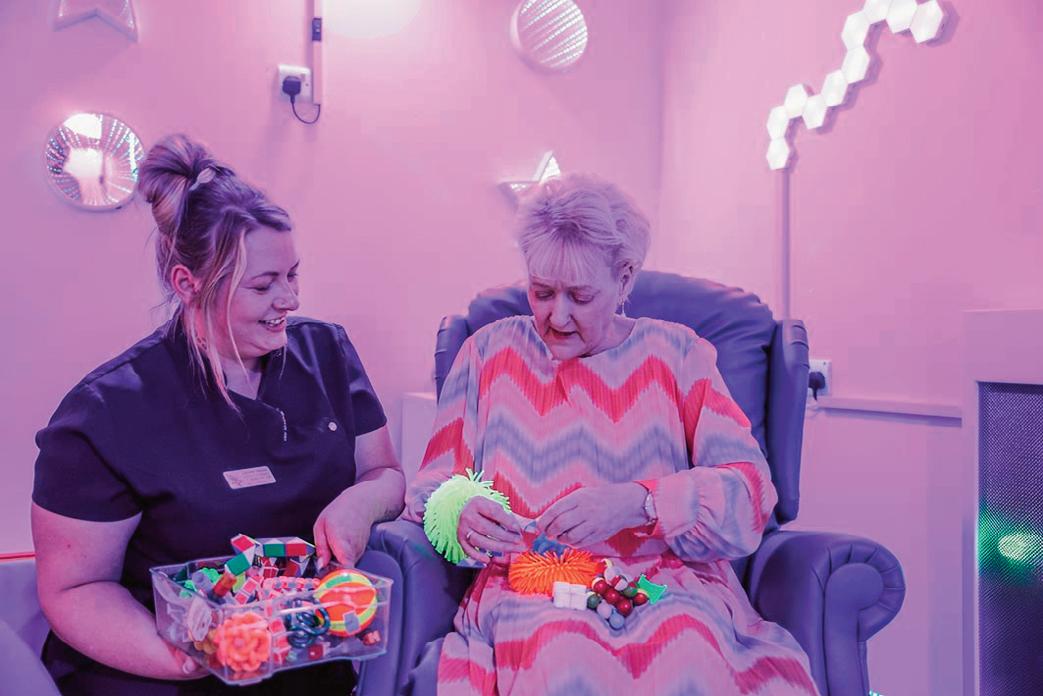
Activities in the room include colour and music therapy, using equipment such as colour-changing lighting, an infinity tunnel, and an interactive bubble tube. In the words of one resident, “It’s the most magical room, very relaxing and makes you feel miles away from the busy room. I enjoy having my music on and watching all the lights change colours.”
The report on the first year of the room analysed case studies of individuals with dementia, ABI and/or reduced cognitive functions. These showed positive impacts from a variety of uses, including one-to-one activity, ad hoc sessions to alleviate agitation or anxiety, and visits with families.
As well as documenting positive effects on residents’ ability to relax, de-stress, sleep and engage with family, the study showed a correlation between the use of the room and the reduced need for medication.
One family member commented, “I feel that the sensory room has been a great addition to St Modans
and that my mum really benefits from having use of it. Mum can have fluctuations in her mood at times and during these instances the sensory room enables her to have a calm, quiet environment to engage in.
“Whilst on visits with her grandson, she also likes to spend time in there with him too. He enjoys his time spent in there with grandma and thinks it’s a ‘super cool room too’.”
Pamela Geddes, Care Home Manager at St Modans Care Home said: “It’s been wonderful to see the way our residents and families have benefited from the sensory room over the past year. All of us have seen for ourselves the calmness or joy or intergenerational connections that people experience from the light, sound, textures and movement in this amazing room, and we’re delighted to have these benefits confirmed by this new detailed analysis. I’m very grateful to the staff, families and local community whose fundraising activity made it possible.
“Achieving such a positive response from the Care Inspectorate has been amazing. It was brilliant to read the incredible feedback regarding the team, and we’re thrilled to see the sensory room getting the recognition it deserves.”
Meallmore CEO, Cillian Hennessey added: “The state-of-the-art sensory room at St Modan’s is an exciting example of how we go the extra mile on care at Meallmore. As the results of this new report illustrate, we have created a space with clear benefits for the clinical, emotional and social wellbeing of our residents and their families, which is a first in its area.”
“Setting up this new approach to care involved a meticulous planning process for our team at St Modans, from gaining buy-in from colleagues, residents and relatives, to producing personalised plans for anyone who uses the space. I’m proud of what their creativity and dedication have achieved in this important new model for our sector.”
Mark, who is supported to live at Warwick House in Paignton, Devon, part of Salutem Care and Education, has been awarded the prestigious Cup of Courage from Mencap in recognition of his remarkable resilience, determination, and positive spirit over the past year.
Mark has faced profound personal challenges, including the loss of his mother and the emotional impact of his father moving away. Despite these difficulties, Mark, who has Autism and a learning disability, has demonstrated an unwavering commitment to personal growth. He continues to work hard, achieving meaningful progress towards his personal goals.
Mark has shown outstanding strength, determination, and an inspiring ability to adapt to change. His positive attitude and dedication to self-improvement make him a shining example of courage for the entire Salutem community.
The award was presented by the Chair of Mencap, Dame Carolyn Fairbairn at a spe-

cial ceremony attended by residents and staff, with the entire Warwick House team proudly supporting Mark on his special day.
Mencap is a leading UK charity dedicated to supporting people with a learning disability, along with their families and carers. Founded in 1946, Mencap works to improve quality of life, promote equal opportunities, and challenge stigma through advocacy, education, and direct services. The organisation provides personalised support in areas such as housing, employment, health, and community participation, aiming to ensure that everyone with a learning disability is valued and included in society.
Caroline Wallace, registered manager at Warwick House, said: "Mark’s journey this past year has been a testament to his resilience and determination. We are incredibly proud of everything he has achieved and thrilled to see his efforts recognised with this award.”
Social care collaboration and use of an “outside the box” approach to recycling of community equipment means daily life is now safe for teenager Rhianna Maness.
The 17 year-old has complex disabilities, including seizures and being non-verbal. Her parents Melissa and Darren themselves have health issues.
Getting Rhianna up and down stairs was becoming a risk, but the conventional solutionsa stairlift or through-floor lift- were not viable.
Rhianna’s Occupational Therapist at Calderdale and Huddersfield NHS Trust found out about AAT’s Sella stairclimber, and reached out for assessment support. It worked!
A Sella was available at Medequip’s stores for Kirklees’ Council, as were some of the accessories needed to ensure Rhianna was sat secure and properly supported as she needed. As a result, using the re-issue capability of the stairclimber, Rhianna’s carers can now transfer her up and down the stairs without risk to her or themselves. Should Rhianna have a seizure en route, the stairclimbing process can be safely paused for as long as required.
“It’s been a real life saver,” says Melissa. “Rhianna’s face shows that she enjoys it, and it’s

made the world of difference to us all.
“It was a bit scarey to start with at the top of the stairs, but AAT trained us fully in how to use the stairclimber safely. If Rhianna has a seizure, we just stop until it’s passed and we can resume.”
Adds Gareth Brown of AAT, “Rhianna requires significant support to sit. We had most of the accessories she needed in stores @ Kirklees, so there was only need to purchase a couple of small additions. Her access to all levels of the family home has been made safe, including assessment, equipment and training, for around £1000- a fraction of the cost of other solutions, had they been viable.”
AAT’s re-issue facility for stairclimbers is unique within the sector. It means that- where appropriate- necessary, reasonable and practical changes can be made to make stairs safe for someone with reduced mobility, for <£1000/ £650 pa(1). There are no structural alterations nor permanent restriction of the stairs for other members of the household.
Full details can be found here:
www.aatgb.com/taking-steps-to-reduce-adaptation-delay-for-650-recycle/
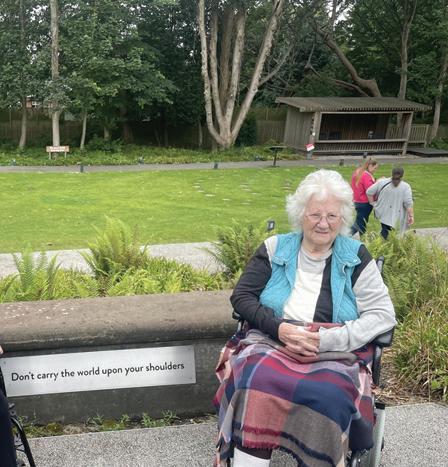
Residents at HC-One’s Roby House Care Home in Huyton, Liverpool, have been immersing themselves in the music, history, and legacy of one of Liverpool’s most iconic bands – The Beatles. To celebrate their learning, the group took a special trip to the legendary Strawberry Field. The day began with a delicious lunch at the Imagine More Café, where residents enjoyed good food, warm conversation, and plenty of Beatles-themed nostalgia. Following lunch, everyone took the opportunity to explore the beautiful grounds, soaking up the peaceful atmosphere and retracing the steps of history.
A highlight of the trip was seeing the famous red gates of Strawberry
Field, immortalised by John Lennon’s 1967 hit Strawberry Fields Forever. The visit brought smiles, memories, and conversation, sparking stories from residents about their own youth during the height of Beatlemania.
Ruth Baggs, Home Manager at HC-One’s Roby House Care Home, said:
“It was wonderful to see our residents enjoying such a special day out. Many of them have fond memories of The Beatles, and visiting Strawberry Field gave them a chance to connect with those memories and each other. We believe activities like this are so important for wellbeing, happiness, and community spirit.”
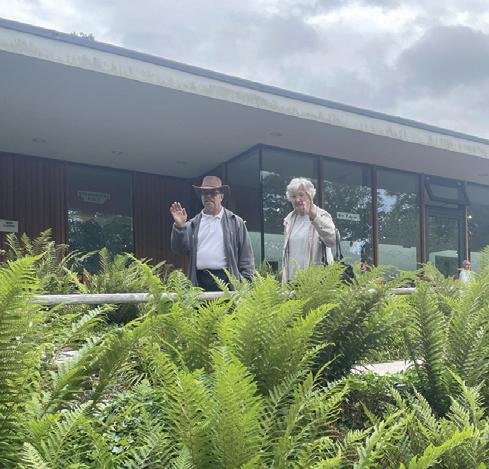
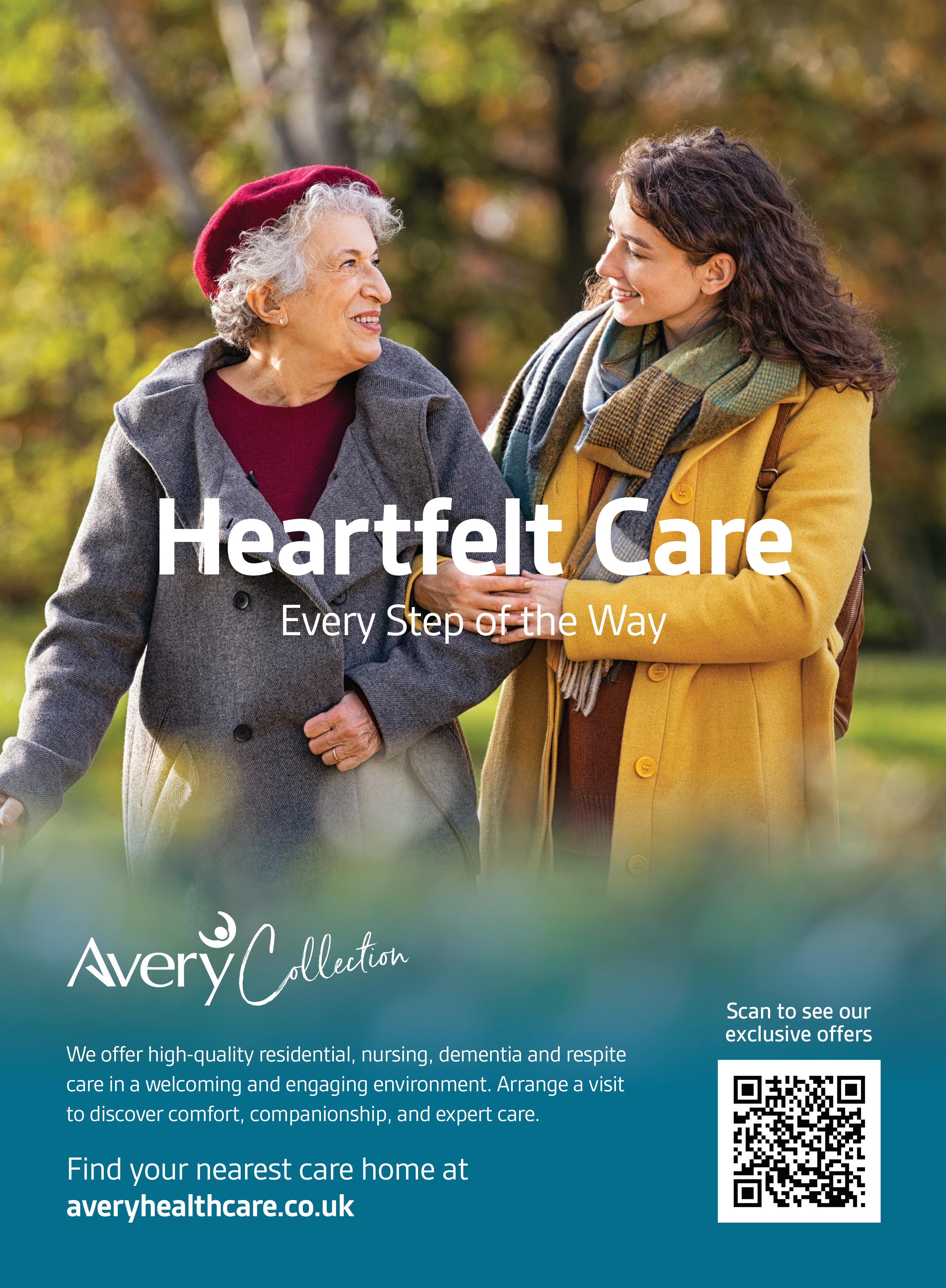

Running a care home is about far more than managing paperwork or staff rotas. It’s about leadership, compassion, quick decision-making, and, above all, presence. Being the manager Craigielea Care Home in Gateshead (www.craigieleacare.co.uk) means each day begins before most people have started their first cup of tea and no two days are the same.
My morning starts at 8 a.m. sharp, often earlier if the home has had a particularly busy night. The very first task is always a debrief with the night staff. Even though it is swift, it is a vital handover, even if there were no major incidents, the smallest change in a resident’s behaviour or sleep pattern can be important and I will review the night handover notes. We need to stay on top of everything.
After this quick but thorough exchange, the day gets into full swing with a round of paperwork, catching up on reports from the night shift or, if it’s Monday, reviewing records from the weekend. Time is of the essence, but efficiency is key.
Shortly after, it’s time for the daily meeting, a core routine that sets the tone for the entire day. All available staff gather to share updates on residents, discuss staffing issues, raise concerns, or flag anything that might impact the day ahead. Staff organization and communication underpin the smooth running of any care setting, and here at Craigielea it is no exception. Whether it’s welcoming new admissions, supporting staff through personal challenges, or implementing care plans, a large part of my day revolves around making sure the team is supported and fully informed of all goings on, however big or small. I really enjoy the daily meetings; it’s always a highlight of my day. I like to always have an overview of what’s going on and it’s always nice to get time with the staff.
Another essential part of my day is speaking with families. Whether it's giving updates, discussing changes in care, or answering questions, a big chunk of time is spent on the phone or in person with loved ones. Tailored care planning is a critical area where attention to detail can change lives. Each resident has a personalised care plan that adapts to their evolving needs whether medical, emotional, or social and it’s not just about clinical needs, it’s about their routines, preferences, fears, and what makes residents happy. Even small details like knowing how someone takes their tea can make a huge difference to their quality of life.
As can just being there for loved ones and relatives during what can be a very turbulent time for a family. They need compassion and to know their loved one is safe and happy.
By mid-morning, I do my walk-around of the home. This isn’t just a visual check to make sure everything is in its place, it’s a chance to talk with residents, staff, and occasionally visiting family members. It’s also my favourite part of the day because there is something so special about seeing everyone face-to-face. You get a real sense of the atmosphere and get an overarching view of everything that is going on which you can’t get from just sitting in the office.
This kind of visibility and approachability is vital. I have an open-door policy meaning anyone, staff or resident, can pop in for a conversation at any time. Whether it’s a quick query about shift cover or a resident wanting to chat about their day, my office is always an open and it’s that openness that is crucial to how I work as a manager.
Afternoons are usually a mix of administrative tasks updating care plans, managing rotas, responding to emails and more meetings. Whether it’s staff one-to-ones, multi-disciplinary reviews, or inspections, my calendar is rarely empty, and it definitely keeps me busy. The demands on care home managers are high, but the structure of the day helps keep everything on track. Organisation is everything. We need systems, yes, but it’s also about adaptability. If a resident has a fall, or a staff member calls in sick, priorities shift instantly, and you need to be able to balance it all efficiently.
Teamwork is fundamental to managing those shifting priorities. At Craigielea, the team blends well, which I believe is the key to our successes as a home and our performance in external review.
No matter what role someone plays, we all contribute to the same mission giving residents the best care and quality of life possible. And new starters are welcomed just the same. Everyone’s input matters and nobody is left out. Throughout the day, dignity and respect remain the highest importance, and we all work to ensure every interaction is compassionate and person-centred.
There’s a lot of responsibility that comes with the job, there’s no doubt about that but when a resident recognises your face, or smiles when you say hello, it reminds you why we do what we do. You’re part of their home.
As the day winds down, I can start planning for the evening shift updating handovers, checking logs, and making sure night staff are fully briefed. Even though my official hours might end at 4:30pm, the role doesn’t switch off.
Being a Care Home Manager requires wearing many hats: leader, listener, planner, mediator, caregiver, and problem-solver. But more than anything, it’s about being there. Showing up, staying present, and keeping the care home running as a safe, warm, and welcoming place for residents and staff alike.
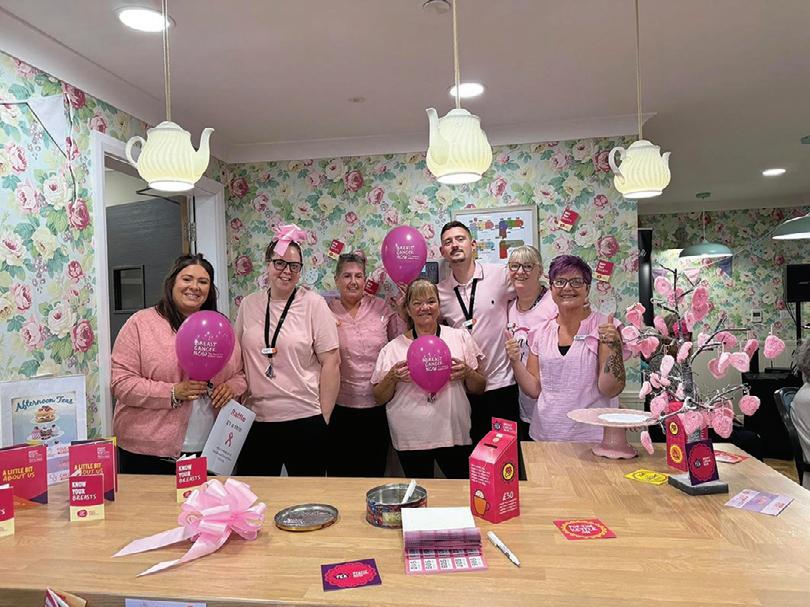
Residents, loved ones, and members of the local community came together at HC-One’s Littleton Lodge Care Home in Hednesford, Cannock, to enjoy a very special Afternoon Tea in aid of Breast Cancer Now.
Held in the home’s welcoming tearoom, the event featured a delicious spread of freshly prepared sandwiches and cakes, created by the home’s talented kitchen team. A particular highlight was the scones, baked the day before by residents during their baking group, which were served with cream and jam and proved to be a firm favourite.
Entertainment was provided by singer Becky Gee, who delighted guests with classic hits from the 1950s through to the 1980s, creating a joyful and nostalgic atmosphere that had everyone smiling and
singing along.
The fundraising afternoon also included a raffle, drawn on Wednesday 27th August, which helped to raise a fantastic total of £138.05 for Breast Cancer Now.
Jayne Booth, HC-One’s Lifestyle Manager at Littleton Lodge Care Home, said:
“It was wonderful to see our residents, their loved ones, and members of the local community all come together for such an important cause. The atmosphere was incredible, and we are so proud to support Breast Cancer Now in this way.”
The event was made possible thanks to the efforts of Jayne Booth, Lifestyle Manager; Morgan Munroe, Front of House Manager; and Emma Parton, Kitchen Assistant, along with the wider care team who helped to ensure the afternoon was a great success.
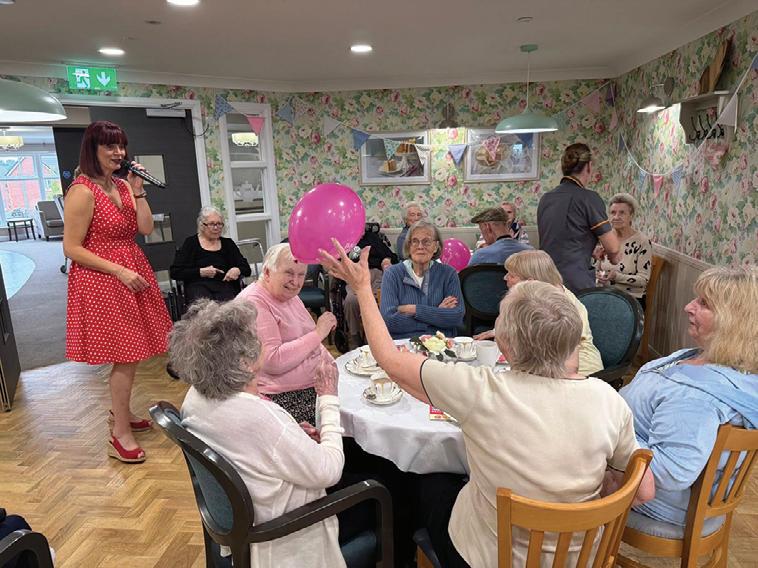
A family-run West Devon care home has joined the elite few UK social care settings to have adopted of the acclaimed ‘Butterfly Approach’ – establishing an exemplary dementia care culture where people can thrive.
West View Care Home, in Bere Alston, recently completed the significant 18-month transformation to provide a more personcentred care model and elevate its “excellent” offering even further.
Following rigorous monthly support with the team at the 28-bed home, along with those who live there, West View received accreditation in the prestigious Butterfly Approach from Meaningful Care Matters. The care and culture consultancy group specialise in focusing on the development of resilient, relationship-centred cultures of care shaped by the people living and working within them.
The Butterfly Approach has a meticulous focus on creating a culture where people are ‘free to be me’. It values emotional intelligence and the core belief that everyone has a unique story that has meaning and matters. It also encourages care providers to put the focus back on the people they care for and their emotions, by engaging in the reality of people’s lived experience in the ‘here and now’.
The transformation at West View included splitting the home into two separate living areas – Wren and Robin – where people with earlyonset dementia or without dementia live together and people who experience more complex needs or later stage dementia live together. This fundamental change to a small household approach has enabled holistic care to flourish, where emotions-based care is balanced with clinical care best practice.
The home has also been decorated with vibrant colours and murals to bring warmth, with items of interest all around representing each individual and their life story – what Meaningful Care Matters calls the
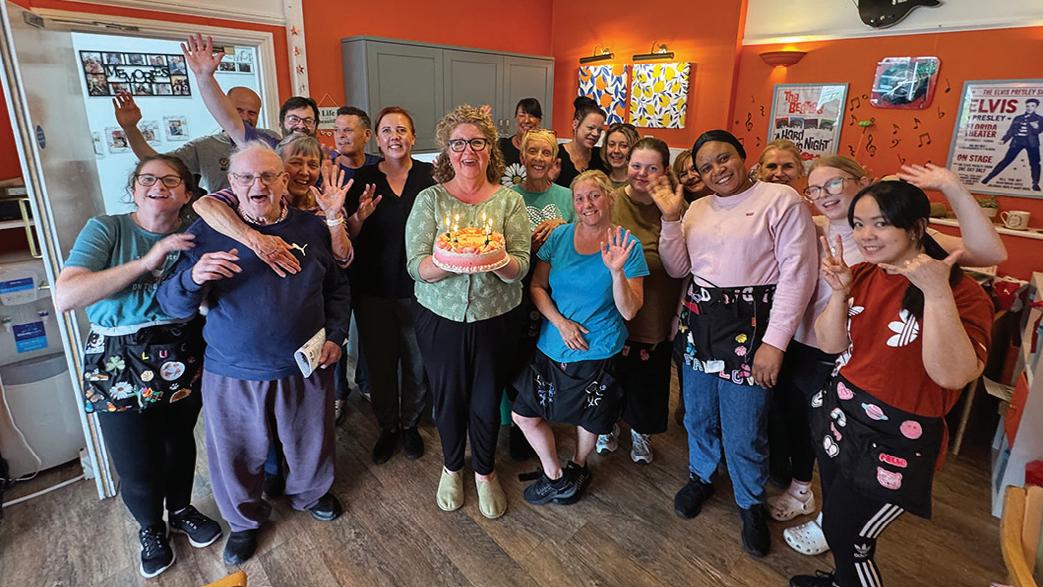
‘stuff of life’, creating a family atmosphere.
Diane Kehoe, Manager at West View Care Home, said: “As a secondgeneration family-run business, we always aspire to create a stimulating, engaging and enjoyable environment – and the Butterfly Approach has provided us with the platform to offer that around the clock. I was already familiar with the approach and saw the potential West View had in achieving it. The transformation was not easy, and we had a few challenges along the way, but the rewards upon completion have made it so worthwhile.
“We believed in the whole process from the outset and the staff embraced it – showing so much patience and kindness. They treat the residents like family, enjoying life together with lots of laughter and fun. When you step into the home now you can really sense the buzz of the place, and the level of care is both phenomenal and heartwarm-
ing.”
The overall findings from Meaningful Care Matters during a final audit last month identified the home as “excellent”, offering a highly engaged service that prioritises meaningful moments and where emotion-focused care is consistently seen, felt and heard in interactions with people. It also reported that individuality and self-expression are encouraged within the home, allowing people to freely be themselves.
Peter Bewert, Managing Director of Meaningful Care Matters, said: “West View has transformed into a truly wonderful home. The team have clearly embraced the desire to change and have achieved amazing results, being guided and supported by Diane. They have also lifted their CQC rating from ‘Requires Improvement’ to ‘Good’ and are aiming over the course of the year to reach ‘Outstanding’. They have also been supported by the local service improvements team, who were so impressed at the transformation that they plan to use West View as a role model for other homes.”
Peter continued: “The journey has been incredible. From what we would call a ‘traditional’ care home, West View has come alive and now has a genuine feeling of family, togetherness, love and purpose for the people living there.”
The home aims to continue elevating its high standard of care, with ambitious plans to be acknowledged and approved by the National Dementia Care Accreditation Scheme. It also plans to achieve the ‘gold standard’ for end-of-life care by the Gold Standards Framework.
For more information on West View Care Home, please visit https://westviewcarehome.co.uk/.
For more information on Meaningful Care Matters and its cultural transformation models, visit https://meaningfulcarematters.com/.
Introducing assisted dying safely will require major planning, infrastructure, and investment or it will become yet another service people struggle to access, experts warn.
Exploring 15 jurisdictions across Australia, Austria, Belgium, Canada, the Netherlands, New Zealand, Spain, Switzerland and the US, the report takes the most detailed look to date at what the UK can learn from other countries as it takes steps to legalise and set up assisted dying services. The report warns that safe and effective implementation will require substantial planning, infrastructure and funding – all scarce in today’s NHS, amid staff cuts, reorganisation, tight finances, and patchy access to end-oflife care.
Drawing on data, statistics and over 250 evidence sources, the report establishes, for the first time, a picture of the characteristics of people who access assisted dying. The analysis reveals that even in countries where having a terminal diagnosis is not a requirement a large majority are terminally ill – 79% in Belgium and 96% in Canada. Between 55% – 80% of those seeking an assisted death had a cancer diagnosis and the majority (75%) were receiving palliative care. The median age for people who had an assisted death was between 69 and 80.
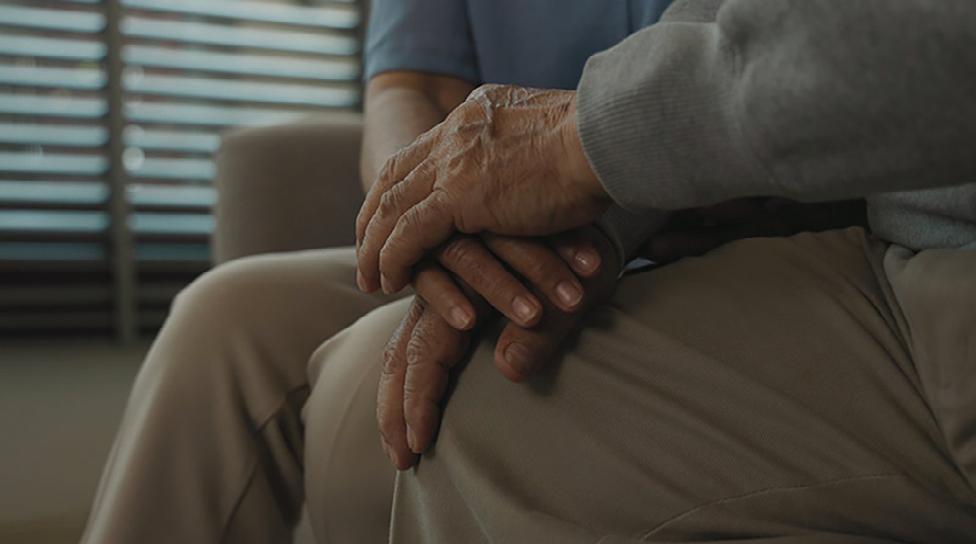
assisted dying.
RECOMMENDATION:The Voluntary Assisted Dying Commissioner for England and Wales will need to be given the funding it needs for a secretariat, data access, and expert support. Policymakers should set adequate funding and resourcing for review panels too.
• Across all jurisdictions that have legalised assisted dying, the number of cases has increased over time, even when eligibility criteria have not changed – for example in Oregon the proportion of deaths which were assisted has risen from 0.2% in 2010 to 0.86% in 2023. In Australia around half of requests do not end in an assisted death, but every request still needs to be processed and the individual and family supported.
RECOMMENDATION:Officials will need to plan for ongoing investment and increasing demand rather than treating infrastructure development as a one-time implementation cost and funding levels as static.
• Staff involved in end-of-life care are often those most likely to be delivering assisted dying services, with general practitioners most often directly involved and pharmacists playing a large role in several countries, including Belgium and the Netherlands. Yet a relatively small number of clinicians are directly involved in delivering assisted dying. In 2023/24 in Victoria, Australia, 10 doctors either coordinated or consulted on 55% of all cases.
KEY LESSONS AND RECOMMENDATIONS FROM INTERNATIONAL EVIDENCE INCLUDE:
• Many countries are concerned about inequalities in access to and barriers to assisted dying across different groups. With access to end-of-life care in England already varying by factors such as deprivation and ethnicity, similar challenges are likely here.
RECOMMENDATION: Policymakers should develop local strategies that reflect population needs, and consider innovations like assisted dying care navigators used in parts of Canada and Australia
• Costs wider than delivering individual assisted deaths need to be considered, to cover new services required: for example, in Australia pharmacy services were extended and in Belgium a public information service was established. Yet the UK government’s impact assessment limits funding estimates to direct costs (for example for staff directly involved).
RECOMMENDATION: Officials will need to make funding available that goes beyond the direct costs, to include resources for regulation, data infrastructure, service redesign, workforce training, and oversight bodies.
• Most countries had to establish entirely new systems, specialist staff, training, oversight bodies, public guidance and data reporting. In Australia, for example, states relied on intensive 18-month implementation periods. In Belgium, underfunding of the oversight mechanism created problems with capacity to deliver
RECOMMENDATION:National contracts for general practice and pharmacy may need to be amended to take account of reimbursement for assisted dying.
• The report also finds that countries with devolved or regional implementation – Canada and Spain – have needed to develop processes to ensure consistency across different provinces and to share best practice. The authors argue that, with assisted dying laws being debated separately in Scotland, the UK should carefully consider Canada and Spain’s experiences and establish which aspects of the service should be locally tailored in devolved regions, and which parts must be standardised.
Nuffield Trust Deputy Director of Research, Sarah Scobie said: “With assisted dying remaining a contested issue, and our health and care systems struggling under immense pressure, implementing a new service won’t be straightforward. However, other countries provide valuable lessons which can help policy makers to make good choices as the Bills legalising assisted dying continue their parliamentary journeys.
“Much of the UK debate around assisted dying so far has focused on avoiding a ‘slippery slope’ towards misuse of the service, but many people in other countries face barriers to accessing assisted dying. If parliamentarians choose to legalise it, they will need to get the balance right and worry not just about people who have an assisted death when they shouldn’t, but also about people who can’t when they are meant to be eligible.”
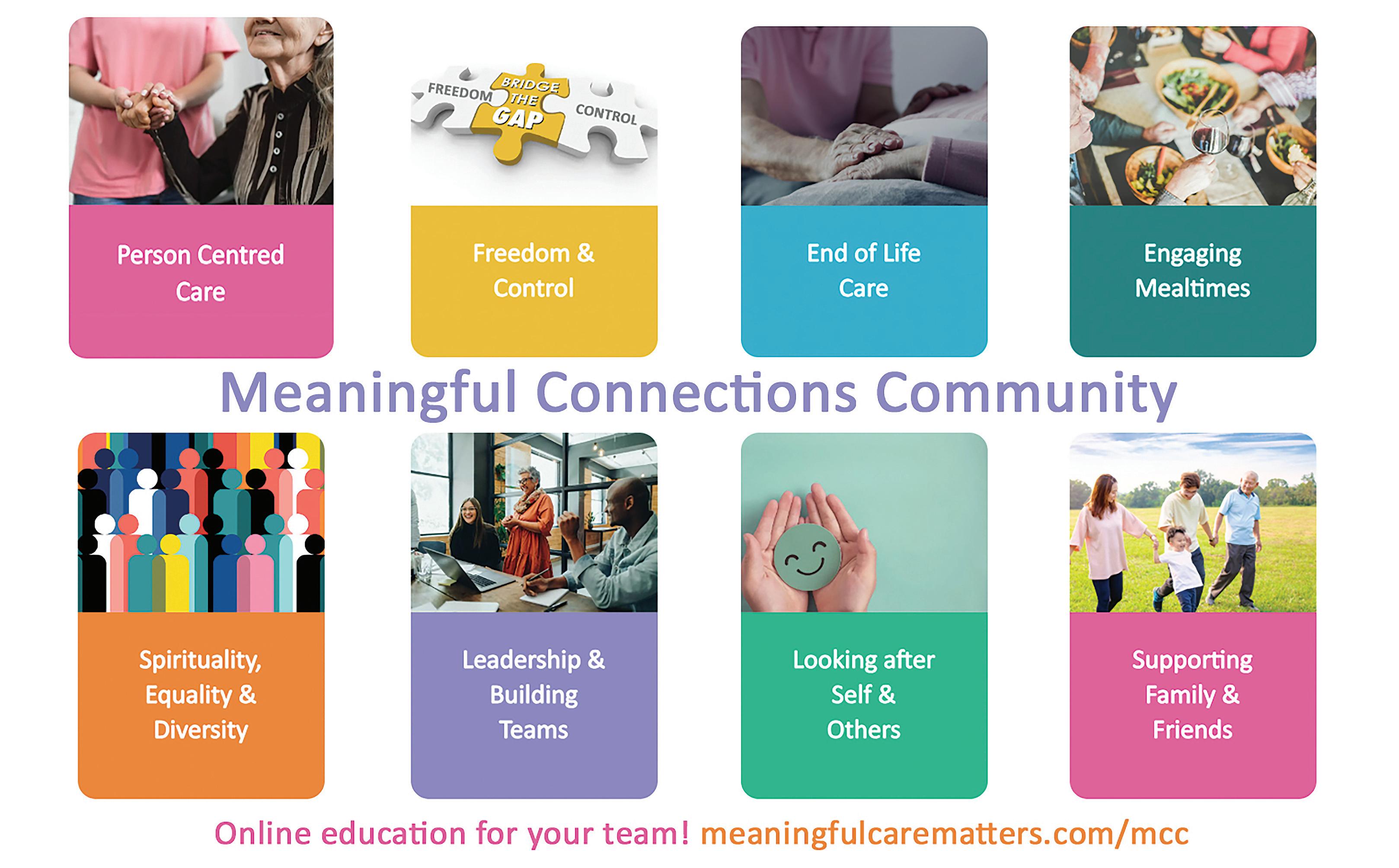
A significant proportion of routine NHS mental health care is being outsourced to private companies, charities and other independent providers, concludes a new study.
The analysis, conducted by health and care charity The King’s Fund, finds that more than 1 in 4 NHS mental health inpatient beds is being outsourced.
Independent sector inpatient beds purchased by the NHS are still free at the point of use for patients, and there is a long and effective history of NHS services procuring independent sector capacity during periods of high demand and for specialist mental health care.
However, researchers at The King’s Fund conclude that use of independent sector beds has gone far beyond acting as valuable surge capacity and instead has become a core part of mental health provision in England.
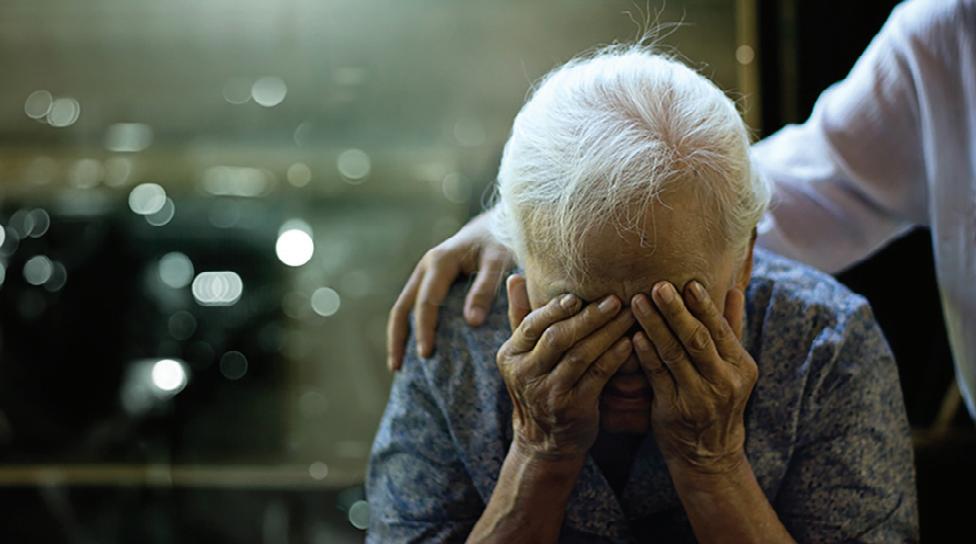
The research is the first of its kind to show the scale and type of NHS mental health care that the public are receiving from non-NHS providers. The authors of the study examined data on the number of inpatient beds available for NHS care from independent sector providers of mental health care registered with the Care Quality Commission.
The analysis shows that between January to March 2025, NHS trusts reported almost 18,000 available mental health beds, 89.5% of which were occupied. However, this new analysis finds that in March 2025 there were an additional 7,195 beds available in the independent sector for use by the NHS. This equates to approximately 29% of NHS-funded mental health bed capacity in England being provided by the independent sector.
The increased use of independent sector beds comes with a financial cost and could lead to longer lengths of stay for patients. But the researchers say the NHS has little choice – using the independent sector appears to be the only option when demand outstrips NHS inpatient capacity.
The new research also looks at the types of mental health care that the independent sector provides for NHS patients. It finds that independent providers are providing an increasing proportion of care for people
with the most complex needs and who are the most vulnerable, including those with a diagnosis of a personality disorder, and people with learning disabilities and autism.
Researchers at The King’s Fund argue this raises concerns about transparency, as the independent sector is not subject to the same level of data collection as NHS providers. They warn it could leave national and local leaders with less information about patient experience and patient outcomes, including for some people with the most complex needs. There are several factors that may be driving the lack of NHS mental health bed capacity. This includes many years of low capital investment in mental health buildings and equipment, as well as insufficient support in the community to keep people well.
Siva Anandaciva, Director of Policy at The King’s Fund, said: ‘Independent sector health care capacity acts as an important release valve for many NHS services when they face periods of high demand. It would make no sense to leave private beds empty when the NHS could purchase spare capacity and patients still receive care free at the point of use.”
‘However, our analysis reveals that there has been a significant increase in the share of NHS mental health inpatient care being outsourced to independent providers. Far beyond acting as valuable surge capacity, the NHS has become reliant on the independent sector for delivery of routine mental health care. This exposes the health service to greater risk of higher costs, could leave patients facing longer stays in hospital, and means the public has less transparent data about the quality of services.”
‘For the NHS to be sustainable in the long term, there needs to be far more focus on providing care in the community that keeps people well. Traditionally, the mental health sector has made great progress in delivering community-based care. However, some patients with greater or more complex mental health needs may need inpatient care, and the NHS must do all it can to treat people in the appropriate setting for their health needs.’

At New Copford Place, the Colchester-based residential care home run by charity Friends of the Elderly, the residents and care team put their Blue Suede Shoes to work as they celebrated the charity’s 120th Anniversary with a 1950s community ‘Bop’ party.
On Saturday 9th August, the care home went back in time to the ‘Rockin’ 50s’ and hosted a free ‘Jitterbugging’ party and summer BBQ. “To celebrate Friends of the Elderly’s landmark 120th Anniversary, we hosted a ‘hip’ and ‘groovy’, inclusive and accessible summer community event,” said Daniel Sabau, the Registered Manager at the care home.
“The residents thoroughly enjoyed the ‘cool’ event and loved chatting with our guests from the local community,” added Chelsey Leather, the care home’s Activities Coordinator. “The idea for the 1950s extravaganza came from one of our regular reminiscing sessions. The residents adore all genres of music, but the rock n’ roll songs of the 50s are a firm favourite, so they decided that was the theme of the event they wanted to go with.”
“To get the party started, the residents and care team pulled out all the stops and dressed in their
1950s best,” added Jaz McDade, New Copford Place’s Deputy Manager. “There were plenty of full, petticoated Poodle skirts, head scarves and smart, sharp suits. Everyone made a fantastic effort and looked so great, they would have easily fitted into a 1950s drive in or a classic American Soda Shop.”
Everyone at the care home’s 120th Anniversary spectacular enjoyed a delicious 1950s themed BBQ, refreshments, tasty deserts – including the summer staple of Strawberries and Cream – and cooling ice creams from the Whip It Like Webber ice cream van.
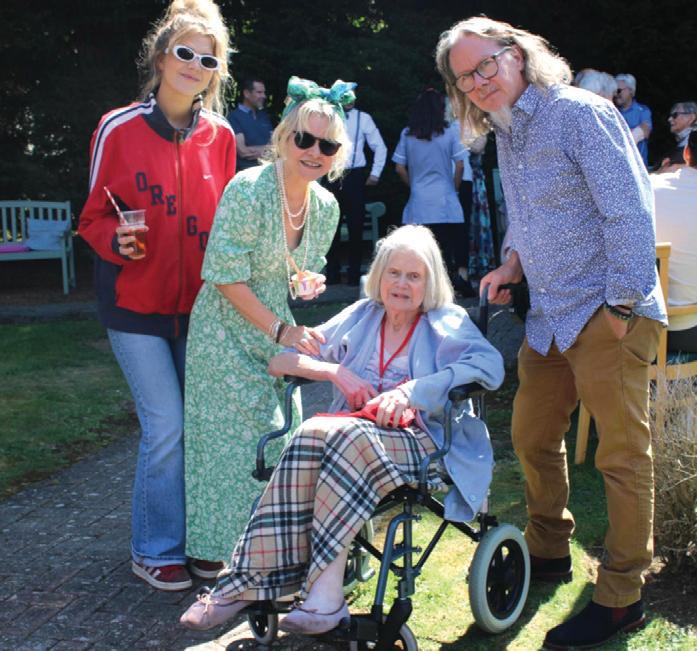
“We had the brilliant Natalie Edgoose and Les Simmons, who are better known as Cornflower Acoustic, performing a great selection of 1950s hits and chart toppers,” added Chelsey. “Cornflower Acoustic got everyone up and dancing to well-known and much loved 50s songs including Jailhouse Rock, Rock Around The Clock, Tutti Frutti and Rock-In Robin to name but a few.”
“We all had a wonderful time celebrating Friends of the Elderly’s 120th Anniversary and seeing old friends and welcoming new friends to New Copford Place. It really was a perfect day and a great chance for everyone at the care home to spend a lovely day together with their families, friends and members and our local community,” concluded Daniel
Care Inspections UK (CIUK), the UK’s only accredited inspection body for care homes, has launched a pay-as-you-go inspection service aimed at helping care homes improve quality, performance, risk management, and regulatory ratings in the face of the increasing costs affecting the social care sector.
To ease cash flow during rising National Insurance and wage pressures, the subscription service offers care homes structured, evidence-based support to navigate compliance challenges effectively. To add to this support, CIUK is offering up to £100 per month off all new subscriptions for twelve months for sign-ups in May 2025.
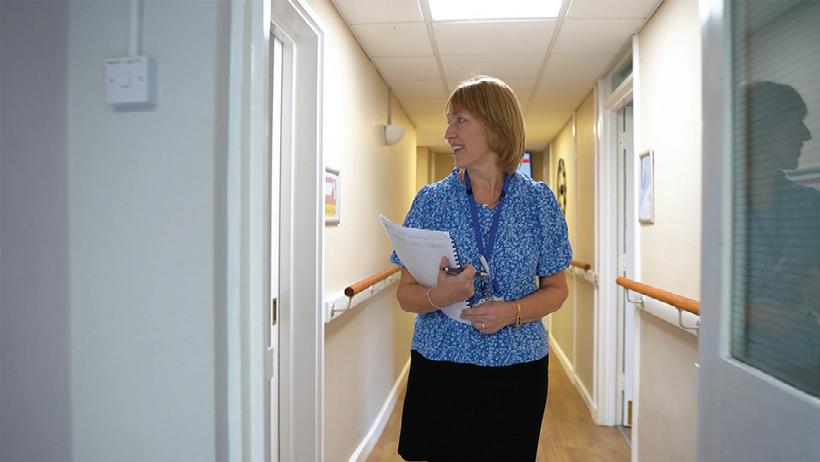
Designed to accommodate a range of operational needs and budgets, the three-tiered subscription model, Silver, Gold, and Platinum, offers varying levels of inspection frequency, expert guidance, and action plans tailored to each home’s requirements.
Under the Silver plan, care homes receive an annual comprehensive inspection carried out by experienced, accredited professionals. The resulting detailed report includes a full breakdown of every aspect of the care home, along with easy click-through access to relevant standards, regulations, and best practices. An action plan is provided to cover any non-conformances, with ongoing review and support to
ensure continuous progress. Homes that meet the required thresholds will be awarded a certification, signifying excellence in care provision. Additional benefits include advisory support before and after inspections, access to exclusive online events and forums for networking and best practice sharing, and participation in CIUK-led publicity initiatives designed to highlight high standards of care. CIUK also guarantees that, by fully implementing all aspects of the action plan, homes will see improvements in their regulatory ratings (CQC, CI, CIW, RQIA), giving providers added assurance that their investment in quality improvement will yield tangible results.
The Gold tier builds upon the Silver plan by offering additional regulatory and commissioning pre-inspection tools. This deeper level of service helps care providers prepare more effectively for formal inspections, giving them an edge in demonstrating compliance with industry standards. Gold members benefit from an in-depth assessment of their readiness for external regulatory visits, with tailored support that helps anticipate potential concerns and address them proactively. In addition to all the features of the Silver package, Gold subscribers receive a more comprehensive level of preparatory guidance, ensuring that homes meet and exceed industry expectations.
The Platinum package is the most comprehensive offering, providing
two inspections per year to ensure that care homes maintain consistently high standards throughout the year. Alongside the core benefits found in the Gold and Silver plans, Platinum members gain access to detailed analysis of inspection trends, helping care homes identify recurring issues and implement long-term solutions for sustained compliance and excellence. Additional advisory support is extended to Platinum members, ensuring they have ongoing expert guidance in regulatory matters, risk management, and quality improvement. This elite tier is particularly beneficial for larger care providers or those undergoing transitions, such as ownership changes or expansion, who require higher scrutiny and support.
Kevin Groombridge, chief executive at Care Inspections UK, said: “Our mission is to raise standards in the care sector by providing accessible, evidence-based support. This subscription model equips care homes with the tools to enhance compliance and deliver the highestquality care.
With rising costs placing additional pressure on the sector, for only a couple hundred pounds a month, our service offers expert guidance and regular inspections to help providers navigate these challenges. By following our structured action plan, care homes can guarantee an improvement in their regulatory ratings, ensuring better outcomes for both residents and staff.”
Visit www.careinspections.co.uk or see the advert on the facing page for details.
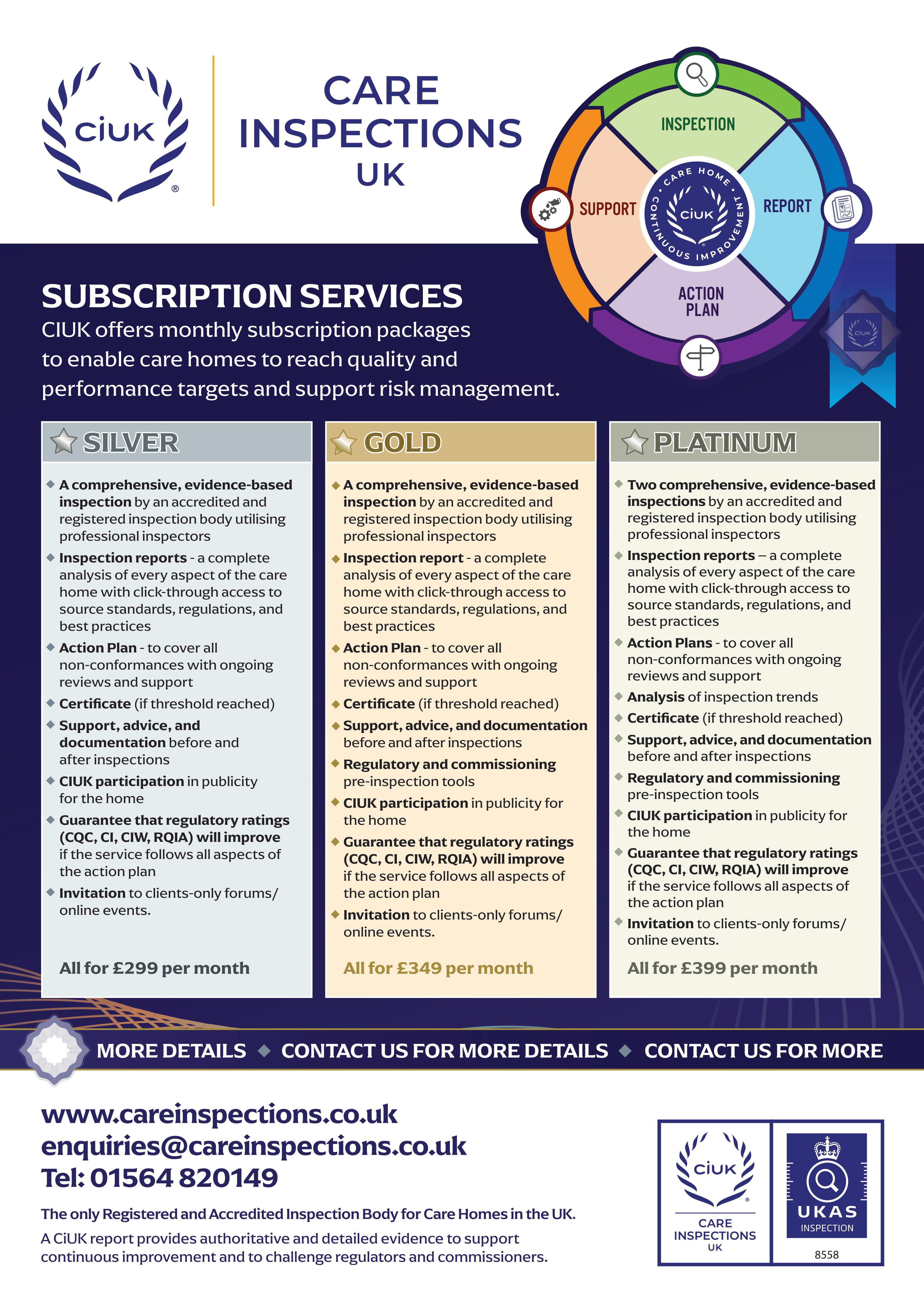
By Nikki Walker - CEO of QCS, an RLDatix Company
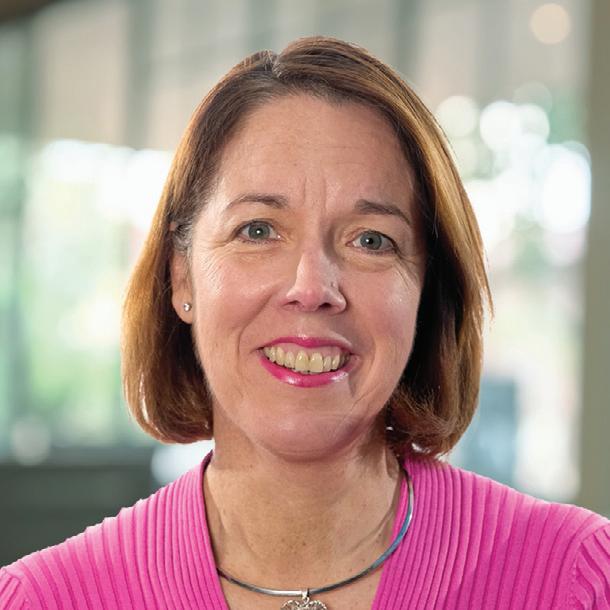
The social care sector stands at a turning point. With rising demand, increasing regulatory scrutiny, and ongoing staffing pressures, providers are being asked to do more, with less. In this environment, the way forward isn’t just about working harder it’s about working smarter.
One of the most transformative shifts on the horizon is the move towards truly integrated care systems: digital platforms that bring together compliance, care planning, risk management, training and quality monitoring in one unified place. More than just a convenience, this integration is fast becoming essential.
Currently, many providers juggle multiple systems or rely on a mix of digital tools and paper-based processes. Information is scattered. Teams duplicate effort. Vital data goes unnoticed.
The result? Frustration, inefficiency and risk.
A connected system solves this by creating a single source of truth, where care delivery and compliance are not just stored, but actively linked. Changes in a policy can automatically update associated risk assessments. Notes in a care plan can prompt training needs. Audit trails are clear and accessible. For staff, it means less time on admin. For managers, better visibility. For individuals receiving care, more consistent, safer support.
Adding artificial intelligence (AI) into the mix elevates this even further. AI can help spot patterns in care records, prompt best practice actions and reduce the burden of documentation. Crucially, AI isn’t there to replace human decision-making it’s there to support it. By giving frontline teams real-time, intelligent guidance, it helps ensure nothing is missed and quality remains high.
Of course, technology alone isn’t enough. These systems must be built on deep sector knowledge and shaped by those working in care. Platforms like QCS, for instance, combine expert-backed content with intelligent tools to provide not just data, but insight. It’s this fusion of trusted information and digital innovation that’s beginning to change how care is delivered.
But a connected future is about more than software. It’s a cultural shift towards a care environment that is proactive rather than reactive, where data drives improvement, and where teams feel confident and supported.
In a sector where every moment counts, integrated systems offer more than efficiency, they offer the chance to focus on what matters most: people. When technology works seamlessly in the background, it frees carers to do the deeply human work that technology can’t replicate.
The future of care is not just digital. It’s intelligent. And most importantly, it’s integrated.
To see how QCS are integrating care planning, rostering. audits, mock inspection, surveys, training, compliance, dementia care and more into one integrated system backed by AI technology, follow the link. www.qcs.co.uk/what-we-do/
Charity Dementia Adventure is launching a series of ‘Green Letter Day’ dementia-inclusive ‘adventures’ – such as walking cricket and flower arranging – to foster social inclusion and to improve mental health for those living with dementia and their family, friends and carers.
The experiences are all designed around the revitalising power of nature and the great outdoors, reflecting the ethos of Dementia Adventure, a charity dedicated to enhancing the lives of those affected by dementia through nature-based activities.
Green Letter Days will be run in partnership with well-established sports and leisure companies. Dementia Adventure bring dementia expertise, offering guidance, training, and volunteers to ensure activities are inclusive and accessible. The charity works alongside partners who are experts in their field, with each bringing the staff, equipment, and specialist knowledge needed to deliver high-quality experiences that are suitable and inclusive for people living with dementia.
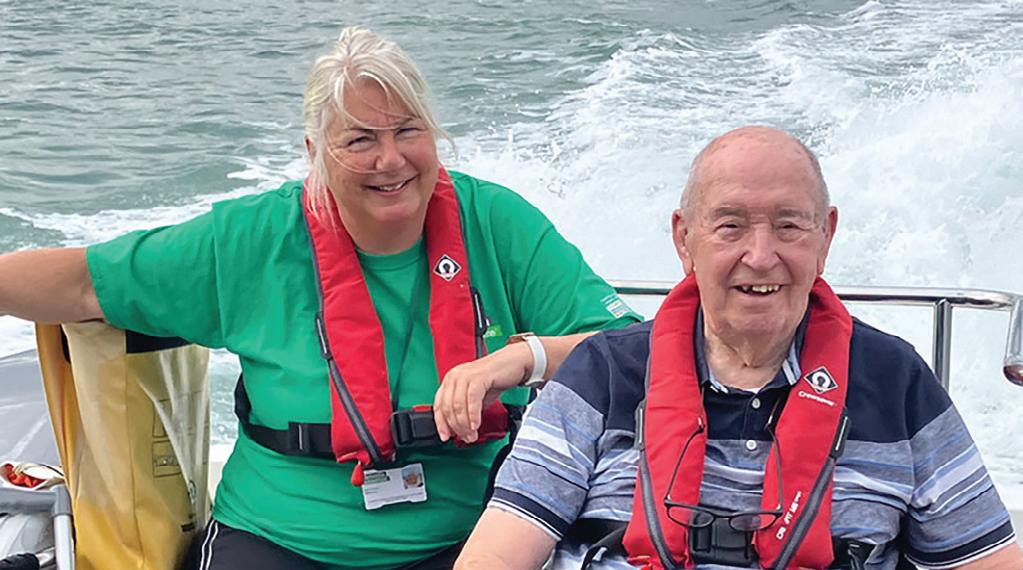
Middlesex County Cricket Club is one of Dementia Adventure’s first Green Letter Day partners and it will be hosting one of the first official Green Letter Day events at Lord’s Cricket Ground on September 8 for a Championship cricket match between Middlesex and Derbyshire County Cricket Clubs.
Plans for other Green Letter Day experiences and partners include golf days with Golf in Society, online flower arranging workshops with Freddie’s Flowers, allotment adventures at the Jubilee Allotments in Essex, Love-All tennis days with the Herts Foundation, a special day at the lake and picnic, hosted by Another Place in Ullswater, boat trips with WetWheels, and multigenerational family adventure days in partnership with PGL.
Thanks to funders like Sport England and gifts-in-kind from partners, Dementia Adventure is able to make the majority of Green Letter Days free. Some will require a small charge to cover essential costs only, with the aim of keeping the events as accessible as possible.
Fiona Petit, Chief Executive at Dementia Adventure, says:
“This new initiative that takes its inspiration from Red Letter Days will allow families impacted by dementia to be able to live more active and fulfilled lives.
With a range of activities on offer, we hope they will be able to find something of interest or an activity that might reignite a past passion or start a new one.
“Our ambition is that Green Letter Days will become a model for dementia-inclusive events, kickstarting a wave of programming and influencing best practice across tourism, leisure and community engagement.”
Dementia Adventure has been piloting Green Letter Day cricket events with Middlesex CCC for over a year, refining the experience based upon feedback from families that attended. Of the 107 people that attended from May to September 2024, 75% reported they were very satisfied with the day and 25% were satisfied. 85% of carers expressed an interest in attending more community events, with one commenting “Being here today has shown us how many possibilities there still are. It has really changed our perspective”. Another added: “Today gave me the confidence to try more activities with my partner. It was well-supported, and I felt less pressure.”
Julie Blakesley, Membership Secretary at Middlesex CCC says: “We are enormously proud to once again be supporting Dementia Adventure. We are thrilled to be able to get behind their brilliant Green Letter Days initiative by inviting those impacted by dementia to Lord’s, with their families and loved ones, to enjoy a calm and relaxing day watching the nation’s favourite summer sport.
Dementia has a profound impact on the lives of so many people, including many of our own members, so supporting such a worthwhile initiative, like Green Letter Days, is really important to us as a Club, and we’ve seen at firsthand, from previous events we’ve supported, what a positive impact it can have on the lives of those living with dementia.”
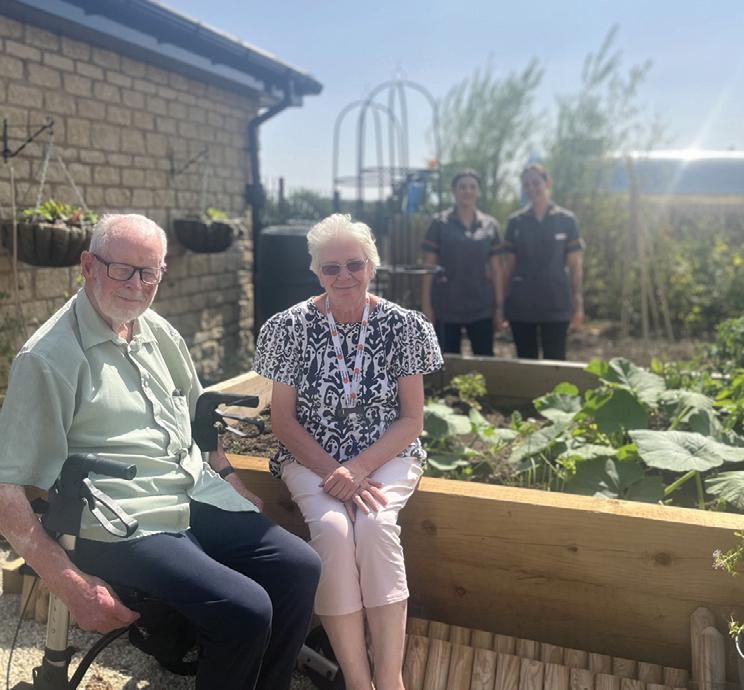
Luke Pilling,
A fresh wave of greenery and community spirit is blossoming at HC-One’s Brize Meadow Lodge Care Home in Carterton, West Oxfordshire, as residents come together to cultivate a thriving new vegetable patch. Led by the passionate efforts of Brize Meadow Lodge resident Brian Montgomery, this inspiring initiative is cultivating vegetables and nurturing friendship, purpose, and joy. Brian has enthusiastically rolled up his sleeves to bring the garden to life, with Home Manager Frances Payne providing dedicated support and guidance. The results are already flourishing as ripe tomatoes and sweet strawberries have been harvested. The garden’s bounty continues to grow, with a potato harvest currently underway.
Residents recently enjoyed a delicious potato salad
of their labour into a communal feast that brought
everyone closer together. Looking ahead, the community eagerly anticipates the pumpkins that are maturing beautifully in the patch, promising a vibrant autumn harvest full of colour and warmth.
Frances Payne, HC-One’s Brize Meadow Lodge Care Home Manager, expressed her delight:
“It’s wonderful to see Brian’s enthusiasm and the way the garden has brought everyone together. This project is not only providing fresh produce but also fostering a sense of community, purpose, and joy among our residents.”
Brian Montgomery, HC-One’s Brize Meadow Lodge resident, added:
“I always enjoyed my gardening at home and it’s great to have that in my home here now at Brize Meadow Lodge. Working on this project with Frances has given me something new to focus on, and I'm happy that other residents are enjoying the produce.”
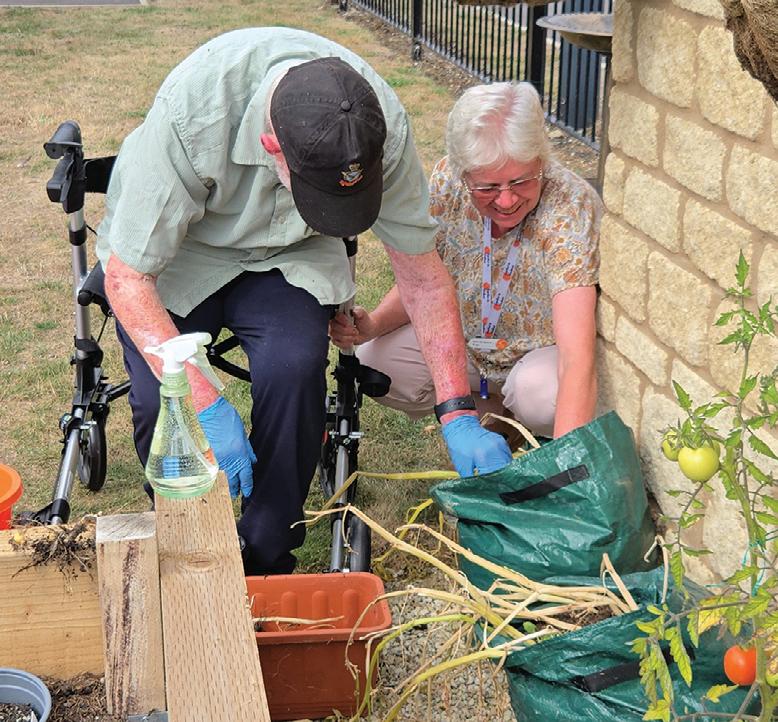

A Stroke survivor and former Member of Parliament has stepped into a powerful new role to transform chest, heart and stroke care across Scotland.
Amy Callaghan has joined Chest Heart & Stroke Scotland (CHSS) as Strategic Political Advisor, in her first public-facing role since stepping down from frontline politics.
Drawing on her own recovery journey, Amy is now pushing to reform rehabilitation and treatment services that she says are falling short of what too many people across Scotland deserve.
Her appointment comes as CHSS ramps up campaigning ahead of its manifesto launch early next month, which calls for urgent action to deliver a long-overdue thrombectomy service and a rehabilitation guarantee for people recovering from life-altering conditions.
Amy Callaghan, Strategic Political Advisor at CHSS, said: “You don’t become a politician unless you want to change the world – and that hasn’t changed for me. I’m just working from a different perspective now.
“At CHSS, I finally have the space to make real change happen – to push the reforms I couldn’t deliver from within Parliament but that people living with these conditions so urgently need.”

Having survived a haemorrhagic stroke in 2020 at just 28 years old, Amy’s personal insight gives her a rare understanding of the urgent reforms needed in Scotland’s health system.
In particular, she has highlighted the Scottish Government’s repeated failure to deliver a 24/7 thrombectomy service, promised since 2017.
She added: “Rehabilitation is what saves lives and could save the state so much money. Combine that with investment in the game-changing thrombectomy service and catastrophic strokes where people can’t return to work and to contribute to the economy, could become the minority”
“If someone has a clot-type stroke, they need to get on the table to receive a thrombectomy within three hours. Right now, that simply isn’t happening. If you arrive just minutes too late, you may be left disabled for life – or worse.”
The cost of rolling out a full thrombectomy service is estimated at around £1-2 million per angio-suite in Glasgow and Edinburgh – a small investment compared to the long-term cost of care.
Amy said: “When I was working to return to Parliament, CHSS helped me stand long enough to deliver a speech, we worked on my balance. They took a personcentred approach to rehab. That support was life-changing, and I want everyone to have access to that same kind of care.”
She added: “This isn’t a policy team guessing at what might help. It’s real people sharing real priorities – carers, survivors, people with language disorders, and families. Their voices are shaping our campaign from start to finish.”
Amy’s experience has also helped expose gaps in understanding of stroke and hidden disabilities across the public and political spheres.
She said: “Too often, people assume you’re too young to have a stroke, or they write you off as economically inactive, but people with our conditions are voters, carers, contributors, and so this is a movement led by people who know what needs to change.”
A new orchard has been created at Norfolk-based residential service, 8 Acres, to celebrate its upgraded Care Quality Commission (CQC) rating, with a tree planted for every supported person.
The latest CQC Inspection in July rated 8 Acres – part of National Care Group, ‘Good’ in four areas, with a rating of ‘Outstanding’ for being Caring. The residential service worked tirelessly to improve its rating of ‘Inadequate’ in the previous report, which was issued four months earlier.
To mark the outstanding achievement, a total of 18 trees have been planted to create an ‘Outstanding Orchard’ within its spacious, leafy grounds, with a tree dedicated to every person living at 8 Acres. The trees were purchased locally from Toftwood Garden Centre, where the staff provided advice on which trees would be best suited for the environment.
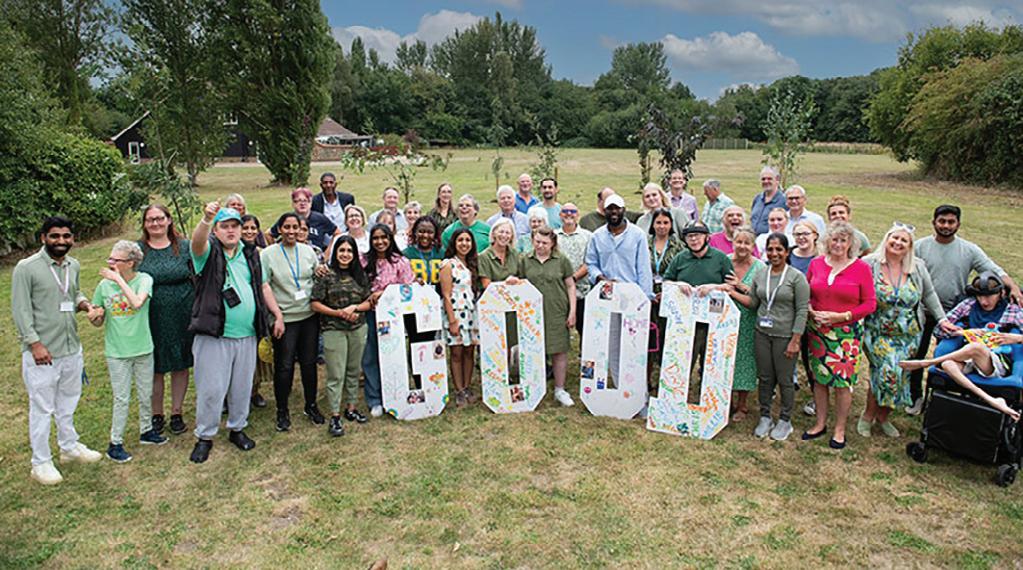
The tree planting initiative is part of National Care Group’s ongoing commitment to the environment and its carbon reduction plan, with a goal of becoming Net Zero by 2050.
The official opening of the ‘Outstanding Orchard’ took place during a co-produced celebratory event, organised by National Care Group, 8 Acres, and contributions from supported people. Guests gathered outdoors as Jamie, a person supported by 8 Acres, and his mum proudly cut the ribbon to mark its open-
ing.
As part of the co-produced event, people from 8 Acres decorated the area with letters which spell ‘GOOD’, covered in their drawings and photos of everything they love about their home. Guests also enjoyed a video featuring supported people singing and dancing alongside their support workers to Queen’s ‘Don’t Stop Me Now’. Rachael Marriott is the Registered Manager at 8 Acres, who was appointed in March 2025.
She said: “It was a joy to celebrate our latest CQC rating at a special afternoon of celebrations alongside colleagues, the people we support, their relatives and social care professionals, and mark the official opening of our new orchard. I’m proud of our achievement, but we are all in agreement that we’re aiming for a rating of Outstanding overall next time!”
Karen Lewis, Chief Operational Officer of National Care Group, added: “Our team at 8 Acres works extremely hard to get everything right, and it’s wonderful to see them get the recognition they deserve for the exceptional quality of service they are providing. The ‘Outstanding Orchard’ serves as a reminder of how they worked tirelessly to deliver a comprehensive action plan to turn around its CQC rating.”

HC-One’s Haywood Lodge Care Home in Mappleborough Green, Studley, was visited by MP for Stratford-on-Avon, Manuela Perteghella.
Residents and colleagues of the HC-One owned care home enjoyed meeting their MP and chatting to her about what life is like at Haywood Lodge Care Home – which is an integral part of the local Mappleborough Green community.
MP Manuela enjoyed a tour round the 66 bedded residential and residential dementia care home, including the spacious bedrooms with fitted furniture and ensuite facilities; cosy cinema room complete with popcorn machine; library, on-site hair and beauty salon and botanical garden rooms and serene quiet lounges. Manuela even had the prestigious honour of judging and deciding the winner of the home’s bakeoff competition.
Georgia Cooney, Home Manager at HC-One’s Haywood Lodge Care
Home, commented:
“Manuela Perteghella’s visit was incredibly meaningful for our residents, colleagues, and the wider community. It opened the door for honest, constructive conversations about the key issues affecting those living and working in care. Our residents truly valued the opportunity to engage with Manuela, sharing their stories, raising concerns, and discussing possible solutions. We’re deeply grateful for her time, interest, and genuine commitment to understanding the needs of our home and the care sector as a whole.”
MP for Stratford-on-Avon, Manuela Perteghella, said:
"It was very lovely to visit Haywood Lodge and meet with residents and the team, and talk about the various activities and services available at the care home. It was an absolute joy to judge the cake competition. Well done to all the bakers!"
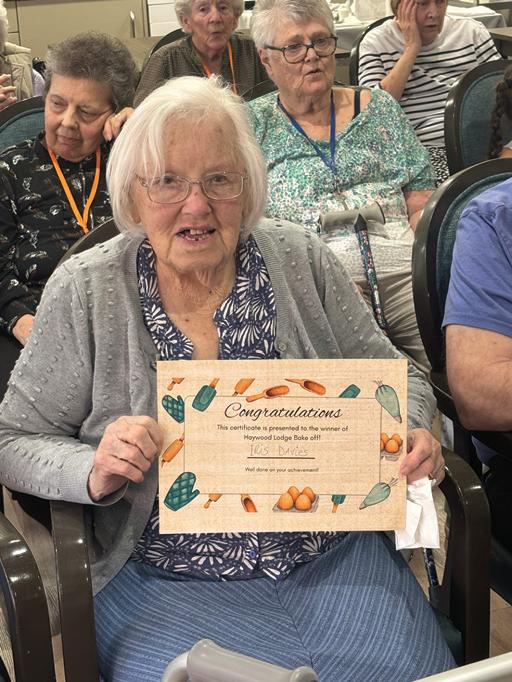
A new study by The King’s Fund has revealed that a substantial proportion of routine NHS mental health care is now being delivered by private companies, charities, and independent providers, with 29% of NHS-funded inpatient beds sourced from the independent sector.
The think tank said the NHS has a “long and effective history” of outsourcing mental healthcare to private companies, charities, and other independent providers.
But it found that the “use of independent sector beds has gone far beyond acting as valuable surge capacity and instead has become a core part of mental health provision in England,” adding that what was “once the exception is now the norm.”
While independent sector beds are free at the point of use, The King’s Fund warns that their use has evolved from surge capacity to a core component of mental health provision in England.
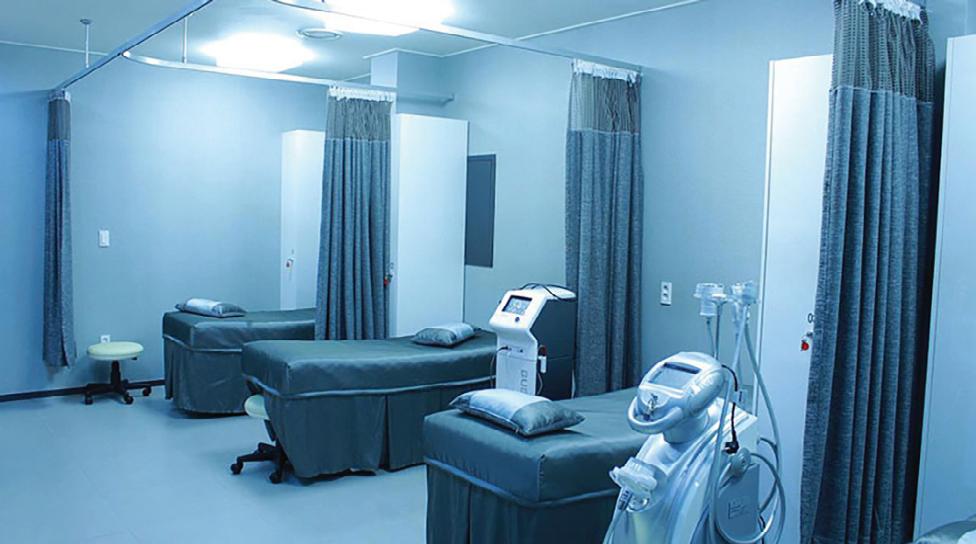
This shift raises concerns about transparency, as independent providers are not subject to the same level of data collection as NHS services, potentially limiting insight into patient outcomes and experience, especially for those with complex needs.
The King’s Fund’s Policy Director, Siva Anandaciva, commented: “Independent sector health care capacity acts as an important release valve for many NHS services when they face periods of high demand. It would make no sense to leave private beds empty when the NHS could purchase spare capacity and patients still receive care free at the point of use.
“However, our analysis reveals that there has been a significant increase in the share of NHS mental health inpatient care being outsourced to independent providers. Far beyond acting as valuable surge capacity, the NHS has become reliant on the independent sector for delivery of routine mental health care.”
“This exposes the health service to greater risk of higher costs, could leave patients facing longer stays in hospital, and means the public has less transparent data about the quality of services.”
“For the NHS to be sustainable in the long term, there needs to be far more focus on providing care in the community that keeps people well. Traditionally, the mental health sector has made great progress in delivering community-based care.
However, some patients with greater or more complex mental health needs may need inpatient care, and the NHS must do all it can to treat people in the appropriate setting for their health needs.”
Rebecca Gray, NHS Confederation mental health director, said: “This new research highlights the scope of the independent sector in NHS funded mental health care, who often support patients with the most complex mental health needs.”
“With bed occupancy rates in NHS mental health trusts consistently over the safe limits recommended by the Royal College of Psychiatrists, independent sector provision can provide much-needed capacity in some areas.”
“While our ambition should be to reduce the need to admit patients in the first place by continuing to improve community mental health services and prevent crisis and admission, some patients will still need inpatient care when they are very unwell. As such, all hospital provision – whether in the NHS or independent sector – must meet the highest possible standards of care and safety.”
“With limited capital available, it is important that we continue to see active engagement between the NHS and independent providers in strategic discussions about appropriate and cost-effective use of highquality independent sector capacity.”
with ‘Gardens of the World’ Creation
Residents and colleagues at HC-One’s Falstone Court Care Home in Sunderland, Tyne and Wear, have been busy transforming their outdoor space into a vibrant “Gardens of the World” as part of this year’s HC-One Gardens in Bloom competition, an annual celebration of creativity, community spirit, and the wellbeing benefits of gardening.
Throughout spring and summer, the team worked together to bring to life the late Hannah Randell’s vision for a global-themed garden inspired by the countries residents had visited or held fond memories of. Hannah, a much-loved colleague who worked as a Wellbeing Coordinator at Falstone Court Care Home, wanted to create a space that would spark conversations, evoke happy memories, and allow residents to share their travel stories. She consulted with the home’s gardener, Dave Newton, who encouraged her to sit down with residents and learn about the countries that meant the most to them. From those conversations, Hannah compiled a list of nations and their representative plants.
THE GARDEN NOW FEATURES:
• English flowers representing homegrown heritage
• Acer trees from Japan
• Dahlias from Mexico
• Mediterranean herbs
• Fragrant lavender from France
• Bright tulips from Amsterdam
Adding to the magic, a pair of seagulls made a nest in one of the flower beds at the end of May. The residents named the nesting bird Glenda, and on Care Home Open Day, her chick, named Sydney, hatched, much to everyone’s delight. Hannah kept residents and the local community updated through social media posts, sharing the progress of the egg and the joy it brought to the home.
Tragically, Hannah passed away suddenly just a week after Sydney’s arrival. In her memory, Dave and the team committed to

completing her “Gardens of the World” project exactly as she envisioned it, adding flags, lights, and features to help residents identify each plant and the country it represents.
The garden has since become a cherished space for relaxation, conversation, and connection. Residents, families, and local volunteers have all played a role in its creation, from planting and painting to sharing cultural memories. The space also supports wildlife and biodiversity, with raised beds, wildflower patches, and eco-friendly practices such as composting and rainwater collection.
Julie Merritt, Area Director at HC-One, said: “The ‘Gardens of the World’ is so much more than a competition entry, it’s a tribute to Hannah’s creativity, her love for our residents, and her belief in the power of shared experiences. Completing her vision brought us closer together and gave residents a space that sparks joy and conversation
every day. We’re incredibly proud of what we’ve achieved and of the lasting legacy Hannah has left in our garden.”
Dave Newton, Gardener at HC-One’s Falstone Court Care Home, said: “When the team first approached me at the start of the year with their idea for a ‘Gardens of the World’, we worked together to select key countries that residents had visited and designed the space around those memories. Our original plan had a few unexpected challenges, not least the seagulls who took over one of the flower beds, so it was back to the drawing board.
“After Hannah’s passing, it became even more important to me to get it right for her. I carefully chose the flowers, developed a new area, and made sure the garden would be something she’d be truly proud of.”
The HC-One Gardens in Bloom competition welcomed entries from across the UK, with regional winners recognised for creativity, community engagement, and sustainable practices.
As part of the judging process, HC-One selected five regional winners across England, Scotland, and Wales, with one overall winner crowned the overall winner. Regional finalists received a plaque and gardening hamper whilst the overall winner, judged and selected by James Tugendhat, Chief Executive Officer at HC-One, received a trophy, plaque, and gardening hamper plus a £300 gift voucher kindly sponsored and donated by Real Trade Supplies.
For residents and colleagues at Falstone Court Care Home, the greatest reward is seeing their “Gardens of the World” flourish, a living celebration of community spirit, shared memories, and the enduring power of nature.
This summer, Falstone Court Care Home is offering a special promotion for new residents. Those who move in before 31st August 2025 will receive £1,000 off their first month’s fees, making it the perfect time to experience life in a kind and caring care home community.
the
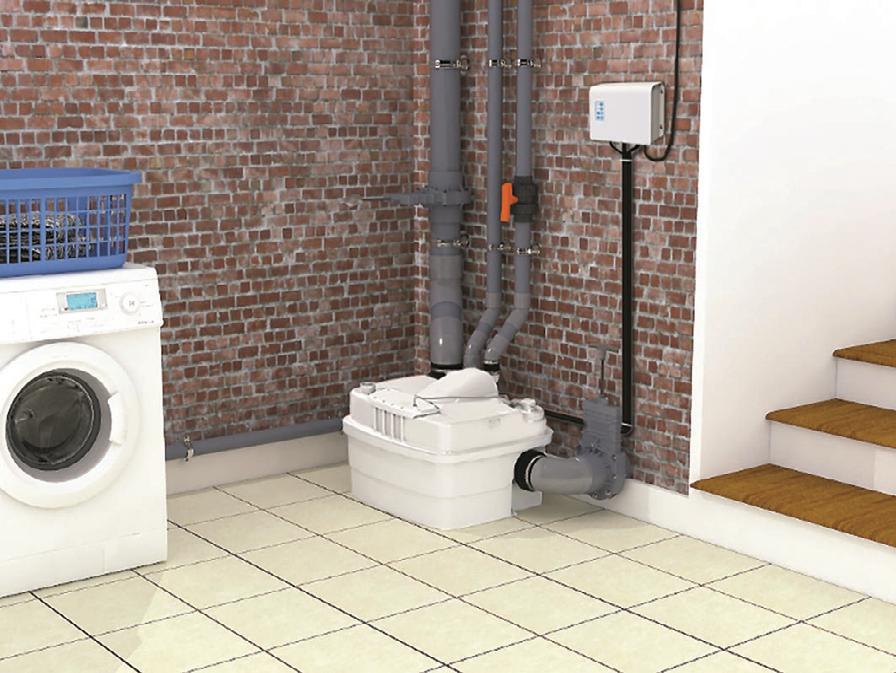
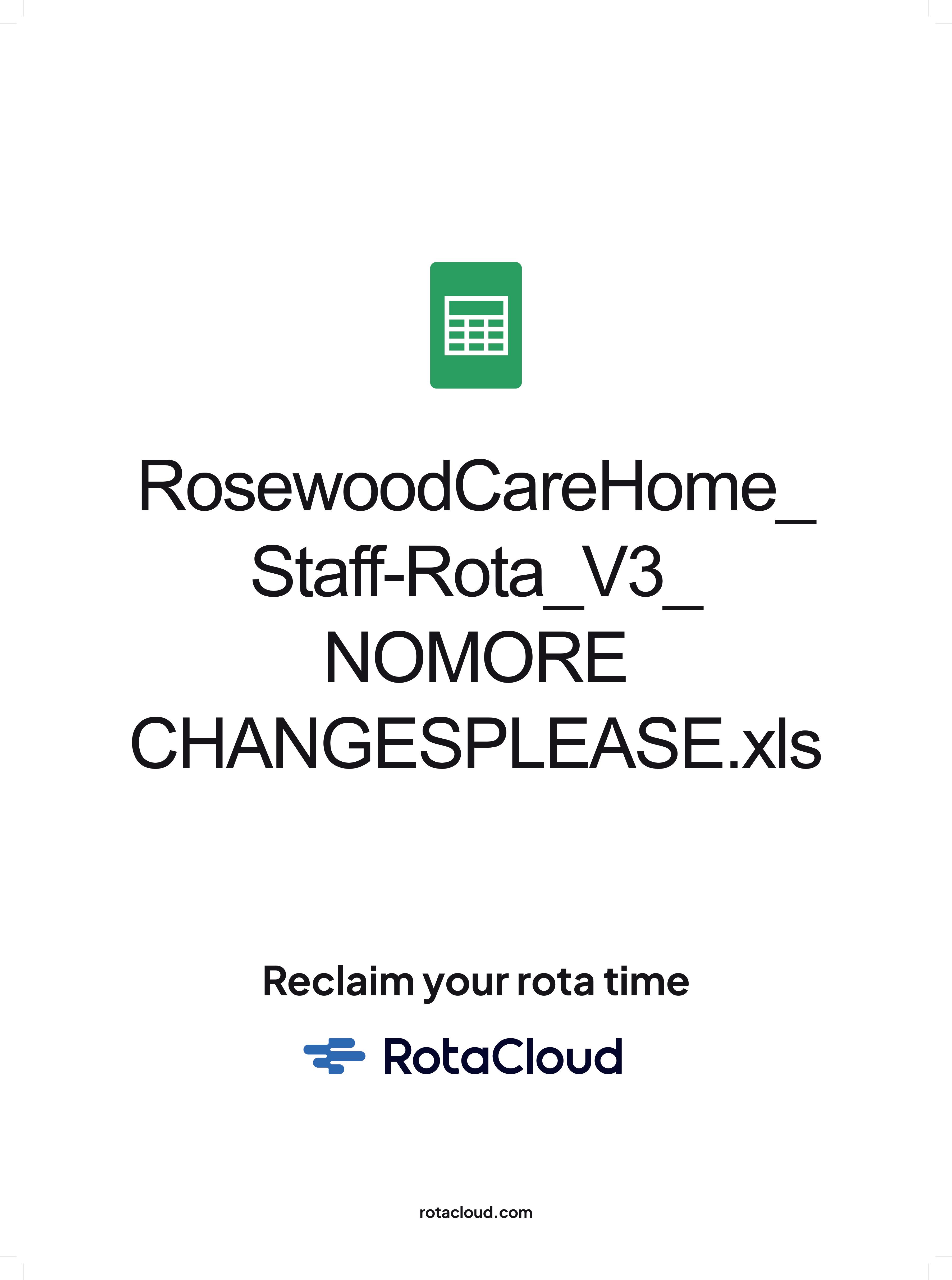
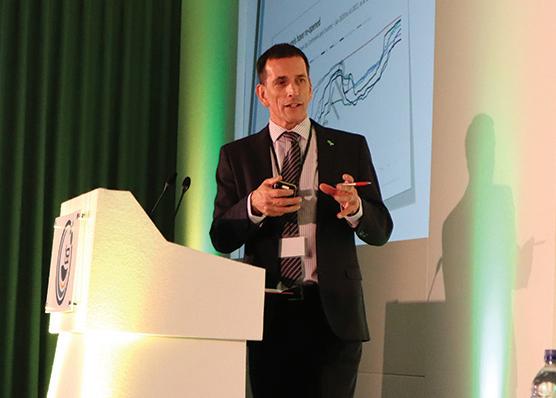
The commercial laundry industry has enormous potential to help the UK’s response to any future public health crisis, is the message of the statement given by the Textile Services Association (TSA) to the UK government’s Covid 19 inquiry. Despite initial contact being made by the Government, the newly published statement also shows that there are important lessons to learn from how the industry was dismissed during the pandemic of 2020.
The inquiry is a wide ranging examination of the UK’s response to the Covid 19 crisis and is, in part, attempting to identify areas of the response that could be improved during potential future crises. The TSA was requested to provide information on the potential for using reusable personal protective equipment (PPE), the ways the laundry industry helps maintain hygiene in healthcare environments, and how the government of the time failed to fully harness the capabilities of the industry at a critical point.
The statement, which was presented by David Stevens, CEO of TSA, outlines the nature of the TSA’s work in supporting the laundry industry as well as the importance of commercial laundries to the UK’s economy and institutions like the NHS. It considered the situation before the pandemic, as well as how that relationship evolved as the crisis unfolded.
The statement’s key message highlights the lack of a joined up, centralised approach to creating a specification for reusable surgical gowns and other PPE. If this had been in place it could have eliminated, or at minimum significantly reduced the need for disposable PPE products.
Data showing the commercial benefits in 2021 demonstrated savings of £1.2 billion a year of reusable over single use gowns, which in real terms would be much higher due to the inflationary pressures being exerted
on the supply chains of single use products during 2020.
Many commercial laundries already provide services to the NHS as well as private health, social care and other care based industries, and are set up to meet the high standards of hygiene these sectors require as well as meet demand. The commercial laundry industry currently processes and delivers up to 75 million pieces a week and at the peak of the pandemic, the demand for gowns would have been 3 million per week.
While the Covid 19 pandemic was an unprecedented challenge to the UK, it did reveal potential improvements that could be made for infrastructure and support to ensure that the response to future events is smoother and more efficient, and the TSA’s statement clearly shows that opportunities were missed by the government at the time.
“The commercial laundry sector is vital to the smooth running of the NHS and has been for many years,” says David. “We need to learn from the events of 2020, to ensure that the responses are lead by evidence and make full use of the capabilities of the UK’s commercial laundry sector,”
“Our statement to the inquiry demonstrates that our industry has the capability to ensure that PPE can be reused, helping to create a more resilient system during times of crisis – and saving hundreds of millions pounds worth of public money, as well as reducing carbon emissions. We could be “pandemic ready" in a matter of weeks should the need arise again”
The TSA alongside their members, are willing to drive the expansion of the existing reusable gown solution forward with the right support and commitment as it will not only assist the UK in being pandemic ready by solving supply issues for healthcare frontline workers on a long-term basis, but it will also deliver environmental and commercial benefits.
The TSA statement was made as part of Module 5 of the inquiry, which related to issues surrounding procurement. It can be read in full on the inquiry’s website.
The TSA is the trade association for the textile care services industry. The TSA represents commercial laundry and textile rental businesses. Membership ranges from family-run operations through to large, multi-national companies. Visit www.tsa-uk.org for more information.
In care homes, where hygiene, safety, and reliability are paramount, it’s essential that laundry operations run seamlessly. Forbes Professional’s Complete Care solution is tailored to meet the specific demands of this environment, offering fully supported and cost-effective laundry systems.
With Complete Care, care homes benefit from access to premium commercial laundry appliances without upfront capital expenditure. The allinclusive rental plan covers installation, routine servicing, maintenance, and repairs; enabling staff to focus on resident care rather than laundry appliance logistics. Unexpected breakdowns can severely disrupt operations, which is why Forbes provides nationwide, award-winning support with a same or next-day engineer response to minimise downtime.
Preventative servicing is central to Forbes’ approach. Their offering includes routine maintenance, full certification, annual gas safety checks, and professional dryer duct cleaning - ensuring systems meet all legal and regulatory standards. Whether supporting existing machines or those rented through Forbes, this proactive strategy improves operational efficiency and reduces risk.

Under Regulation 35 of the Gas Safety Regulations 1998, annual gas inspections are mandatory. Forbes’ Gas Safe-registered engineers conduct these checks to ensure safe, legally compliant environments. Additionally, regular duct cleaning - often overlooked - is vital not only for performance but also for fire prevention. Forbes’ nationwide service mitigates these risks while optimising dryer efficiency.
Whether you need new rental equipment, service and maintenance for existing appliances, or a full purchase, Forbes offers flexible procurement routes to suit different operational models and budgets. Their expert consultants work closely with care providers to design tailored solutions for each setting.
With decades of experience in the care sector, Forbes Professional is a trusted partner to care homes across the UK; delivering dependable, fully supported laundry solutions that prioritise safety, compliance, and peace of mind. forbespro.co.uk | info@forbes-professional.co.uk | 0345 070 2335
See the advert on the facing page for more information.
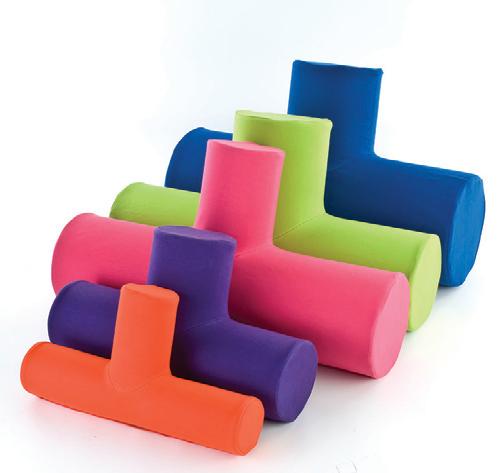
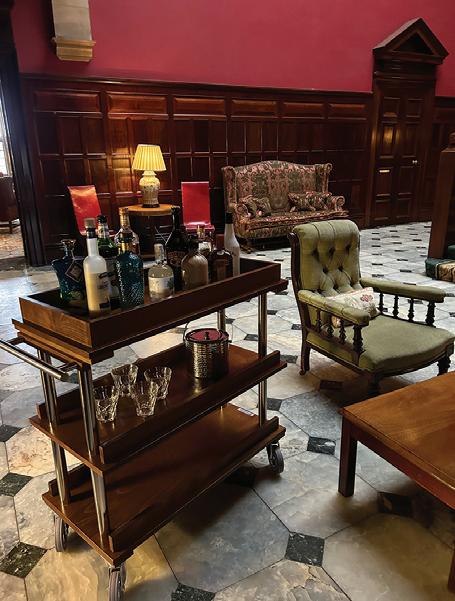
HipSaver Soft Hip
Protectors protect the elderly and disabled people from fall-related hip fractures.
Designed to protect elderly people

Available as comfortable underwear or long casual pants in several sizes for men and women, HipSavers feature soft protective airPads permanently sewn into the garments over the hip areas prone to injuries and fractures. HipSaver TailBone models have an additional protective airPad over the coccyx on
Since our founding in 2010, Activities to Share has been dedicated to enhancing the lives of those in care by providing thoughtfully designed activity products. Our mission is to support activity coordinators in delivering uplifting, engaging experiences that foster connection, joy, and well-being. We achieve this by listening closely to your feedback and evolving with your needs. Whether over the phone, via email, WhatsApp, or
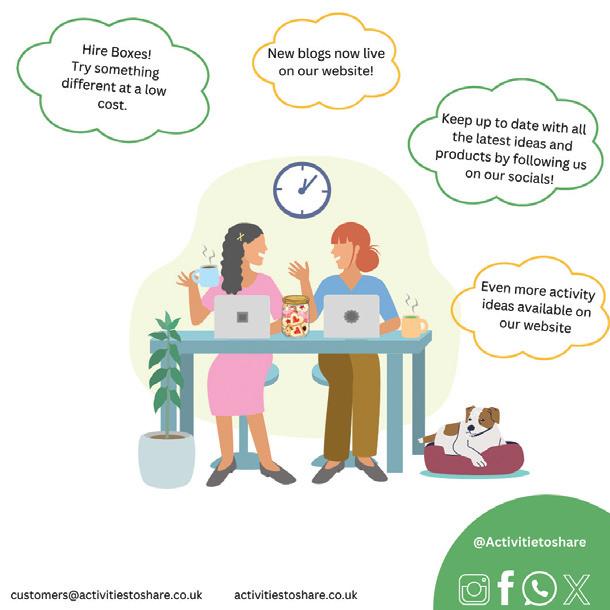
hip fractures.
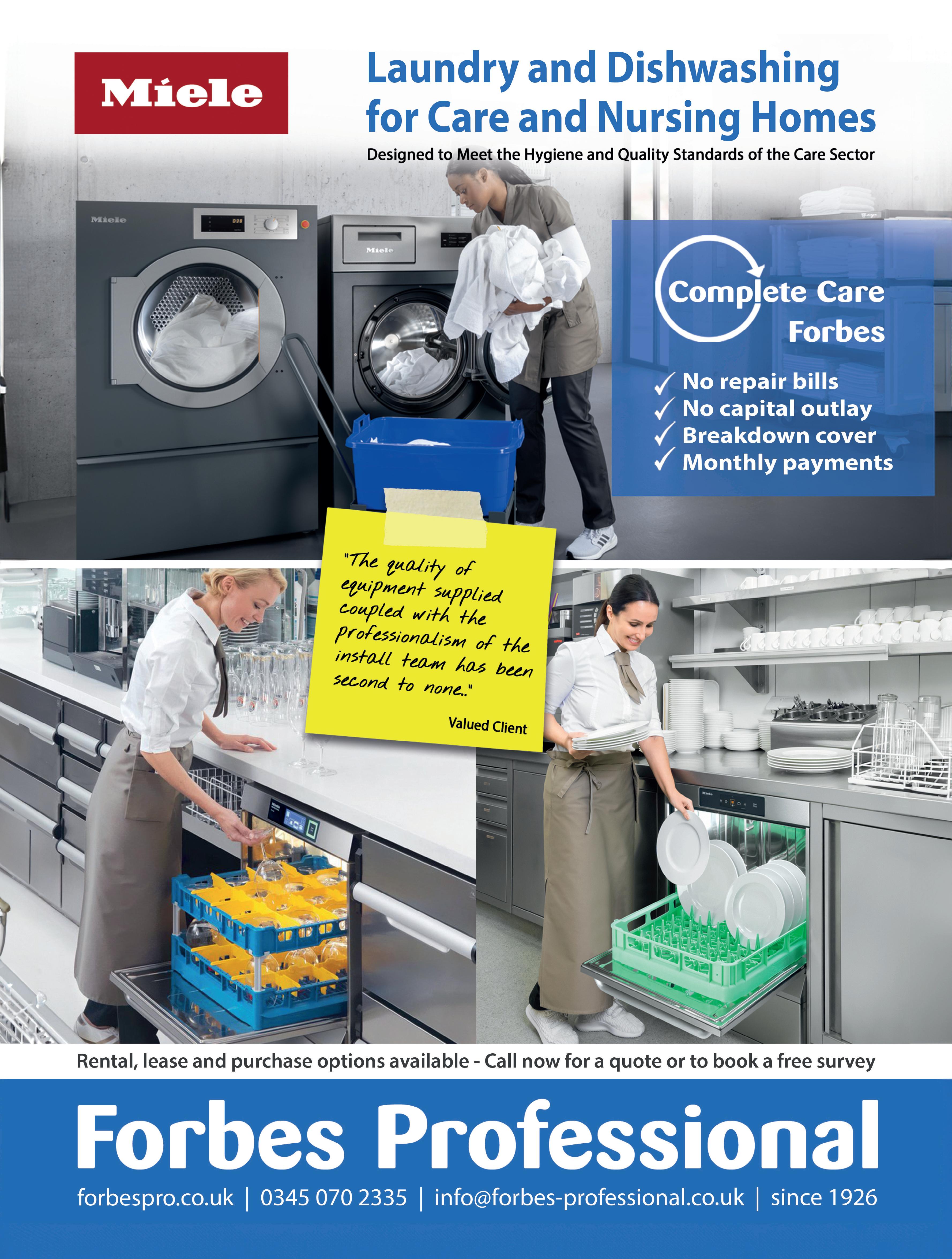
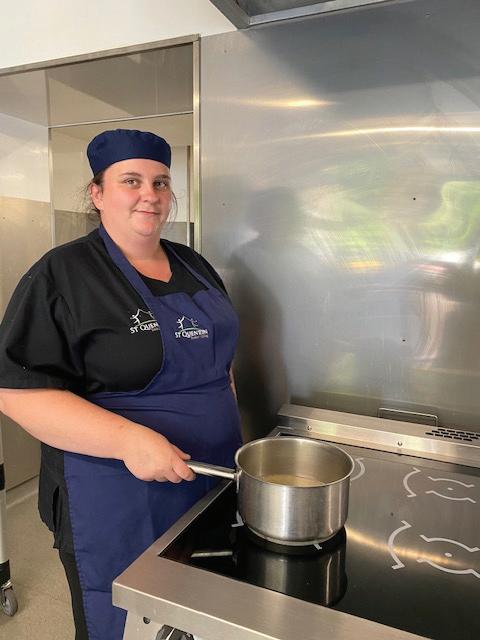
In a care home, catering can be the difference between mealtimes that are anticipated with pleasure and those that are simply endured. Care itself is rightly personalised, tailored to the needs and preferences of each resident. The same principle should apply to the food they eat. Residents and their families are entitled to expect meals which reflect dietary needs, medical conditions, and personal tastes. But delivering that level of personalisation at scale, within budget, is no small task.
The Healthcare Management Trust acquired St Quentin Care Homes almost a year ago and has made significant improvements in care delivery, infrastructure, and leadership. Catering was a big area of focus and has brought tangible results: residents returning for second helpings, heartfelt thanks from families, and a noticeable reduction in food waste. These results haven’t happened by chance; they are the outcome of deliberate choices in how we source ingredients, design menus, and create the overall dining experience.
FRESH INGREDIENTS AND A VARIED MENU
The value of using fresh ingredients over pre-packaged or heavily processed alternatives cannot be overstated. Fresh produce boosts nutritional quality, enhances flavour, and increases the likelihood that residents will eat and enjoy their meals. Variety is equally important. A repetitive or bland menu fails to tempt people to the dining room. Similarly, introducing a rotating weekly menu with diverse flavours and textures, including vegetarian and vegan options, will create something for everyone, which is especially important where care homes support residents of varying ages and cultural backgrounds.
PRESENTATION MATTERS
Style should never overtake substance, but presentation matters and plays a vital role in whether a meal
By Charlotte McKay,
is eaten. An unappealing plate can lead to food being left untouched, no matter how nutritious it is.
Small touches make a big difference. Balancing colours on the plate, arranging food attractively, and serving it on crockery that complements the meal will encourage meals to be finished. Even something as simple as offering a platter of sandwiches with varied fillings, so residents first see vibrant colours rather than just bread, can boost appetite and engagement.
Many care home residents are unable to visit restaurants, and for them, mealtimes are often the closest equivalent to dining out. Recreating elements of that experience can lift the mood and turn a necessary routine into a highlight of the day.
Printed menus with clear, attractive typography help residents feel they have real choice and control. For some, reading a menu may even stir fond memories of past outings and family meals. This small detail reinforces the dignity and pleasure of the dining experience.
Sharing food is a social occasion. In care homes, shared meals can foster community spirit, reduce loneliness, and spark conversation. Making mealtimes engaging and enjoyable benefits both emotional wellbeing and nutritional intake.
This means paying attention to more than just the food. Lighting, music, table layout, and staff interaction all contribute to the atmosphere. A team that works seamlessly from kitchen to dining room by greeting residents warmly, knowing their preferences, and encouraging participation can transform mealtime into a joyful daily event.
Great catering doesn’t happen in isolation. It relies on strong collaboration between chefs, care staff, activities teams, administrators, residents, and families. Open communication ensures dietary needs are met, allergies are avoided, and preferences are respected.
When everyone takes shared responsibility, residents benefit from meals that are not only safe and nourishing, but also deeply satisfying. The catering team gains valuable insight from care staff who know residents well, while residents themselves feel heard and valued.
Ultimately, catering in a care home is about far more than providing three meals a day. It’s about respecting individuality, supporting health, and creating moments of joy. When meals are thoughtfully planned, beautifully presented, and shared in a warm environment, they nourish the body and the mind.
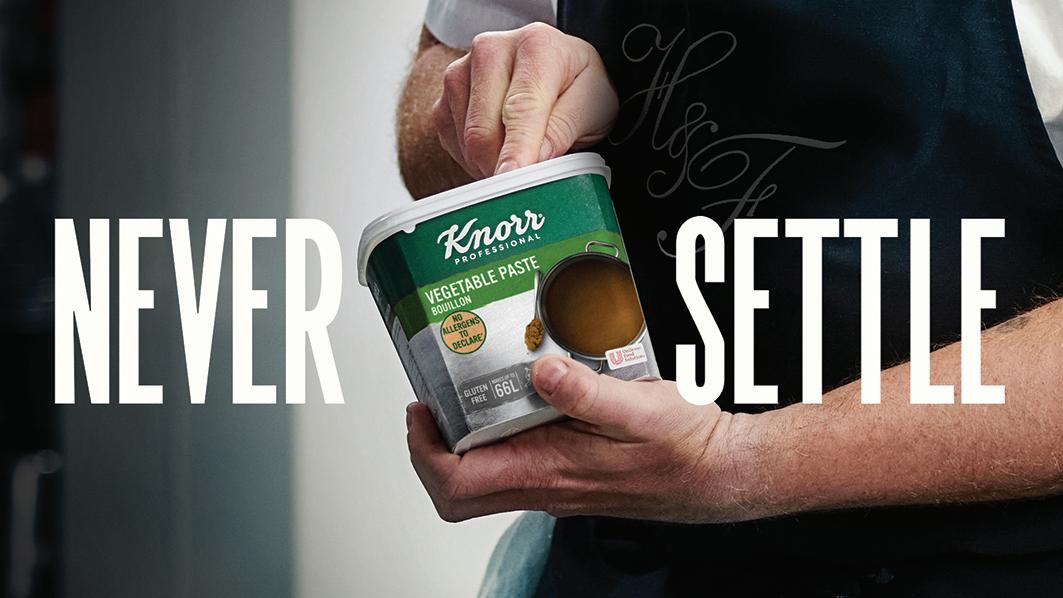
In the care sector, food is more than just nutrition - it’s comfort, dignity, and a way of bringing joy to residents every day. That’s why chefs can’t afford to compromise. From flavour and safety to consistency and versatility, every ingredient has to deliver. When it comes to bouillon, Knorr Professional refuses to settle for anything less than the best and so do the chefs who use it.
Knorr Professional Bouillon is the UK’s number one bouillon brand*, trusted in kitchens nationwide for its rich depth of flavour, outstanding versatility, and chef-trusted consistency. It’s made to work hard in every service, withno allergens to declare¹ options that give chefs peace of mind when catering for residents with diverse needs.
NEVER SETTLE FOR BLAND DISHES
As residents age, their sense of taste can diminish. That’s why flavour has to work harder in care - it’s not just about nutrition, it’s about enjoyment. Knorr Professional Paste Bouillon brings bold, balanced flavour that cuts through reduced senses, ensuring dishes remain satisfying and memorable. Whether it’s used as a base, rub, seasoning, glaze, or marinade, it delivers the same consistent, chefapproved results. From soups and stews to roasted vegetables and marinades, this is one product that performs across the menu - helping chefs adapt quickly without losing quality. NEVER SETTLE FOR UNCERTAINTY
In care kitchens, allergen safety isn’t negotiable. Theno allergens to declareoptions in Knorr Professional Paste Bouillon make it simple to create inclusive dishes without sacrificing flavour. This helps reduce the risk
of cross-contamination and ensures every resident can enjoy the same great taste.
For Knorr Professional Care Ambassador Preston Walker, that confidence is invaluable:
“With ‘no allergens to declare’ options available across the range, Knorr Professional Paste Bouillon is easy to introduce into dishes that need to be suitable for varying needs and preferences,” says Preston. “It gives me peace of mind that I can create flavourpacked dishes for all residents, without excluding anyone due to allergens.”
NEVER SETTLE FOR INCONSISTENCY
Care kitchens can be high-pressure environments, where time is short and the need for consistency is constant. Knorr Professional Bouillon’s paste format makes it easy to store, measure, and use, ensuring the same flavour profile in every batch. Its consistent yield also helps with budget control - delivering premium quality without waste.
Preston sums it up simply:
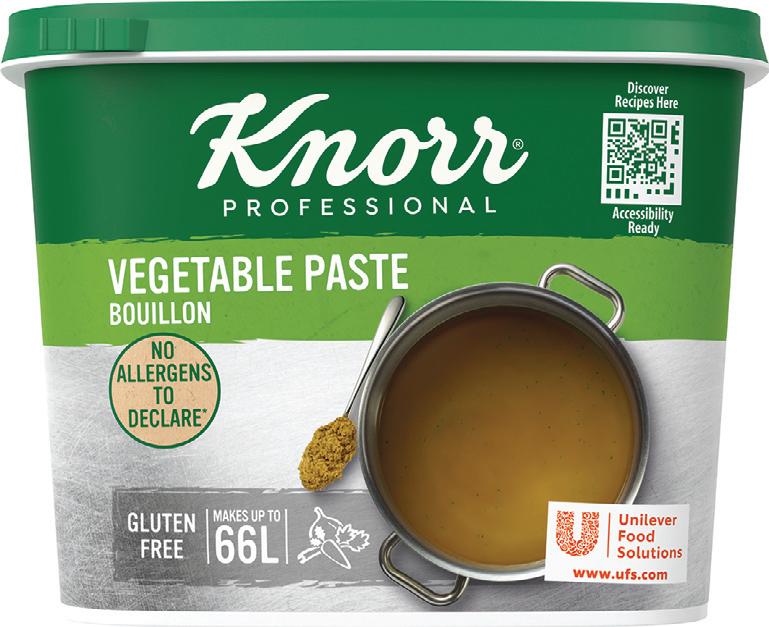
“We use the Knorr Professional Bouillon paste range for one simple reason - it delivers. Quality, flavour, consistency, and the confidence of knowing exactly what you’re going to get, every time.”
NEVER SETTLE FOR SECOND BEST
Every plate in a care home matters. It’s an opportunity to provide comfort, joy, and nourishment - and that means every ingredient has to earn its place. With Knorr Professional Bouillon, chefs can be sure they’re serving the very best in flavour, safety, and reliability. Because when it comes to care catering, settling for less is never an option.
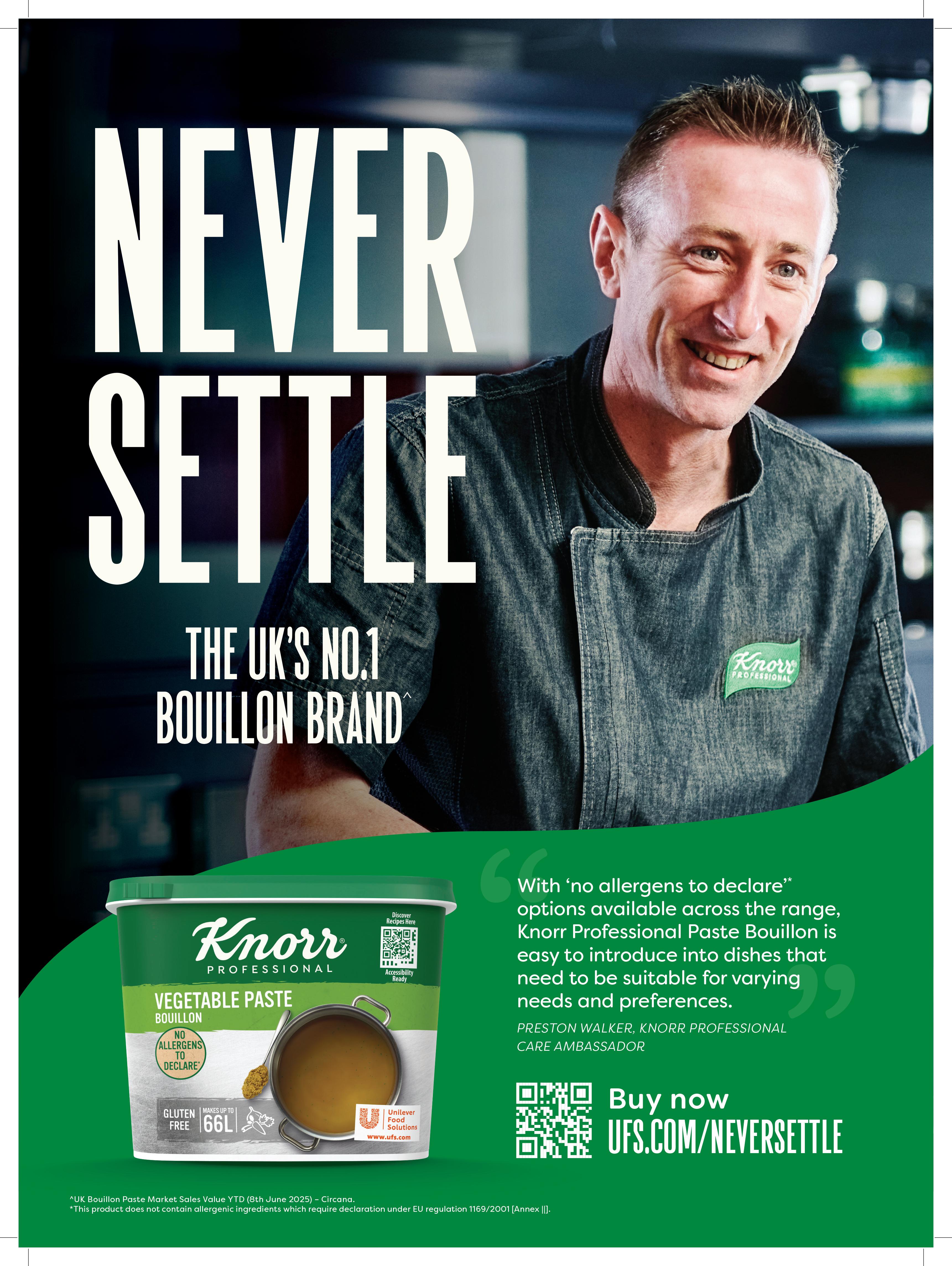
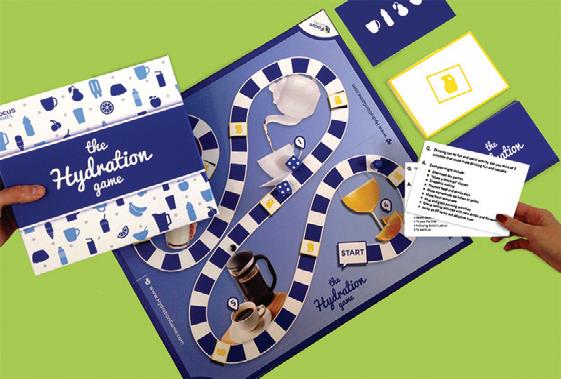
How one simple training game is helping care homes improve outcomes for residents—and staff
In care homes dehydration remains a quietly persistent danger. While often invisible on the surface, its effects can be devastating—both for older adults and for the staff who care for them.
Despite being entirely preventable, dehydration continues to cause avoidable harm, hospital admissions, and even deaths among vulnerable care home residents. It can also impact staff wellbeing, concentration, and performance—making it a risk that affects the entire care environment. So why does dehydration still slip under the radar? And what practical steps can care homes take to tackle it head-on?
A QUIET EPIDEMIC IN CARE SETTINGS
Older adults are particularly vulnerable to dehydration for a range of reasons. As we age, our sense of thirst diminishes, and many residents have underlying conditions—such as dementia, stroke, or mobility impairments—that make it harder to ask for, reach, or consume drinks. Medications like diuretics or laxatives increase fluid loss, while difficulties swallowing (dysphagia) make drinking unpleasant or risky.
A study published in Age and Ageing (El-Sharkawy et al., 2015) found that over a third of older adults admitted to hospital were already dehydrated on arrival, and two-thirds remained so 48 hours later. More recent studies confirm that this remains a pressing issue. For example, care home residents are still five times more likely than community-dwelling older adults to arrive at hospital with dehydration, particularly with dangerously elevated sodium levels—known as hypernatremia—which significantly increases the risk of in-hospital death.
Despite public health campaigns and growing awareness, more recent reviews suggest the problem has not improved. As recently as 2022, a UKwide review of hydration practices in residential care estimated that around 20% of older adults remain clinically dehydrated at any given time. Some studies, depending on the criteria used, report prevalence rates as high as 34%.
Put simply, dehydration in care homes hasn’t gone away. It remains a widespread, under-addressed issue that continues to harm some of the most vulnerable people in our society.
IT’S NOT JUST THE RESIDENTS
While most dehydration efforts focus (rightly) on residents, it's important to recognise that care home staff are also at risk.
Working long shifts in hot, fast-paced environments, care staff often delay drinking water or miss breaks altogether. Some worry about not having time for toilet breaks. Others are simply too focused on their residents’ needs to think about their own.
The effects of even mild dehydration on staff can include fatigue, headaches, poor concentration, irritability, and slower decision-making— none of which is ideal in a safety-critical setting. Dehydrated staff may not perform at their best, and over time this can impact both care quality and wellbeing.
Supporting hydration in care homes, then, means supporting everyone—residents and staff alike.
A SIMPLE GAME, A BIG IMPACT
So how can care homes raise awareness of hydration risks, improve practice, and make learning more engaging?
One increasingly popular approach is The Hydration Game, developed by Focus Games. Designed specifically for health and social care staff, the game takes the form of a fun, team-based learning session that helps players explore the causes, risks, and solutions related to dehydration in care settings.
The Hydration Game prompts discussion, sparks reflection, and encourages staff to share their experiences and insights in a relaxed, collaborative way.
Players take turns answering questions, tackling realistic scenarios, and discussing how they might handle various hydration-related situations— from supporting a resident who refuses drinks, to spotting early signs of dehydration, to thinking about their own hydration habits during shifts.
The game typically lasts 45–60 minutes and is suitable for 2–12 players. It works well across all roles—care assistants, nurses, kitchen staff, cleaners, and even admin or maintenance teams—because everyone in a care home can play a part in hydration care.
There’s also an online version (ZeST) for teams who work remotely or across multiple sites.
REAL-WORLD RESULTS
Beyond awareness and engagement, hydration-focused training can produce measurable results. A notable example comes from Torbay and South Devon NHS Trust, which in 2021–2022 supported a hydration project across 33 care homes. The results were striking: a 63% reduction in falls requiring hospitalisation, an 18.5% decrease in urinary tract infections (UTIs), and zero UTI-related hospital admissions during the project period. What made the difference? A blend of simple changes: structured drink
At Simply Food Solutions, we believe that everyone deserves access to delicious meals tailored to their specific dietary requirements. Founded over 20 years ago, the company began with a vision to provide high-quality halal meals to hospital patients. Today, as part of the Bidfood family, Simply Food Solutions offers an extensive range of food solutions designed to meet the diverse needs of healthcare providers, care homes and individuals across the UK.
Our Product Ranges
SIMPLY PUREE
Designed for individuals with swallowing difficulties (dysphagia), the Simply Puree range offers texture-modified meals compliant with IDDSI guidelines. From Level 3 (Liquidised) to Level 7 (Regular), our meals ensure safety without compromising on taste. Options include soups, main courses, desserts and snacks, all crafted to the highest safety standards. Additionally, the Simply Puree Junior line caters to paediatric needs, providing
rounds, flavour and temperature choices, staff reminders, visual prompts, and team training.
The Hydration Game fits perfectly into this approach, helping staff explore and embed hydration-friendly practices in a way that’s memorable and motivating.
IDEAS FOR USING THE HYDRATION GAME IN YOUR HOME
Care homes that adopt The Hydration Game often find that it quickly becomes a flexible, well-used tool across their organisation. Here are some creative and effective ways it can be used:
As part of induction or refresher training, the game helps new staff understand hydration risks from day one—and makes mandatory learning more enjoyable. Many homes use it during Care Certificate sessions. During staff meetings or team huddles, a few game cards can be used to prompt a five-minute discussion. These quick conversations often uncover issues or ideas that otherwise go unspoken.
To promote staff wellbeing, the game can also prompt teams to think about their own hydration habits. “When did you last drink water?” or “How do you remind yourself to hydrate?” are simple but important questions that encourage better self-care.
Some care homes even use the game to identify “hydration champions”—staff members who demonstrate a real interest in promoting better hydration, and who can lead initiatives, monitor intake, or coach colleagues.
SHIFTING THE CULTURE
Ultimately, hydration in care homes is not just about checking drink charts or offering fluids at mealtimes. It’s about embedding a culture of attentiveness—where hydration is seen as an essential act of care, not an afterthought.
Games like The Hydration Game make this easier by turning serious issues into opportunities for learning, connection, and shared responsibility. They give staff the space to speak, reflect, and come up with practical ideas that make sense in their setting.
And when residents are better hydrated, they are safer, happier, more comfortable, and more independent. Staff are sharper, more resilient, and more engaged. Everyone benefits.
By making learning enjoyable and practical, The Hydration Game is helping care homes across the UK improve hydration outcomes and build stronger, more confident teams.
Want to learn more or get started? See the advert on the front cover and use the code for a 20% discount.
Visit www.hydrationgame.com for details and ordering options.
meals that are both safe and appealing for children.
SIMPLY HEALTHCARE
Meeting the needs of patients with allergies, intolerances, or specific dietary requirements, the Simply Healthcare range includes gluten-free, allergen-aware and renal-suitable meals. Each dish is pre-plated and ready to serve, ensuring convenience and consistency in meal preparation. The range encompasses a variety of meat, fish and vegetarian options, all designed to support patient health and satisfaction.
SIMPLY WORLDFOODS
Reflecting the UK's rich cultural diversity, Simply Worldfoods offers a selection of cultural meals, including halal, kosher and AfroCaribbean meals. This range allows healthcare providers to offer patients a taste of home, enhancing mealtime experiences and promoting cultural inclusivity.The range also provide multiportion dishes that are ideal for staff or visitor feeding cafes.

Explore our full range of products and discover how Simply Food Solutions can enhance your mealtime offerings, please visit https://simplyfoodsolutions.co.uk
Our son Rune is nearly six. He lives with a rare neuromuscular condition called Nemaline Myopathy, which affects his movement and strength. He needs round-theclock care, someone awake even through the night to manage his ventilator, medication, and medical equipment.
But the biggest threat to Rune’s health hasn’t been his condition. It’s been what he was being fed.
FORMULA NEARLY BROKE HIM
For the first few years of his life, Rune was in and out of hospital. He suffered from constant vomiting, painful tummy issues, repeated chest infections, and dangerous aspiration (when food or liquid enters the lungs). These episodes were terrifying, and they were all made worse by the “nutritionally complete” formula feeds he was given through his feeding tube. These formulas, the kind given to most tube-fed children and adults in the UK, are ultra-processed and heavy in dairy. For Rune, they made everything worse. He was deeply unwell, and we were told this was just part of his condition. But what if it wasn’t?
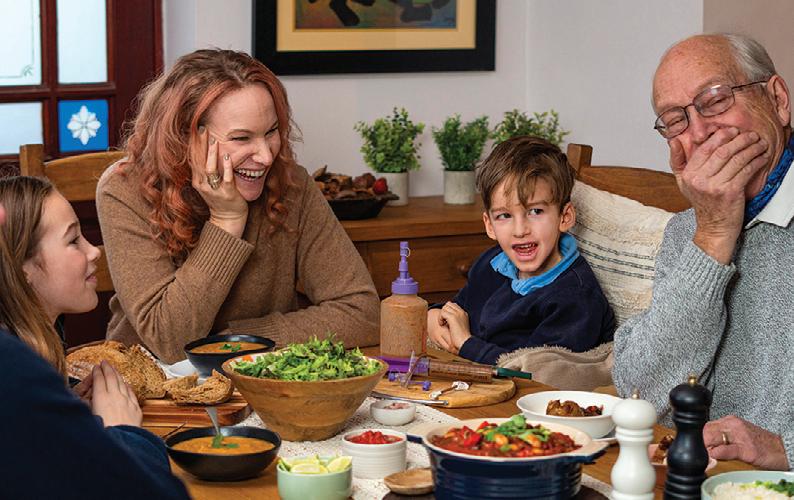
calories are made of, how they digest, and how they make you feel. Think about how you eat. Smelling, tasting, chewing, it all signals your body to start digesting. Tube-fed individuals miss out on that entirely, which means their bodies have to work harder. And if all they’re being given is sweetened shakes or oil-heavy blends, it’s no wonder they struggle to thrive.
TRIAL, ERROR, AND TRANSFORMATION
We had a lot to learn. Creating tubefriendly meals isn’t just about chucking leftovers in a blender. It takes careful attention to texture, nutrition, timing, and safety. But with help from open-minded professionals and a lot of research, we began to build blends tailored for Rune’s needs.
And the change was incredible.
The vomiting stopped. The chest infections slowed. His bowels started to work more normally. He had more energy for therapy. And for the first time in a long while, Rune felt more like himself.
Now, Rune shops with us. He picks out vegetables by smell and colour. He helps decide what goes into his blends. And incredibly, he’s even started tasting small amounts of purée by mouth, something we never imagined would be possible. He’ll always use his feeding button, but now he calls it his “powerup button.” He’s proud of it. And so are we.
FROM PERSONAL JOURNEY TO SHARED PURPOSE
Rune’s journey changed how we think about food, not just as nutrition, but as comfort, culture, and connection. We began to see how many tube-fed people, like him, are offered only one option: formula. For many, it’s essential. But it shouldn’t be the only choice.

Let’s be clear formula isn’t the enemy. For many people, it’s an absolute lifeline. It saves lives. It provides critical nutrition in a manageable, measurable, and medically supported way. This isn’t about demonising formula, it’s about recognising that one size doesn’t fit all. And for too long, that fact has been overlooked.
After one particularly rough hospital stay, we started researching alternatives, and that’s when we discovered the blended diet. In simple terms, it means blending real, cooked food so it can go through a feeding tube. It’s more common in places like the US, but at the time it was almost unheard of in the UK due to old guidelines and fears around safety. That’s changed in recent years. New evidence and updated NICE guidance now support the use of real food blends in medical care. Why? Because people do better. It's not just about calories, it’s about what those
This wasn’t just a lucky break. Study after study shows that real food can offer major benefits for tube-fed people, especially children, where most of the research has focused so far. But the logic applies to adults too. Imagine being used to eating normal food your whole life, only to be switched to synthetic-tasting formula with no smell, no flavour, no connection to the food you once loved. What does that do to your appetite? Your wellbeing? Your sense of self?
FOOD IS CONNECTION
In our home, food isn’t just fuel. It’s comfort. It’s an experience. It’s care. When Rune first started tube feeding, his feeds were done in private, away from the dinner table. That’s what his school and carers had been taught, to keep it discreet, hidden. But we didn’t want Rune to feel ashamed about how he eats. He deserves variety, flavour, and choice just like everyone else.
So we brought him into the heart of mealtimes.
Plenty of tube-fed people can still taste, smell, and even enjoy small amounts of food by mouth. So why shouldn’t they have access to real ingredients, varied flavours, and meals that reflect the same dignity as those who eat by mouth?
Together with a close family friend, we’ve started a small company Food Untethered, not just to create meals, but to rethink what it means to eat when you're tube-fed. Our aim is to support those on liquid diets to live fully, with options that nourish both body and spirit.
This all started with Rune, but it’s something so many others deserve too.

Sophia Johnston Co-founder of Food Untethered Parent carer for Rune Johnston www.fooduntethered.com contact@fooduntethered.com 07846690988




We’ve
But
Mobile Kitchens Ltd specialises in the hire or sale of temporary catering facilities and foodservice equipment.
Ideal for events or to provide temporary catering facilities during your kitchen refurbishment, our versatile units and equipment offer an efficient and economic solution to the caterers’ needs.
Production Kitchens, Preparation Kitchens, Warewashing Units, Dry Store Units, Cold Rooms and Restaurant Units are available as individual units in their own right or they can be linked together on site to form a complete complex.
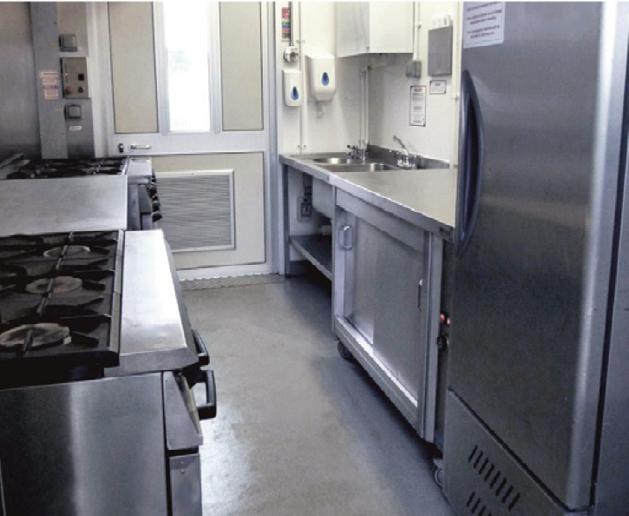
Alternatively, we can offer modular, open-plan facilities, usually for larger, longer-term hires.
We offer a free design service, and project management from concept through to delivery and installation on site, plus full technical support throughout the hire period.

By Gill Ireson, Head Of Sales at cleaning manufacturer Robert Scott
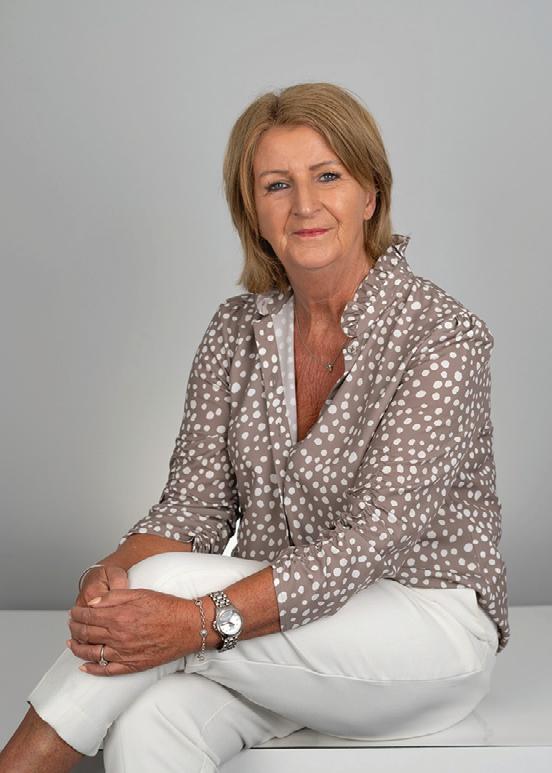
Strong odours in care homes don’t just offend the nose –they can significantly affect the mental and emotional wellbeing of residents. Gill Ireson from Robert Scott explores how businesses can win the battle with advanced hygiene technologies.
Care homes should be places of comfort, dignity, and well-being for elderly residents.
Yet unpleasant odours can quickly erode that sense of home, creating an environment that feels unwelcoming and unhygienic. Care home managers face a complex mix of challenges - ranging from incontinence and bodily fluids to poor ventilation, food waste, and certain medical treatments. All of these can contribute to persistent odour problems, especially in communal areas where residents spend most of their time.
These lingering smells compromise air quality and can deeply affect residents’ emotional and mental well-being, often causing discomfort,
distress, and feelings of neglect. Visitors and staff, too, may interpret persistent odours as a sign of poor hygiene or substandard care, potentially harming the facility’s reputation.
For cleaning professionals, maintaining high standards of hygiene in this environment is no easy task. Regular cleaning alone is often not enough. Tackling the root causes of unpleasant odours, while also preventing the spread of germs in enclosed, high-use areas, requires both consistency and innovation.
Even spaces that appear clean can still suffer from foul smells caused by airborne bacteria, hidden contaminants, or poor drainage. To truly overcome these issues, care homes may need to go beyond traditional cleaning methods and adopt more advanced, targeted solutions. Ventilation and odour control technologies
While regular cleaning routines play a vital role in hygiene, they often fall short when it comes to long-lasting odour control in care homes. Odours can build up quickly, and traditional methods rarely offer continuous protection. To effectively manage this challenge, facilities managers are increasingly turning to advanced, automated solutions.
Precision fragrance systems provide consistent and controlled scent delivery, maintaining a fresh environment throughout the lifespan of each cartridge. These systems, based on fuel cell technology used in the pharmaceutical sector, ensure a steady and precise release of fragrance, making them a reliable, low-maintenance option for odour
management.
The technology operates through a generator that delivers a measured dose of oxygen, compressing a fragrance-filled pouch. This releases scent onto a cellulose pad, which gradually disperses a pure, clean fragrance into the space - ensuring consistent freshness without manual intervention.
In addition to scent systems, care homes are also adopting advanced air and surface purification technologies that neutralise odours and pathogens at their source. These environmentally friendly systems use UV light to treat airborne contaminants, combined with ozone disinfection and photoplasma generation to break down organic matter both in the air and on surfaces.
Such innovations can reduce airborne micro-organisms by up to 70%, effectively targeting viruses like influenza, E. coli, Listeria, and Salmonella, as well as bacteria, fungi, and algae. By removing odours and contaminants directly at the source, without relying on harsh chemicals, these systems provide a powerful, eco-conscious solution for maintaining cleaner, fresher environments, especially in high-use areas like washrooms or canteens.
Maintaining a fresh, welcoming environment has a lasting impact on the well-being of both residents and visitors in care homes. By integrating advanced odour control technologies, facilities can ensure a consistently pleasant and hygienic atmosphere - supporting emotional comfort, promoting dignity, and reinforcing a sense of home.
Smell Away Ltd. has unveiled its latest innovation: a dual-action HEPA air purifier designed homes and residential care homes across the UK and Ireland. Combining advanced allergen filtration with trusted odour control, this new solution promotes cleaner, fresher indoor air – crucial for the health and comfort of vulnerable residents and staff alike
As hay fever season intensifies and indoor air quality becomes a growing concern, the Smell Away® purifier addresses both allergen exposure and persistent odours in care environments. Its High-Efficiency Particulate Air (HEPA) filter captures 99.97% of airborne particles as small as 3 microns, effectively removing pollen, dust and mould spores. For elderly residents, especially those with respiratory conditions, this protection can ease symptoms and enhance wellbeing.
Long praised for its odour-neutralising technology, Smell Away® now integrates its premium RC412 Australian activated carbon with a proprietary additive to tackle common
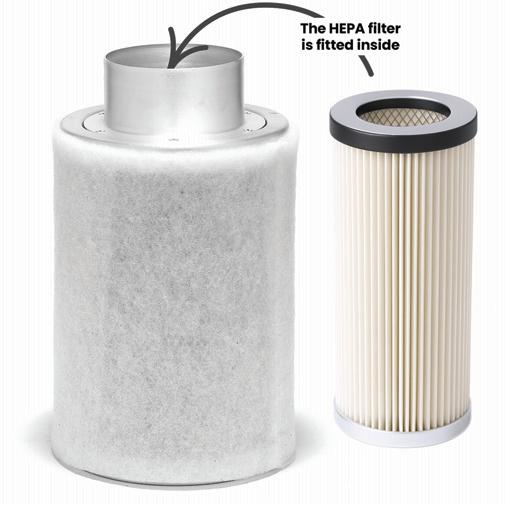
care home smells – from food and cleaning agents to incontinence and smoke – discreetly and efficiently.
Designed for ease of use, the compact, quiet unit fits seamlessly into bedrooms, treatment rooms, and communal areas. It requires no installation, operates with low energy consumption, and offers a long filter life of up to two years. Free delivery is available across the UK and Ireland, with special rates for care homes purchasing multiple units. "Air quality has a direct impact on wellbeing," says Gareth Williams of Smell Away Ltd. "This filter isn’t just about cleaner air – it’s about creating a more dignified, comfortable environment for residents and staff."
With growing attention on indoor air standards, Smell Away® provides a practical, cost-effective tool for care homes committed to delivering safer, more pleasant living spaces – one breath at a time.
For further information see the advert below or visit www.smellaway.com/carer
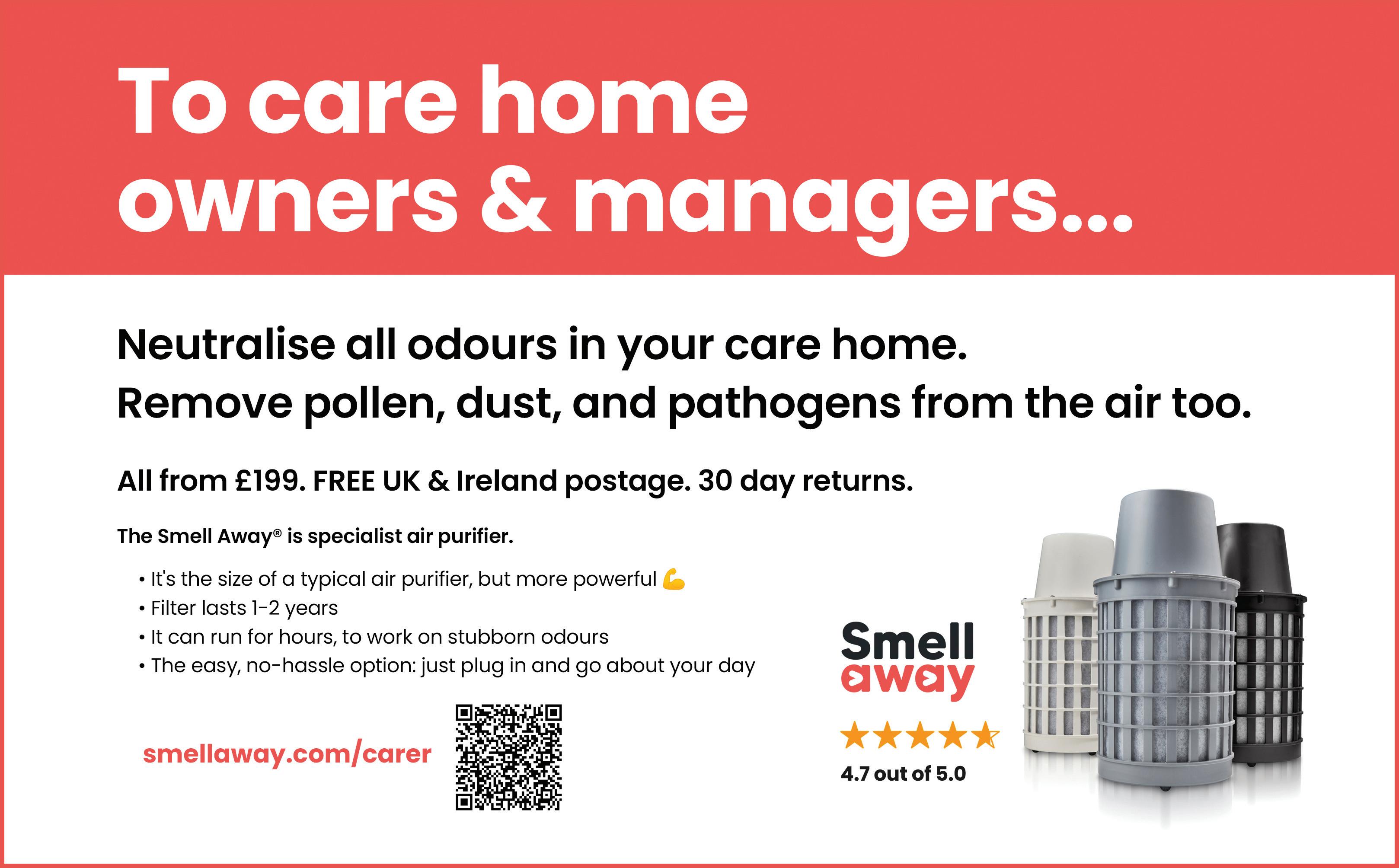
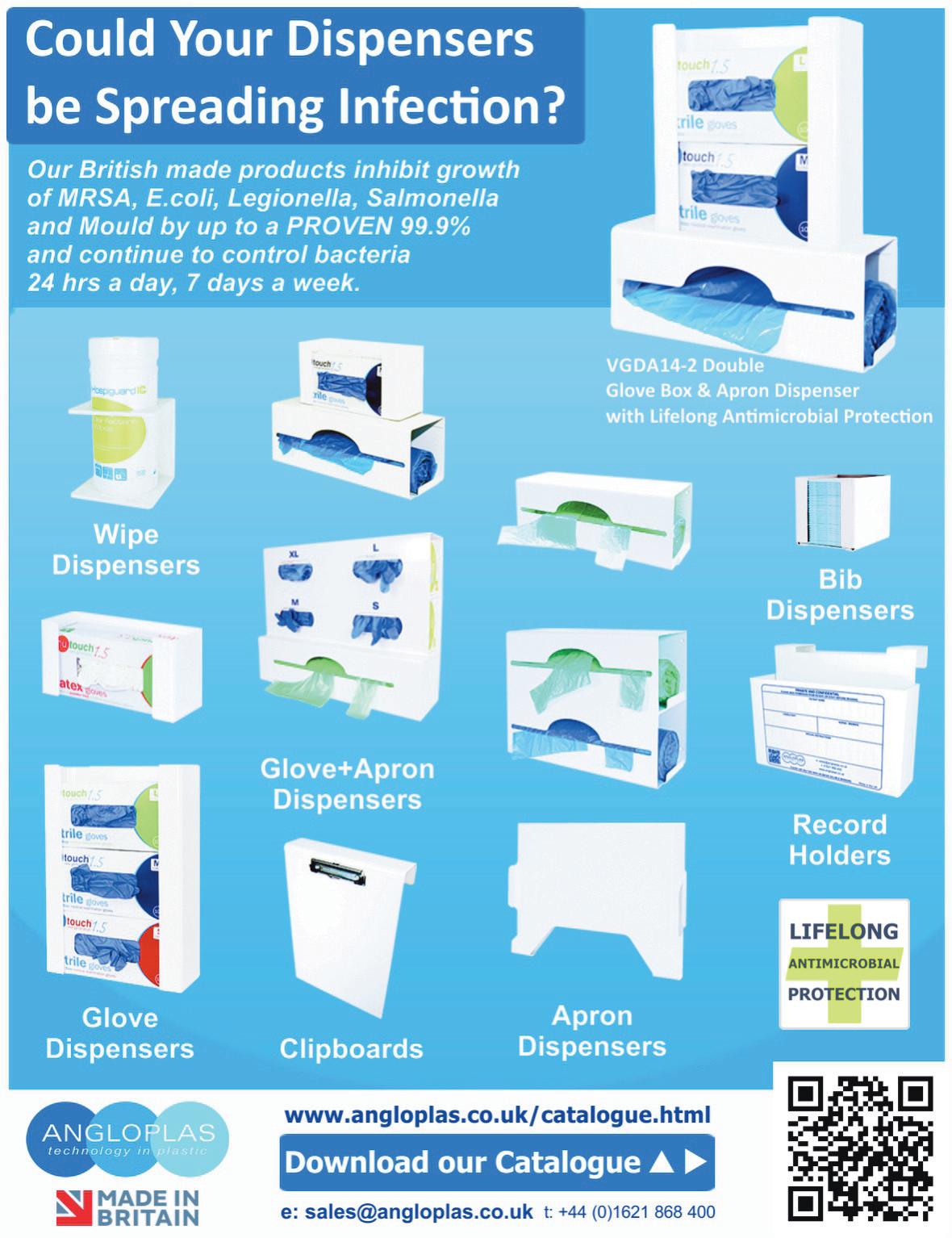
Part of Velair Group Limited, established 2012. Enviro-Save supplies costeffective and environmentally friendly washroom solutions, as well as being the Master Distributor for the Oxy-Gen Powered® air-care range in the UK and Republic of Ireland.

Oxy-Gen Powered® is the only technology that harnesses the power of pure oxygen to guarantee the delivery of fragrance into the air continuously, consistently and accurately for the entire duration of the cartridge life.
This innovative system is based on fuel cell technology that is used in the pharmaceutical industry to deliver drugs to human beings and animals.
Oxy-Gen Powered® technology is simple, reliable and cost-effective.
All Oxy-Gen Powered® fragrance cartridges contain Neutra-Lox, our proprietary odour eliminating ingredient that is extremely effective against the smell of urine, faeces, body odour, tobacco, pet malodour, kitchen odour, mould, mildew and more. Unlike other systems that only mask odours, Oxy-Gen Powered® cartridges eliminate odours and release fragrance effectively and continuously. Carbon footprint approved, and 100% recyclable cartridges; choose Oxy-Gen Powered® for cleaner air and a cleaner earth.
With no added solvents, alcohols, CFCs, VOCs or propellants, our Oxy-Gen Powered® cartridges contain 100% pure fragrance oil and are a safe choice for any facility.
See the advert on this page for further information.
Angloplas are a UK manufacturer who specialise in producing dispensers for the health and hygiene industry. Although these are designed to keep the workplace tidy and uncluttered they are, more importantly, built knowing the control of healthcare-associated infections (HCAIs) are a priority for healthcare providers, and who are employing a combination of infection prevention and control strategies, including hand hygiene, cleaning, training and the adoption of new technologies, to tackle the problem.
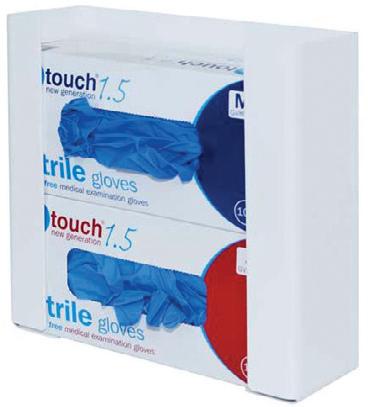
proven Antimicrobial PVC with silver ion technology and which is exclusive to Angloplas. This helps reduce the risk of cross infection by stopping the growth of bacteria and mould and works continuously for the lifetime of the product, reducing levels of bacteria such as MRSA, E Coli, Legionella, Salmonella and mould by up to 99.99%.
For non-clinical environments
As a result, a wide range of infection control products and technologies are emerging on the market, including antimicrobial technology. Angloplas’ range of dispensers are produced in the world’s first
Angloplas has recently launched its new Budget Range of products which are made to the same exacting standards as the antimicrobial protected ones but with lower price tags.
You can order Angloplas products directly from its website at www.angloplas.co.uk
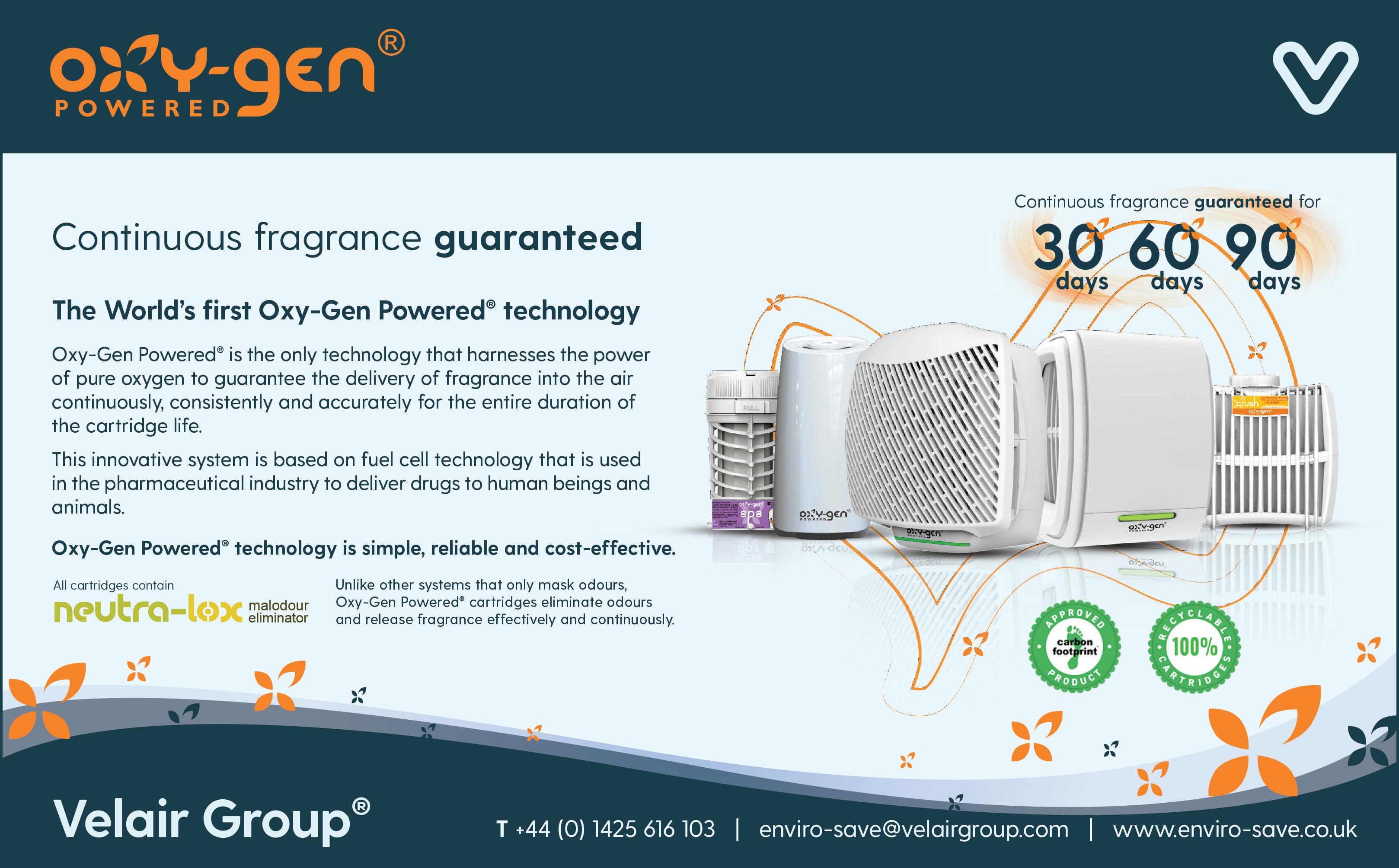
Alarm Radio Monitoring is the market leader in the design, manufacture and installation of bespoke, endto-end, wireless alarm systems and solutions for the healthcare, leisure, custodial and education industries.
We have been providing wireless alarm and nurse call systems for over 30 years. Supplying care homes and hospitals with an essential lifeline that supports the delivery of outstanding care.
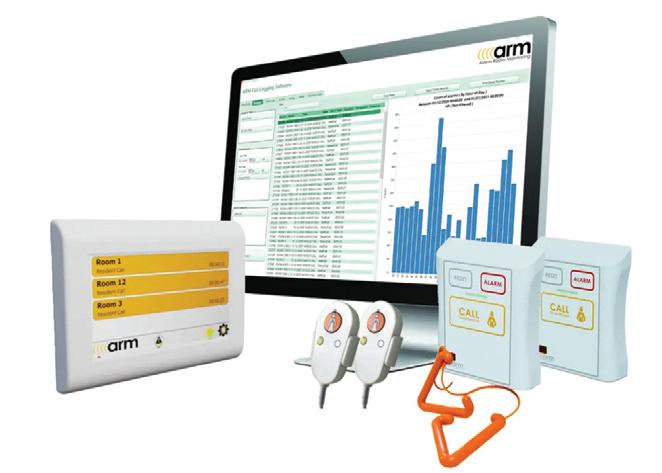
We believe in excellence which translates into:
Advanced Technology
Industry-leading wireless alarm technologies and software
Bespoke Solutions
We design systems to your needs rather than your team having to work around the system
Innovative Design
Pushing boundaries with the reliability that comes from decades in the industry
Flexible Finance Options
Ensuring organisations of any size can provide safety for their staff and clients
24 Hours a Day, 365 Days a Year Service
Your ARM service team is on hand, on the phone, on-site or return to base, whether you have a service contract or not
For further information, see the advert below or visit www.arm.uk.com
Modern nurse call monitoring systems represent a transformative advancement in residential care, bridging the gap between resident independence and professional oversight. These sophisticated platforms extend far beyond traditional emergency buttons, offering comprehensive monitoring solutions that support dignity whilst ensuring safety and prompt response to care needs.
The fundamental purpose of nurse call systems lies in empowering residents to maintain control over their care environment. When individuals can easily summon assistance, anxiety decreases and confidence increases, directly supporting psychological wellbeing and independence. This empowerment proves particularly vital for residents with mobility limitations or cognitive concerns who may otherwise feel vulnerable or isolated.
Recent Care Quality Commission reports consistently highlight response times to resident calls as key indicators of care quality. Effective monitoring
systems provide objective data demonstrating compliance with regulatory requirements whilst supporting continuous quality improvement initiatives.
Medpage’s commitment to innovation and quality is evident in their product range. Each solution is designed with the user’s safety and convenience in mind, making them a trusted choice for caregivers and healthcare providers alike.
By investing in these advanced fall prevention tools, families and facilities can create safer environments for those at risk. Medpage continues to lead the way in providing practical, reliable solutions that make a real difference.
For more information, visit Medpage’s official website or contact their team to explore these products further. Safety starts with the right tools, and Medpage delivers just that. www.easylinkuk.co.uk T: 01536 264 869
For more information, see later in this feature.
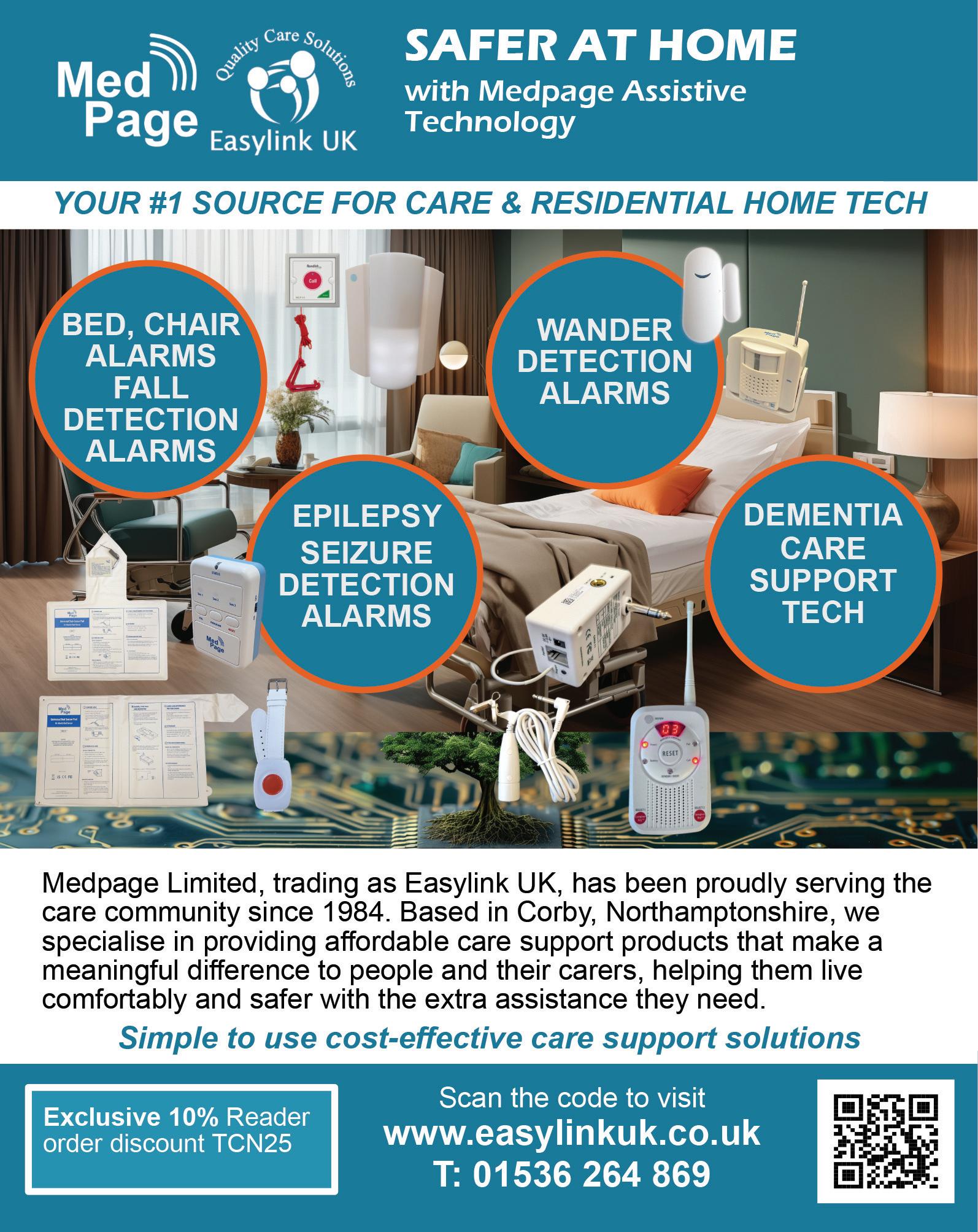
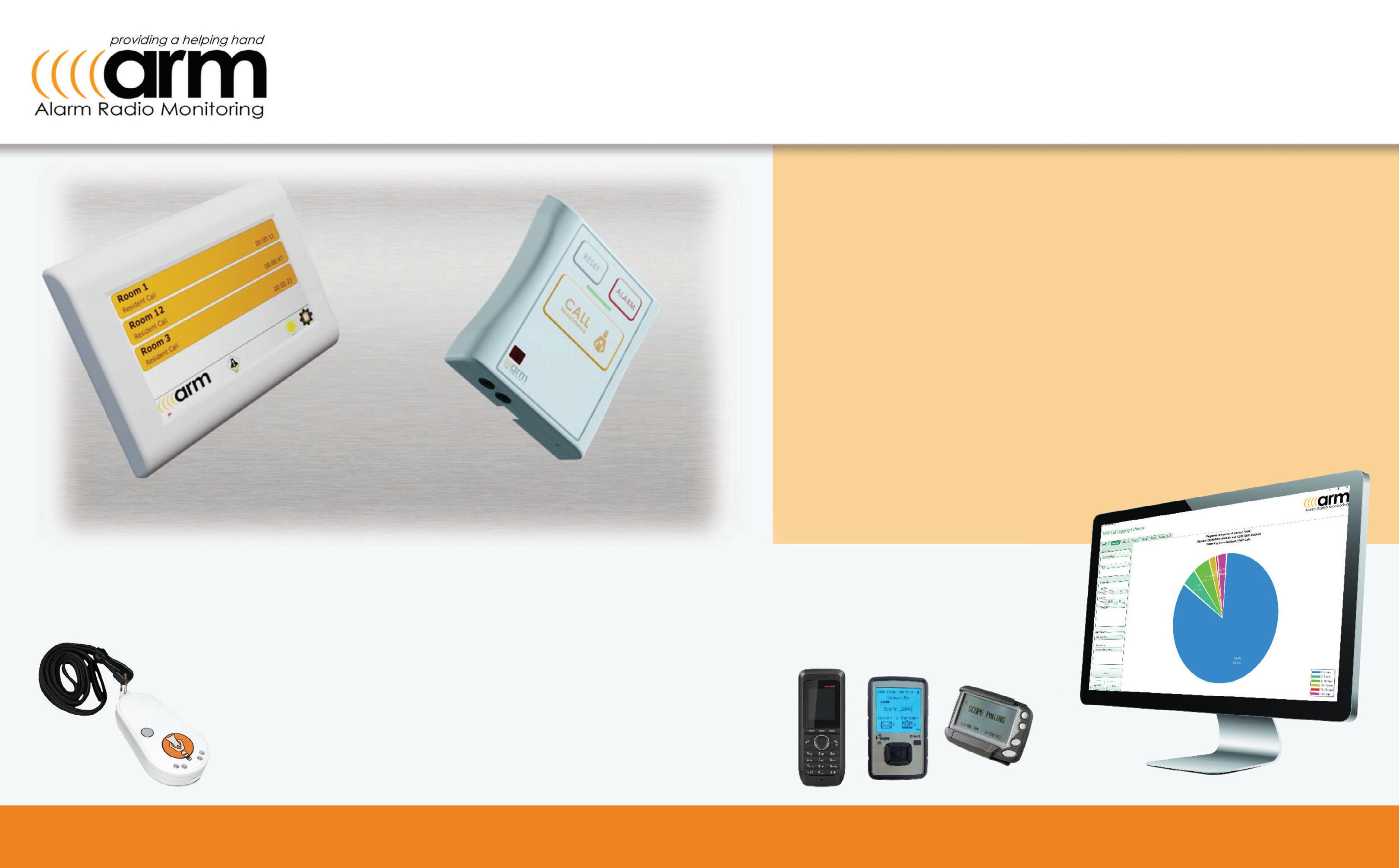
Data Analysis software provides a full audit trail of events
The all-new call logging software from ARM enhances the functionality of your care call system dramatically.
• It can help you track the quality of your service to your residents.
• It can help you demonstrate compliance with your aims and best practices, both to relatives and to authorities.
• It can help you find bottlenecks in service provision, track staffing requirements, and allow you to ensure staff are meeting expectations.
• Most importantly, it provides assurance that you know and can demonstrate what is happening in your care home.
The wireless ARM Nurse Call system has been developed over 30 years with both the client and user in mind.
It enables staff to efficiently answer calls, making the management of resources more flexible and provides the functionality you would expect of any nurse call system.
The system is quick and easy to install and works wirelessly, using radio communication between both the call points and the system infrastructure.
Call messages can be sent direct to staff to speed up response times and can also be integrated to work with smart phones & messaging.
Fall Savers®, are an experienced market leading healthcare provider of resident safety solutions for over 15 years.
FALL SAVERS ® WIRELESS MONITOR
Eliminate all cables with our new generation falls management solutions!
Upgrade your falls programme with the latest technology from Fall Savers®. The NEW Fall Savers®
Wireless eliminates the cord between the monitor and sensor pad. This results in less work for nursing staff, improved safety for patients and reduced wear and tear on sensor pads. Wireless advantages include the ability to use one monitor with two sensor pads simultaneously and support for many new wireless devices.
BENEFITS INCLUDE:
Safer for patients; less work for staff Bed and chair pads available
One monitor works with two sensor pads Integrates with most nurse call systems
A variety of options, including:
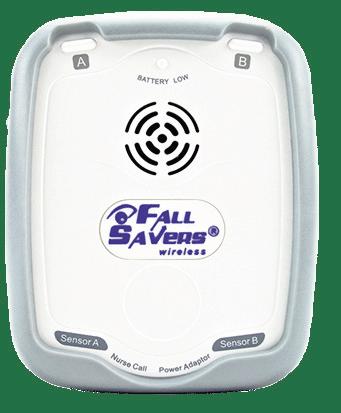
Floor sensor mat
Wireless door/window exit alerts
TREADNOUGHT
®FLOOR SENSOR PAD
The TreadNought® Floor Sensor Pad is built to last with a durable construction that far out lasts the competition. Our anti-bacterial floor sensor pad is compatible with most nurse call systems or can be used with a portable pager to sound an alert when a person steps on to the sensor pad. Caregivers typically place the sensor pad at the bedside, in a doorway or other locations to monitor persons at risk for falls or wandering. An optional anti-slip mesh reduces the potential for slippage on hard surface floors.
FEATURES INCLUDE:
Connects directly to most nurse call systems
High Quality anti-bacterial Floor Sensor Pad
Large Size Pad: Measures (L)

Blaucomm’s Nurse Call Messaging Service (NMS) is the market leading solution to remove the dependency on noisy nurse call panels and pagers, through its intelligent software, which delivers the alerts straight to the care staff who need them.
Care homes are rapidly introducing smartphones for digital care planning and eMar - now, the same devices can be used to receive the nurse call alerts they need for the residents under their care.
Furthermore, Blaucomm NMS is deeply linked into Person Centred Software MCM, so call bell data is linked straight to care plans. This unlocks a huge benefit to care homes to enhance the staff performance with how they accept and respond to residents, which ultimately promotes better response times and visibility for management to audit their performance.
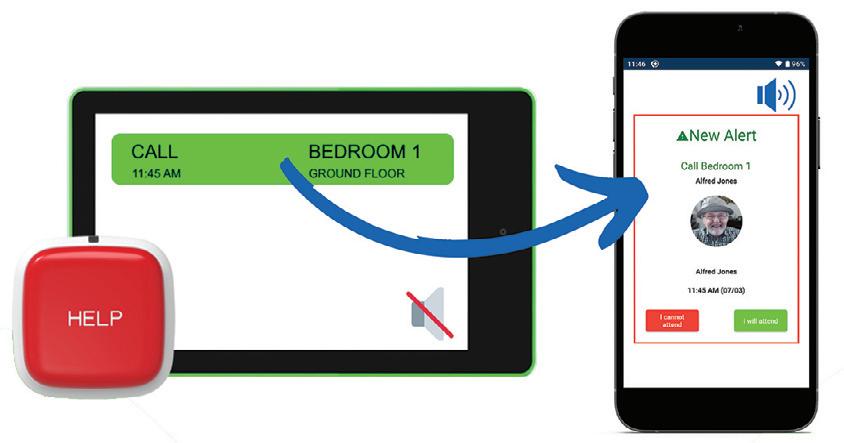
The best part is that Blaucomm NMS links into your existing nurse call system - we work with all major
brands such as Aidcall, ARM, Courtney Thorne, C-TEC, ENS, Intercall, Medicare, SAS and TeleAlarm.
Care operators are constantly recognising Blaucomm NMS for its reliability and dependability to their care operations, which is why we’ve been chosen time and time again over other solutions.
Head of IT Trudi Harrow at WCS Care had this to say about Blaucomm NMS:
“We find Blaucomm is a genuinely fantastic company with a reliable product.
"We would highly recommend this to anybody who wants to replace expensive pagers and silence those annoyingly loud nurse call screens!” To find out more about Blaucomm NMS, visit
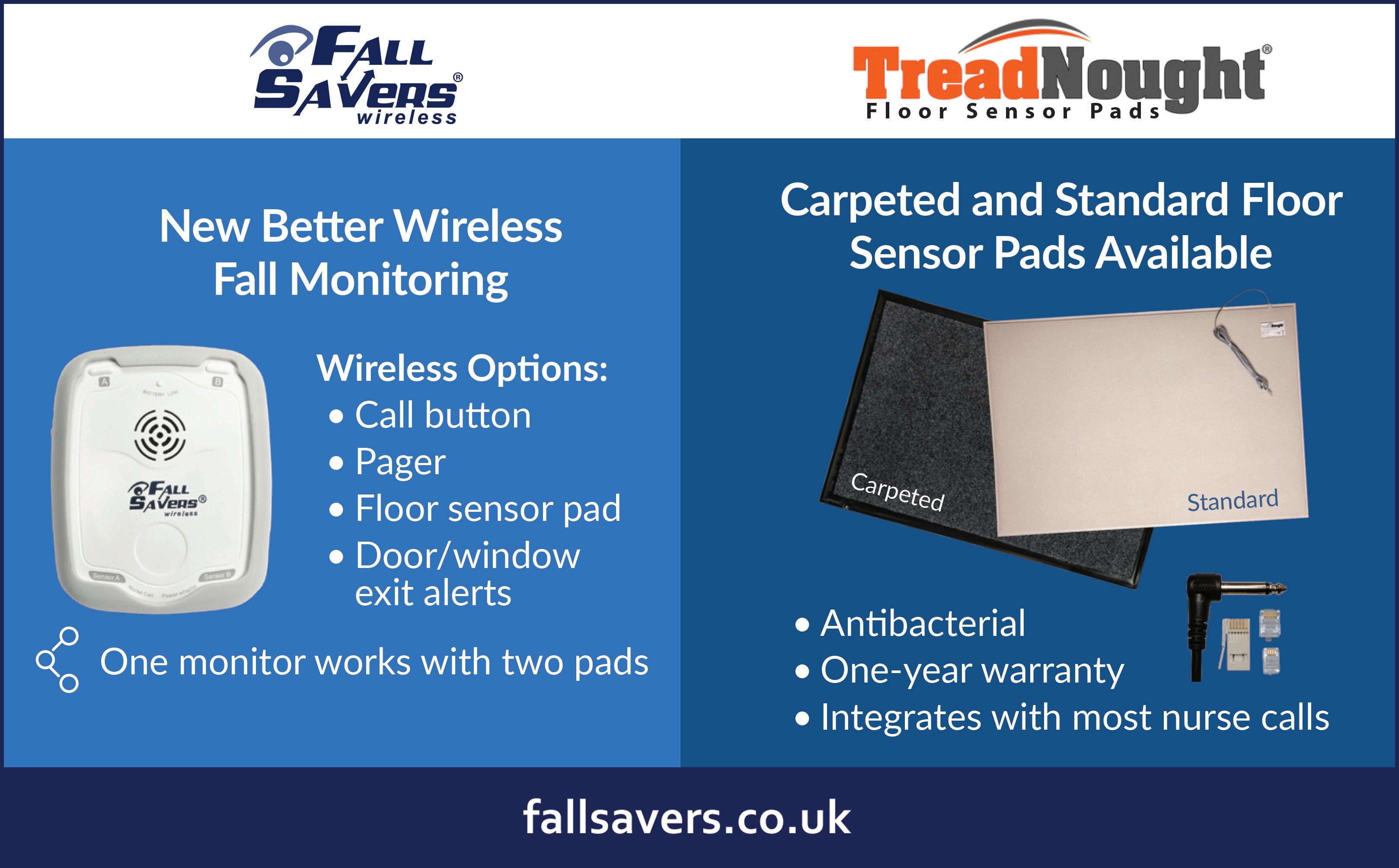
Falls are a significant concern for vulnerable individuals, especially seniors and patients at risk. Medpage, a leader in assistive technology, offers a range of cuttingedge products designed to enhance safety and provide peace of mind for caregivers and families. Here’s an in-depth look at some of their standout solutions:
MPRCG1 (2023) BED LEAVING DETECTION ALARM WITH CAREGIVER RADIO PAGER
The MPRCG1 is a comprehensive system tailored for fall prevention in domestic, commercial, and NHS care settings. This all-inclusive kit includes a bed pressure mat sensor, a BTX21-MP alarm sensor transmitter, and an MP-PAG31 radio pager. The system is designed to alert caregivers when a patient leaves their bed, reducing the risk of falls. Key features include:
Wireless Alerts: Notifications are sent to the caregiver’s pager via tone or vibration.
Customizable Alarm Delays: Options for instant, 15-minute, or 30-minute delays.
Durable Design: Antimicrobial and disinfectant-resistant materials ensure longevity. Ease of Use: Minimal installation required, making it user-friendly and portable.
HDKMB2 HOSPITAL DISCHARGE KIT FOR FALLS RISK PATIENTS
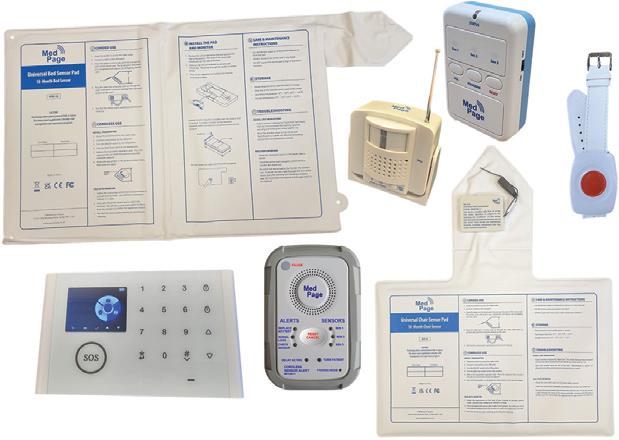
The HDKMB2 is a thoughtfully curated kit aimed at supporting patients transitioning from hospital to home care. It includes essential tools to mitigate fall risks and promote recovery. This kit is ideal for caregivers seeking a comprehensive solution to enhance patient safety during the critical post-discharge period.
CMEX-21 MULTI-PORT WIRELESS SENSOR INPUT EXPANDER FOR NURSE CALL CONNECTION
The CMEX-21 is Medpage’s latest innovation, designed to integrate seamlessly with existing nurse call systems. This multi-port expander allows for the connection of multiple wireless sensors, enhancing the
monitoring capabilities of healthcare facilities. Its versatility makes it a valuable addition to any care environment, ensuring timely responses to patient needs.
RON-WC2 WATERPROOF DISABLED PULL CORD ALARM TRANSMITTER WITH WIRELESS ALARM RECEIVER
The RON-WC2 is a robust solution for disabled individuals requiring immediate assistance. This waterproof pull cord alarm is ideal for use in bathrooms and other high-risk areas. Paired with a wireless alarm receiver, it ensures that help is just a pull away. Features include:
• Waterproof Design: Suitable for wet environments.
Wireless Connectivity: Reliable transmission to the alarm receiver.
• Ease of Installation: Simple setup for quick deployment.
WHY CHOOSE MEDPAGE?
Medpage’s commitment to innovation and quality is evident in their product range. Each solution is designed with the user’s safety and convenience in mind, making them a trusted choice for caregivers and healthcare providers alike.
By investing in these advanced fall prevention tools, families and facilities can create safer environments for those at risk. Medpage continues to lead the way in providing practical, reliable solutions that make a real difference.
For more information, visit Medpage’s official website or contact their team to explore these products further. Safety starts with the right tools, and Medpage delivers just that. www.easylinkuk.co.uk
T: 01536 264 869
Courtney Thorne, a long-standing innovator in healthcare communication systems, is setting new standards in the care home sector with its advanced wireless nurse call technology—designed to improve resident safety, enhance staff efficiency, and support a more responsive care environment.
With over 30 years of experience serving the UK healthcare market, Courtney Thorne’s systems are now trusted by thousands of care homes nationwide. Unlike traditional hardwired solutions, their wireless nurse call systems offer non-invasive installation, scalability, and smart analytics—making them ideal for both new builds and retrofit projects.
“At the heart of our technology is the belief that better communication leads to better care,” says Graham Vickrage, Managing Director at Courtney Thorne. “Our wireless systems not only reduce response times but also empower staff
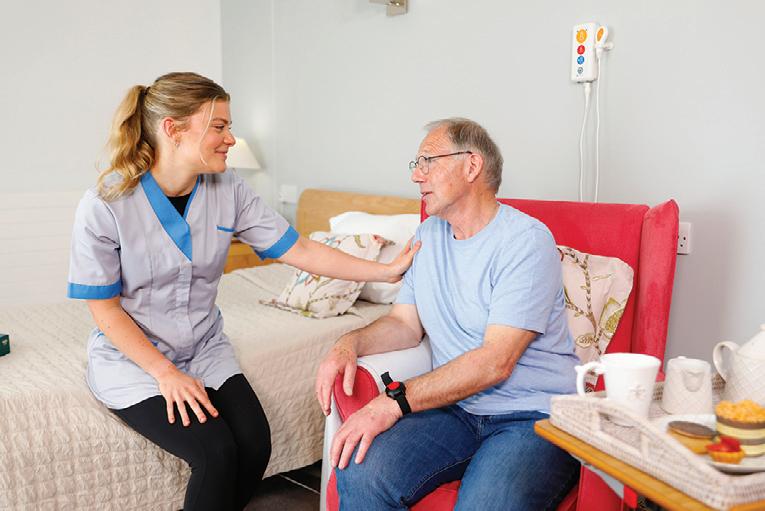
with the tools they need to deliver safe, person-centred care.”
Care providers are increasingly choosing wireless systems for their flexibility, reliability, and cost-effectiveness. With a full suite of accessories—including neck pendants, door monitors, fall detection, and bed sensors—Courtney Thorne systems can be tailored to meet the specific needs of each home and resident.
In an industry where compliance, safety, and staff pressures are always front of mind, Courtney Thorne provides more than just products—they offer ongoing support, training, and a commitment to innovation that helps care homes futureproof their operations.
For more information or to book a free demo, visit www.c-t.co.uk or contact info@c-t.co.uk.
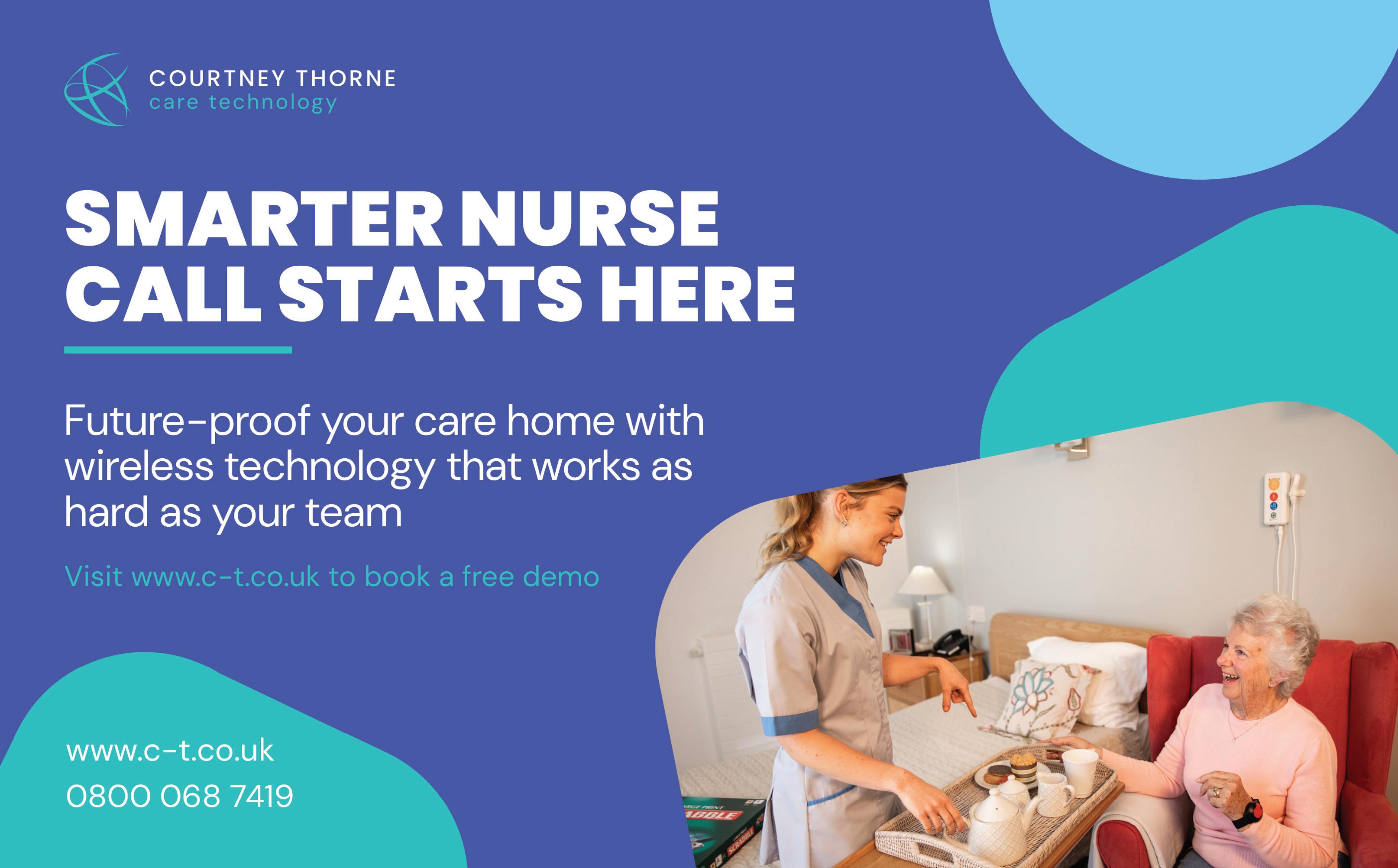
Adult social care is changing fast. Across England, providers are swapping paper and patched-together systems for complete digital records, in step with the government’s Digitising Social Care programme.
Primera Healthcare, which supports people at home in Birmingham and London, has moved early and decisively.
The team started 2025 by upgrading their older care system to Allin-one PASS, adding digital care planning, rostering and finance tools so that every part of the service now sits under a single platform.
The switch felt less like a software update and more like turning on the lights. Travel times, staff skills and visit continuity now feed automatically into the rota, so late or missed calls are spotted and fixed before they become problems.

Medication notes flow straight into electronic MAR charts, and live GPS data shows managers exactly where carers are, cutting the need for frantic phone calls on busy shifts.
Most striking of all is GP Connect. With one tap, authorised staff can see up-to-date diagnoses and prescriptions, saving time and keeping visits focused on the person rather than the paperwork.
“The transition was seamless,” says Shaelene Dewar, Quality Assurance Auditor. “The journal view gives us a live window on the whole business, and the Data Creation Team at PASS built our new
3. ENHANCED MONITORING
is
finding its
care settings, the impact it can have is huge.
Here’s a closer look at why AI is set to make waves in social care:
1. BOOSTING EFFICIENCY
AI can help handle those resource-draining tasks in seconds. Whether it’s crunching a mountain of data, summarising care notes, or suggesting next steps, it frees up your team to do what they do best.
It can also improve communication, such as helping new team members quickly access policies or answer routine questions without waiting for assistance. By handling these background tasks, AI allows organisations to redirect resources to other core priorities.
2. ENSURING PERSON-CENTRED CARE
AI can support your teams when providing persona-centred care by analysing data over time, so they can build tailored plans that align with each individual’s goals, preferences, and abilities. It can even predict future needs, flagging issues before they arise so your team can act proactively.
Care organisations often operate round-the-clock, and AI can offer real-time monitoring to support this. For example, AI can highlight subtle behavioural changes, like someone sleeping poorly or becoming more withdrawn. These insights can alert your teams to potential concerns early, which means better, faster decisions can be made to support your clients.
For organisations, this level of tracking ensures care quality stays high, without adding to the workload. It’s like having an extra layer of support that’s always on duty.
4. EMPOWERING TEAMS
AI is here to help empower your care teams, not replace them. AI tools can provide instant recommendations or resources, which could help your newer employees confidently manage unexpected situations. Similarly, AI can assist with summarising care notes or giving quick access to up-to-date best practices, helping your teams provide the high-quality care they work so hard to deliver.
5. OPTIMISING COSTS
One of the big wins of AI is its ability to do more with less. By automating tasks and making resource allocation more efficient, it
forms in record time. GP Connect is brilliant. Reliable information in seconds, and the new charts help us spot patterns we never saw before.”
Those changes have delivered quick, concrete gains. Oversight is tighter, risk is lower, and staff spend more minutes each day with the people they support.
Everything is logged, time-stamped and ready for inspection, which reassures families and pleases regulators.
As everyLIFE Technologies marks ten years of PASS, Primera’s experience shows what the next decade can look like when digital tools are placed at the heart of care.
Good care can always get better, and better starts with digital.
Ready to explore your own next step? Visit www.everylifetechnologies.com or call the everyLIFE team to see how PASS can help your service.
can help organisations manage tight budgets without compromising on care.
AI can even help reduce staff turnover by easing workload pressures, which means savings on recruitment and training costs too. Plus, because AI solutions are scalable, it can adapt to your organisation's needs.

AI in social care isn’t about replacing people with tech. It’s about giving your teams the time, insights, and tools they need to focus on the people they care for. That’s why OneAdvanced AI, the first UK hosted fully secure, private AI tool for businesses, was created. OneAdvanced AI can help care providers improve efficiency, deliver person-centred care, and empower teams, all while safeguarding your data. This marks a significant step towards a more innovative and sustainable future in social care.
Find out more at: www.oneadvanced.com/ai
See the advert on the back cover of this issue for further info.




A new report from the Digital Care Hub, Online But Unsupported, highlights the vital role care homes and other care providers play in supporting people with learning disabilities to stay safe online.
Digital access is now a routine part of life. People use the internet to keep in touch with family and friends, follow hobbies, do their shopping, and increase their independence. But alongside the many benefits come real risks—and people need the right support to manage them.
The research, commissioned by Better Security, Better Care and delivered by Cyber Champions, found that while many people with learning disabilities feel confident using the internet, fewer feel confident about keeping themselves safe.
Key challenges identified include:
• Only 31% of people knew how to spot a fake email or scam
Nearly 30% didn’t know how to change privacy settings on social media
Almost a quarter weren’t sure how to update device security

Some people had been tricked into sharing inappropriate images, not realising the risks or consequences
Others struggled to tell the difference between online and real-life friends
Carers also raised concerns about online grooming, sexting, bullying via messaging apps, and people oversharing personal information.
Care home staff, volunteers and family members are central to helping people manage these risks. But the report found that carers often don’t get the practical training or support they need.
• 89% of staff support people online at least once a month
25% had received little or no training in digital safety
• 69% said their training was annual but not tailored to real-life situations
• Around 30% said they didn’t know how to set up two-factor authentication or update device security
“We need to make online safety part of everyday conversations in care,” said Samantha Leonard, new Director of ARC England. “Staff need to be seen as the experts, but they do not need to feel confident talking about online risks, noticing red flags, and knowing where to go for trusted support.”
Anu Khurmi, CEO of Cyber Champions, added: “Cyber Champions is a notfor-profit initiative encompassing organisations from the private, voluntary and public sectors. Its goal is to make a difference to local communities and future generations by promoting best practices in digital literacy, online safety and cyber skills.”
The report calls for care providers to invest in regular, scenario-based training for staff—moving beyond tick-box approaches. It recommends using roleplay and real-life stories to help people with learning disabilities understand online safety in simple, everyday terms.
“We need to make online safety part of everyday conversations in care,” said Samantha Leonard, CoDirector of Cyber Champions. “Staff don’t need to be tech experts, but they do need to feel confident talking about online risks, noticing red flags, and knowing where to go for trusted support.”
The report also encourages care organisations to build a culture where staff can share new threats, ask questions, and learn together. By doing so, care providers can help people with learning disabilities enjoy the digital world safely and confidently.
Free resources and guidance are available at: www.digitalcarehub.co.uk/OnlineButUnsupported

In today’s regulated care environment, having clear, current, and wellcommunicated health and social care policies is essential for delivering safe, compliant services. The Care Quality Commission (CQC) now places increasing emphasis on how policies are implemented and understood—especially during registration and inspections.
Outdated or poorly communicated policies can significantly impact your CQC rating. Even if documentation is comprehensive, failure to ensure staff understand and follow procedures may lead to a “Requires Improvement” or even “Inadequate” rating under the ‘Effective’ domain. Well-maintained policies promote consistent standards across care teams and help safeguard services when incidents arise. In regulatory investigations, the first request is often to review relevant policies—making accuracy and accessibility key to reducing legal and compliance risks.

However, keeping policies up to date is challenging. Constant changes in legislation, best practice guid-
ance, and case law mean that policies can quickly become obsolete. W&P has been a trusted provider of CQC-ready care policies and procedures for over 20 years. Our expert team monitors industry developments to ensure your policies remain fully compliant.
Our Online Policy Portal simplifies policy management. With just a few clicks, providers can update content, distribute documents to staff, track confirmations, and monitor compliance via a real-time dashboard. You can even provide temporary read-only access to inspectors—demonstrating transparency and accountability instantly.
Ensure your care service meets CQC expectations with fully up-to-date, easily accessible, and well-communicated policies.
Email: info@wandptraining.co.uk
Call: 01305 767104
for details.
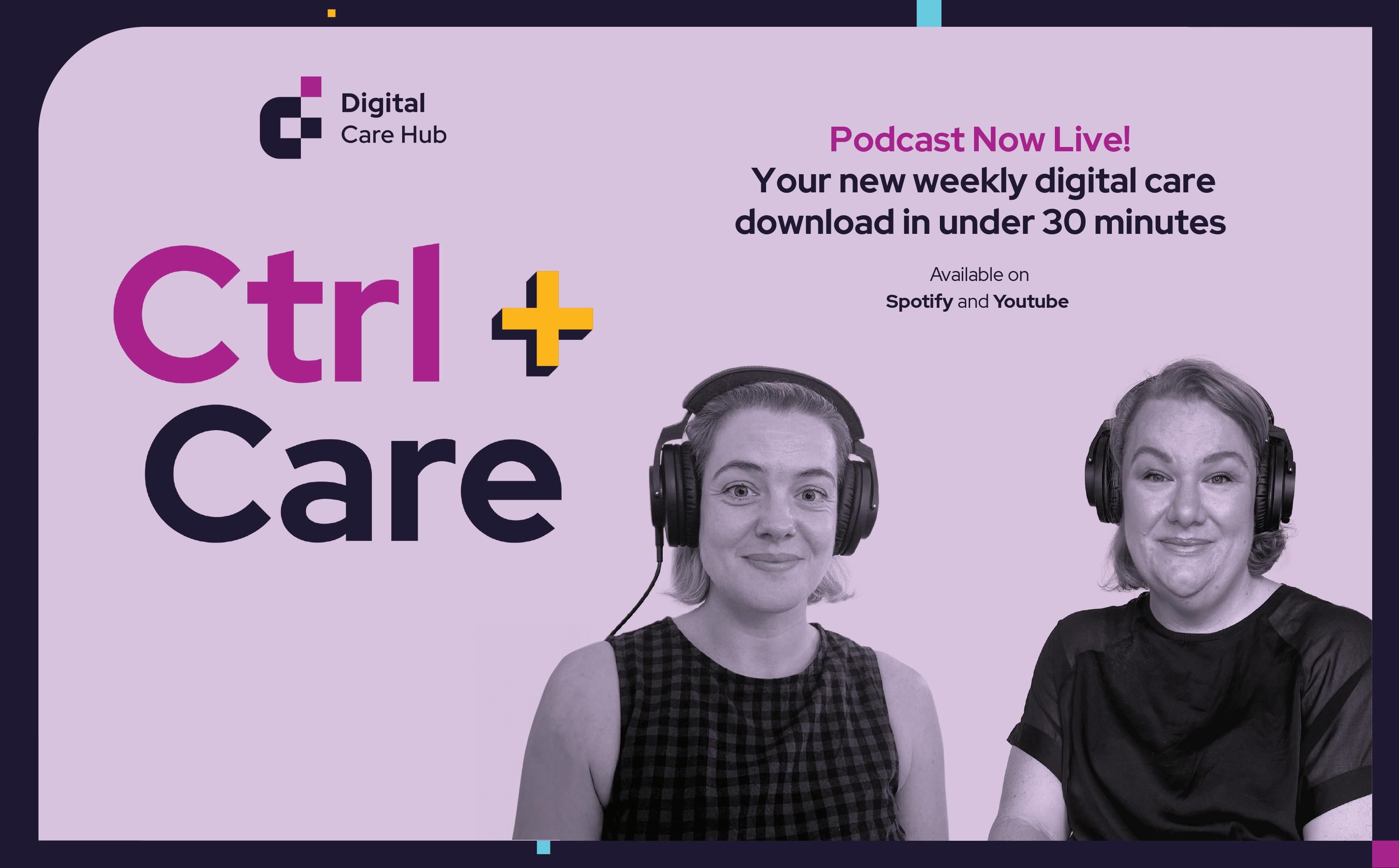
By Becky Mundie, RotaCloud (https://rotacloud.com)

How much time do you spend on admin?
How long are you locked away in your office to make the rota, only having to go back again and again for amends? How often have you realised you’re understaffed, resulting in overspending on agency staff? How frequently do payroll errors, messy audit trails, and chasing staff who missed a shift update occur?
It’s constant, the stress of it all. It’s enough to carry the care of your service users on your shoulders without being overwhelmed every day by repetitive admin and errors. You never thought you’d be spending more time amending schedules, chasing for cover, and correcting issues than your actual job.
But those inefficiencies — staff shortages, payroll errors, missed shift updates, and multiple spreadsheets you juggle — cost you money, time, staff retention, and, in some cases, compliance.
It’s easy to suggest investing in budgeting tools or certain tech to help you understand spending before it happens and to automate certain processes. Budgets are tight in care, after all. But there are simple fixes to cut your operating costs without cutting back on care if you can’t yet turn to digital systems.
Cutting costs doesn’t just mean spending less. It’s about making smarter decisions – reacting to and fixing
the cause of the problem, not the effect. And it all starts with your rota.
There are ways to take better care of your rota, which will, in turn, improve efficiency and staff morale.
One main way: putting your staff first.
First, give your team more say in when they work by allowing them to submit their availability. Try making a rolling rota with a mix of most and least preferred shifts so everyone gets a fair share of them. It means far less admin for you when the rota repeats, far fewer last-minute amends, a more accurate payroll, an easier audit trail, and no more miscommunications on when everyone’s working.
Second. Share rotas at least two weeks in advance. Doing so allows enough time to make amends and for everyone affected to be updated. Sticking to this process is more efficient, which means less admin – which means more time to focus on service users.
Third. Put in a more seamless process for holiday requests. Whether a submitted form or limiting to one means of messaging, sticking to one process means fewer lost or forgotten requests and much less paperwork. Plus, allow staff to arrange shift swaps themselves, leaving managers to simply approve or deny. Again, less time on admin means more time for service users.
All in all, your saviour is flexibility. Flexibility in rotas means less admin for managers, more efficient teams and safe staffing levels, happier staff (and higher retention rates), and, in return, happier service users – all saving costs in the process. After all, when you aren’t making last-minute changes or relying on agency staff to cover no-shows, you stick to the staffing levels and labour budgets you’ve forecast. So long, overspending, lost time, and inefficient processes.
Technology is a key part of the CQC’s improvement agenda; especially when it comes to how care services record performance during inspections.
THE PROBLEM
Many care providers want to move away from pen and paper-based audits and spreadsheets, but most software lacks the capability and flexibility to handle the complexity of the CQC requirements and ratings structure – leading to gaps in oversight and accountability.
THE SOLUTION
Drawing on our experience providing CQC improvement support, we developed an easy-to-use care audit platform designed to help care providers stay on top of their compliance obligations with the user in mind and the CQC framework at its core.
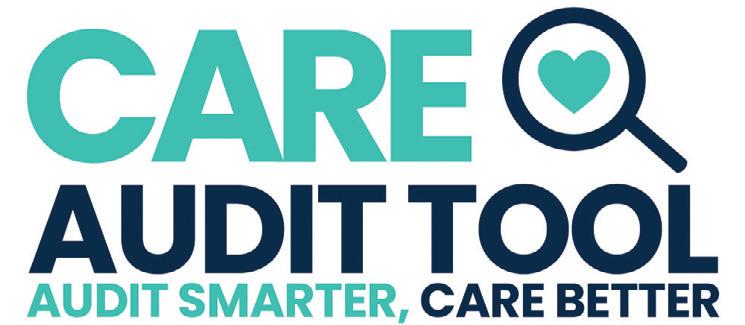
Our Enterprise Care Audit Tool enables care providers to improve oversight and respond to CQC requirements with confidence — delivering greater visibility, accountability, and control.
Now, we’ve made that same expertise and capability more accessible.
Our new cloud-based version is built on the same trusted foundation, giving providers of all sizes a faster, more flexible way to manage compliance with ease.
KEY FEATURES
• CQC-Aligned Dashboard - View audit outcomes and actions against CQC rating thresholds, with drill-down visibility for full organisational oversight.
• 100+ Ready-to-Use Audits - Covering all core operational areas including Care, Health & Safety, Estates, Catering, HR, and more.
• 2,000+ Question Library - Choose from a comprehensive library of questions, each aligned to statutory regulations and the CQC inspection framework.
• Automated Action Management - Audit outcomes that require follow-up are automatically fed into the dashboard and actions portal for clear accountability and tracking.
Reporting - Access a suite of structured reports to support internal reviews and inspection readiness.
• Engagement Surveys - Collect feedback from staff, service users, and relatives STRESS LESS. TRACK MORE. BE READY.
If you’re spending hours chasing paperwork or stressed about being prepared for any inspection any day
- Care Audit Tool can help.
Website: careaudittool.co.uk
Email: info@careaudittool.co.uk
Phone: 0333 577 0807
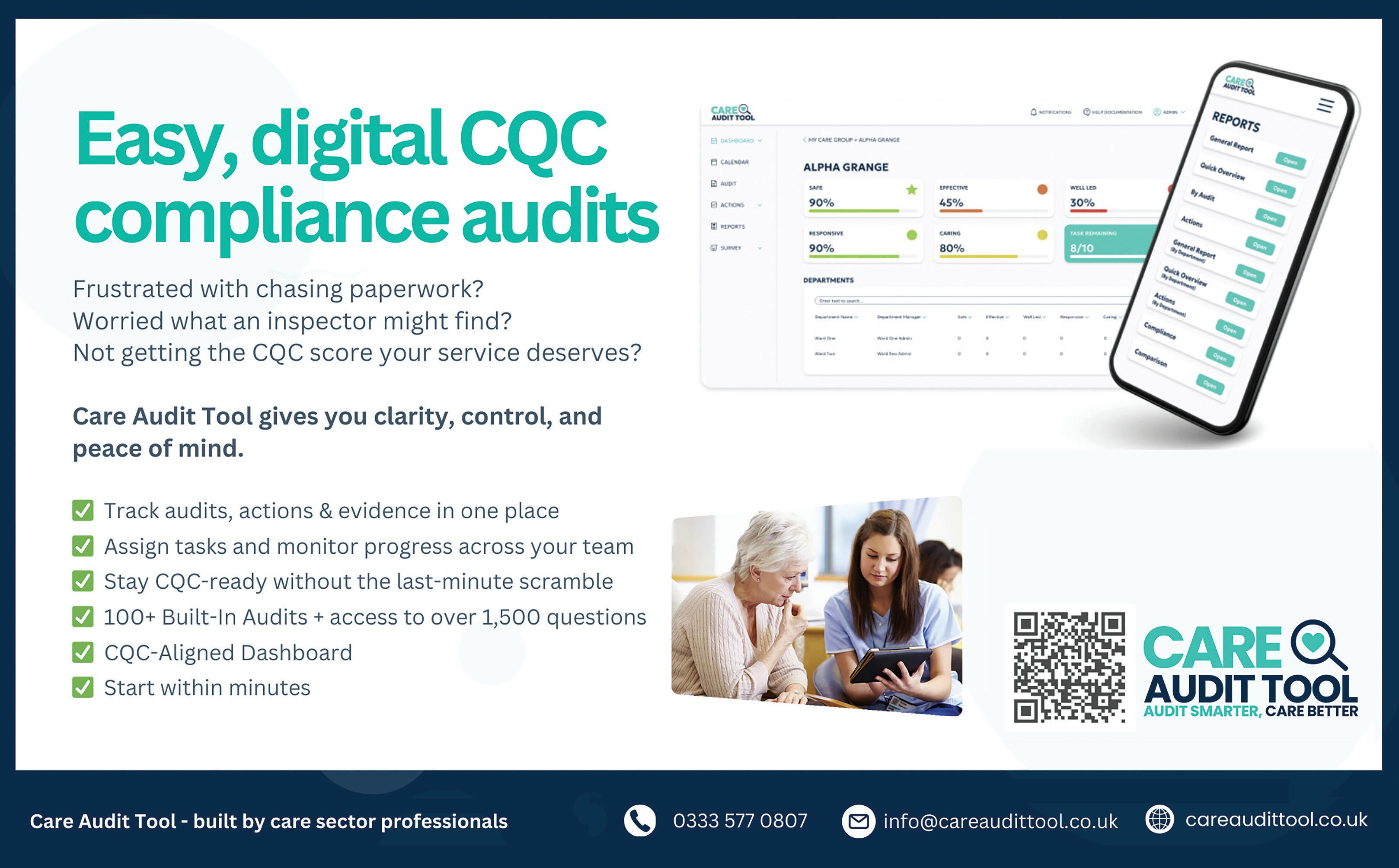
QCS x Carebeans, the UK’s leading digital provider of compliance, care management and workforce solutions for the adult social care and support sector, announces the launch of QCS Learning Centre - a powerful new addition to their growing ecosystem of connected tools built to help providers deliver safer, smarter care.
Developed in partnership with CareTutor, a trusted training expert with over 20 years’ experience in the care sector, QCS Learning Centre offers accessible, accredited and engaging video-based training designed specifically for frontline care teams.
“We’re building the future of digital care,” says Nikki Walker, CEO at QCS. “The QCS platform is about more than just ticking boxes. We’re creating an intelligent, joined-up system where compliance, care management and training all work together – backed by rich data that powers our AI integrations, all driven by realworld care and support challenges, designed to give time back to providers when they need it most.”
A CONNECTED ECOSYSTEM – SMARTER TOGETHER
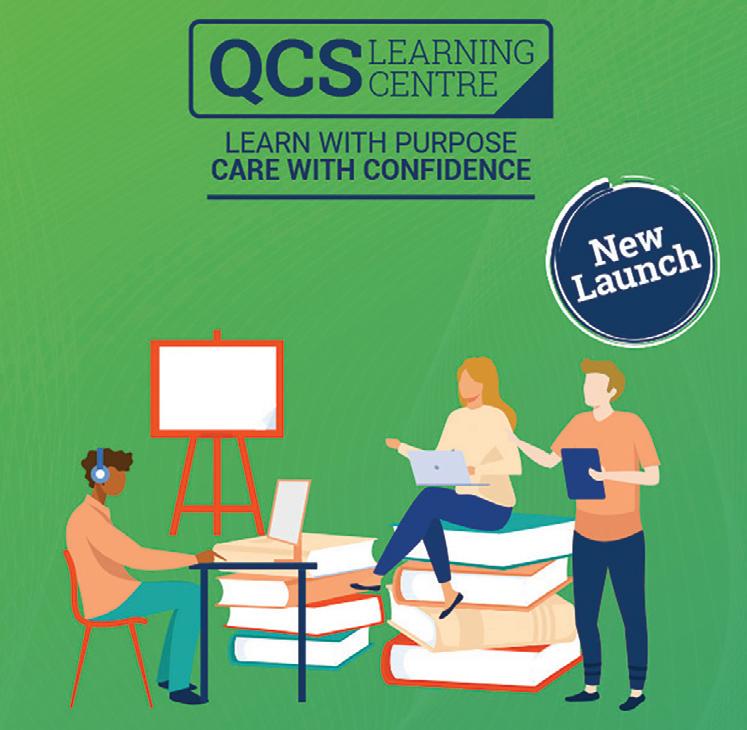
QCS Learning Centre is fully integrated into the wider QCS x Carebeans platform, which brings together care planning, rostering, audits, mock inspections, policies and training into one seamless digital experience. This connected approach means that care and support teams can respond faster, train smarter and make better decisions - all in one place.
Whether you’re running a care home, a domiciliary service or supported living provision. Every part of the system works together to reduce admin, keep you inspection-ready and support better outcomes for the
people you care and support for.
Luke Bond, Managing Director at CareTutor, adds “QCS Learning Centre is more than just another training tool. It’s the next step in supporting a stronger, more confident workforce - providing engaging and interactive, video-led courses designed and created by CareTutor specifically for the adult social care sector”.
What QCS Learning Centre Delivers:
Accredited, video-led training developed by sector experts
• Smart tracking and reporting to keep training up to date and inspection-ready Designed for real-world care and support - simple to use and quick to deploy
Supports staff development, retention and quality improvement
Future integration roadmap with the full QCS x Carebeans system planned BUILT FOR THE SECTOR. BACKED BY AI.
With AI-powered features running across QCS x Carebeans platforms – the rich data within the system enables intelligent audit tools to real-time alerts and automated policy updates - QCS Learning Centre is part of a long-term vision to reduce admin, raise care quality and give providers back the time they need to provide and evidence quality care and support.
READY TO SEE IT IN ACTION?
Explore the QCS Learning Centre today and see how it can support your service so you can be assured your team is skilled, confident, and able to provide higher-quality care and support.

https://www.qcs.co.uk/qcs-learning-centre/
By Sam Wilson, Director of Apprenticeships – Exeter
College (https://exe-coll.ac.uk)
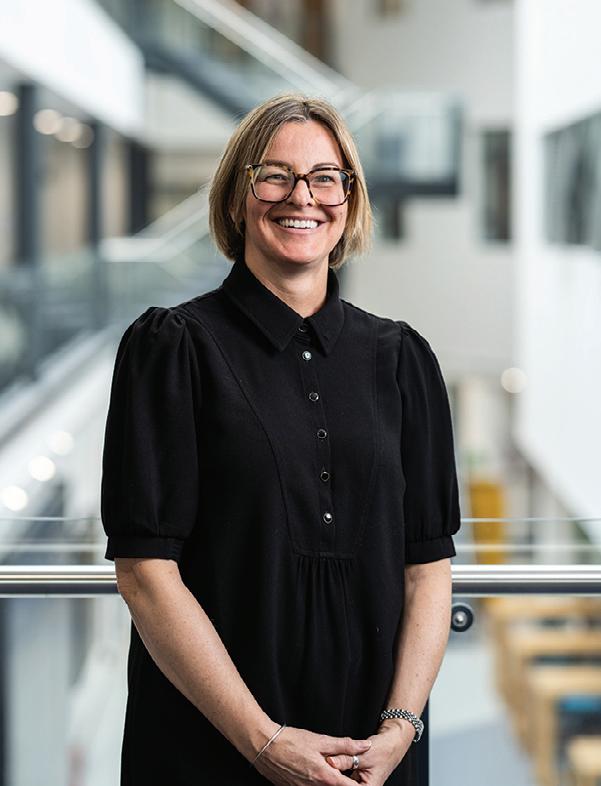
The care sector in the UK is facing a growing crisis.
With an aging population, rising demand for services, and chronic staff shortages, pressure on providers has never been greater. In 2023, Skills for Care reported around 152,000 vacancies in adult social care in England alone. These challenges not only strain the system but also compromise the quality and continuity of care. Yet, a powerful and often underutilised solution lies in education and training pathways, particularly Foundation Apprenticeships, full Apprenticeships, and vocational work-based learning such as college placements and T Levels.
These routes into the care profession not only address immediate staffing shortages but also support the long-term sustainability and professionalism of the sector. By combining academic learning with hands-on practical experience, these pathways provide young people with the skills, confidence, and motivation to build fulfilling careers in care. In turn, employers benefit from a pipeline of well-prepared, passionate, and loyal workers.
FOUNDATION APPRENTICESHIPS: ENGAGING FUTURE TALENT
EARLY
Foundation Apprenticeships (FAs), offered to school leavers (and up to the age of 19 or 24 with an EHCP), provide an invaluable early introduction to the care sector. These programmes combine classroom learning with structured work placements, giving apprentices the chance to gain practical experience in real care settings in an 8-month window. By engaging with the profession early on, students gain a real-
istic and positive understanding of what care work involves, dispelling myths and building confidence in their abilities.
This early engagement is crucial. Foundation Apprenticeships help students make informed career choices and allow employers to spot and nurture young talent as they enter the workforce. For the care sector, which traditionally struggles to attract younger workers, FAs serve as a vital bridge between education and employment. They also broaden access to the profession, particularly among school-leavers who may not have considered care as a viable or attractive career path.
COLLEGE PLACEMENTS AND T LEVELS: BUILDING REAL-WORLD EXPERIENCE
Further education colleges play a key role in preparing students for care roles. Health and Social Care students typically complete structured placements in settings such as care homes, day centres, and domiciliary services. These experiences allow learners to apply theory in practical environments and develop essential interpersonal skills.
T Levels, introduced in 2020, are two-year programmes for 16-19 year-olds that include a minimum of 315 hours of industry placement. The Health and Science T Level equips students with both technical knowledge and soft skills like empathy, patience, and communicationall vital for high-quality care.
For employers, T Level placements offer a low-risk way to assess potential recruits in real working contexts. Students who complete meaningful placements are often more confident and better prepared for full-time roles, leading to improved retention and smoother transitions into employment.
APPRENTICESHIPS: STRENGTHENING AND RETAINING THE WORKFORCE
While Foundation Apprenticeships and T Levels lay the groundwork, full Apprenticeships serve as a critical tool for both recruitment and retention in the care sector. Apprenticeships offer a blend of paid work and formal study, allowing individuals to "earn while they learn" and progress toward nationally recognised qualifications in adult care, childcare, and support work.
Crucially, apprenticeships cater to a wide age range and can be used both for new recruits and for upskilling existing staff. This makes them
incredibly versatile. For young people who may not thrive in traditional academic routes, apprenticeships offer a clear, supported pathway into meaningful employment. For care providers, investing in apprenticeships can help fill vacancies with committed, well-trained individuals while demonstrating a commitment to workforce development.
Apprenticeships also promote staff loyalty. When employees are supported to learn and develop within their role, they are more likely to stay with their employer long-term. This helps to reduce the high turnover rates that plague the care sector and improves continuity of care for service users.
In a sector crying out for skilled, compassionate workers, the potential of Foundation Apprenticeships, college placements, T Levels, and full Apprenticeships cannot be overstated. These pathways equip learners with the necessary skills and values while embedding them in the culture of care from an early stage.
By integrating education with employment, we can reshape how the care sector recruits and retains its workforce. This is not a short-term fix but a sustainable, future-focused strategy.
The care sector cannot afford to wait. By actively engaging with local education providers such as colleges, schools, and apprenticeship training organisations, care employers can build a robust pipeline of skilled, motivated individuals ready to make a difference. Whether it’s offering a placement, mentoring a student, or hiring an apprentice, every action contributes to a stronger, more sustainable workforce. Reach out to Exeter College today and start shaping the next generation of carers.
Sam has been part of the apprenticeship world for over 25 years, having gained vast experience in teaching, designing and managing the quality of apprenticeship curriculum in both independent training provider & College settings. Sam joined Exeter College over 4 years ago and played a key role in the Ofsted Outstanding grading for Apprenticeships. Apprentices@exe-coll.ac.uk https://exe-coll.ac.uk/apprenticeships/

The Home Office has announced major reform of the Immigration Rules and the changes came into effect on 22 July 2025.
New rules were laid in Parliament on the 1st July 2025, which see skills and salary thresholds rise to the previously set RQF level 6, overseas recruitment for care workers to end, and between 100 and 180 occupations no longer eligible under the skilled worker visa route.
The new Immigration Rules came into force on 22 July 2025.
There is no doubt that the UK’s social care system will suffer from the UK government tightened immigration rules.
One of the major changes which will directly affect the social care sector is the Skilled Worker entry clearance applications for care workers (SOC code 6135) and senior care workers (SOC code 6136) being closed on 22 July 2025.
The government’s position is that care providers can recruit from the regional care partnerships which have a significant pool of displaced care workers. Furthermore, the government believe that resident workers can be trained to carry out these roles. However, both of these approaches are flawed.
The displaced workers pool will eventually diminish and there is no real plan to identify where the social scare sector will recruit for the carer and senior carer roles.
Key Takeaways: What Steps Should Care Providers Take Now
Providers holding a sponsor licence should carry out a full audit of their HR processes and the five areas of compliance under the sponsor guidance. Take advantage of the Aston Brooke Solicitors UKVI mock audit service. Please contact Mr Kashif Majeed and email km@astonbrooke.co.uk to book an appointment.
In addition to the above, the following action must be undertaken as a matter of urgency:
Global assists clients throughout the U.K. who specialise in the healthcare sector to achieve their objectives of purchase, development and refinance.
We have organised over £1.8bn for clients in the past 30 years, providing clients with competitively priced funding to refinance existing debt, ease cashflow and develop businesses further. From helping clients make their first purchase through to allowing groups to grow significantly in size we assist at every stage of your business expansion.

Every proposal is individual and deserves to be treated that way, so we hope you will allow us to be of assistance to you and call us to chat through your plans and requirements, I am sure we will be able to tailor a facility to your requirements. Call us on 01242 227172 or e-mail us at enquiries@globalbusinessfinance.net

1. Sponsored Migrants Salary Audit
As there are no transitional arrangements for the new salary thresholds, employers must review the salaries of all sponsored workers. If you are assigning CoSs on or after the 22 July 2025, you must meet the new salary thresholds to ensure compliance of the rules.
2.Compliance of the Skill Level Threshold
Please ensure compliance of any roles filled which fall below RQF level 6 and that they also appear on the Temporary Shortage List and the Immigration Salary List.
Please ensure that any roles sponsored under SOC code 6135 and 6136 are for existing staff who have been employed in the business for at least three months.
There are more changes to come later this year which include:
1. Increasing the immigration skills charge
2. Increasing the English language requirements across the immigration system.
For clear and comprehensive advice on the new rules, its implementation and how it affects your business,
please contact Mr Kashif Majeed, Director at Aston Brooke Solicitors. Email: km@astonbrooke.co.uk
"23 years, operating 4 Devon Nursing homes, has been pretty tough, as anyone in social care, knows, only too well. And if it was hard already, after 2024 budget, it's just got harder. Anyway, at heart, I am just customer of Eden Alternative, and it was a stroke of luck to come across this whilst on holiday in New Zealand in 2009. It started in USA in 1994 and now runs in 22 countries.

it's a programme that is straight forward, tried and tested for 30 years and really works. Its member care organisations generally become trainers for their own teams, and run it themselves. The programme is run in person over 2-3 days or online 1 hr a wk for 7 weeks. You choose.
The fact that I am now involved with this not-forprofit organisation (in the UK area) came about when one of the 2 main UK directors died suddenly just before Covid. But it's something I have run with for 11 years to help make 'vision' a reality, not a struggle. So, being both a customer and helping the admin seems quite natural.
It is a modern philosophy of care, but moreover,
It addresses loneliness, helplessness and boredom and operates through 10 principles to underpin 7 critical domains of wellbeing. Moreover, it's effective, transformational and really works. As residents, and team members wellbeing, matter so much it's a must, in my opinion. Geoffrey Cox Southernhealthcare.co.uk eden-alternative.co.uk"
